We’re sorry, this site is currently experiencing technical difficulties. Please try again in a few moments. Exception: request blocked

Security Alert May 17, 2024
Worldwide caution, update may 10, 2024, information for u.s. citizens in the middle east.
- Travel Advisories |
- Contact Us |
- MyTravelGov |
Find U.S. Embassies & Consulates
Travel.state.gov, congressional liaison, special issuance agency, u.s. passports, international travel, intercountry adoption, international parental child abduction, records and authentications, popular links, travel advisories, mytravelgov, stay connected, legal resources, legal information, info for u.s. law enforcement, replace or certify documents.
Share this page:
Japan Travel Advisory
Travel advisory january 8, 2024, japan - level 1: exercise normal precautions.
Japan – Level 1: Exercise Normal Precautions
Reissued after periodic review without changes.
Exercise normal precautions in Japan.
Read the country information page for additional information on travel to Japan.
If you decide to travel to Japan:
- Enroll in the Smart Traveler Enrollment Program (STEP) to receive Alerts and make it easier to locate you in an emergency.
- Follow the Department of State on Facebook and Twitter .
- Follow Embassy Tokyo’s American Citizen Services section on Facebook and Twitter .
- Review the Country Security Report for Japan.
- Visit the CDC page for the latest Travel Health Information related to your travel.
- Prepare a contingency plan for emergency situations. Review the Traveler’s Checklist .
Travel Advisory Levels
Assistance for u.s. citizens, search for travel advisories, external link.
You are about to leave travel.state.gov for an external website that is not maintained by the U.S. Department of State.
Links to external websites are provided as a convenience and should not be construed as an endorsement by the U.S. Department of State of the views or products contained therein. If you wish to remain on travel.state.gov, click the "cancel" message.
You are about to visit:
- English (EN)
- Español (ES)
- Português (BR)
Is Tokyo Safe? Crime Rates & Safety Report
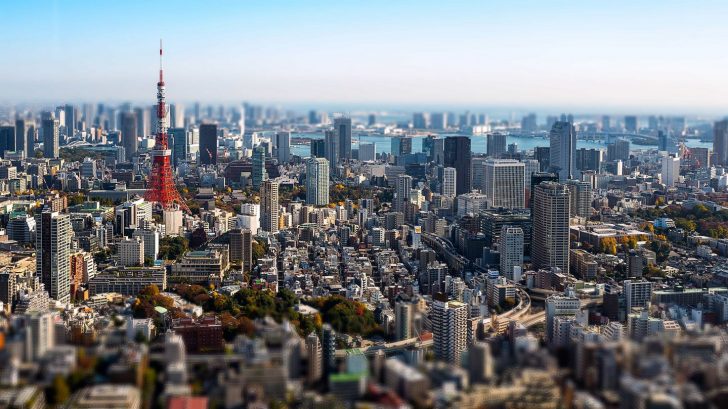
Japan : Safety by City
Tokyo is a huge city with several districts, over 13 million people and 500 years of tradition.
It is the capital city of Japan, and this enormous metropolis has something to offer for everyone, like historical landmarks, restaurants, and entertainment, as well as cultural buildings.
Because it is the metropolitan center of the country, Tokyo is a perfect destination for tourists interested in business, modern culture and shopping.
Ginza area is a heaven for shoppers with numerous department stores and boutiques accompanied by luxury hotels, restaurants, and trendy nightclubs.
On the other hand, there is the Old City area, which shows you the old Japan, with numerous museums, a zoo and a huge park.
It can be concluded that in Tokyo, tradition is mixed with a popular culture so that ancient temples are just a minute away from the best nightlife.
- Warnings & Dangers in Tokyo
OVERALL RISK: LOW
Tokyo has the same reputation as many other Japanese cities that the overall risk is very low. It is one of the very few cities having that amount of population where it is safe to walk about at night and to travel on public transport. Nevertheless, you should remain vigilant as you would in any other major city.
TRANSPORT & TAXIS RISK: MEDIUM
The public transport in Tokyo is safe, but some pickpocket risk exists. However, there are no risks in taxies in Tokyo, but you should not expect that your taxi driver speaks English. Bus drivers are usually very helpful.
PICKPOCKETS RISK: MEDIUM
Due to the huge flow of tourists, Tokyo has a medium pickpocket’s risk. Small police stations are everywhere trying to make the city as safe as possible. Crowded areas and trains, as well as areas surrounding the sights frequently visited by tourists, are the places where pickpockets usually operate. Bars popular with travelers are very attractive to thieves.
NATURAL DISASTERS RISK: HIGH
Natural disasters are so frequent in Japan that authorities constantly inform the population about the possible risks. Tokyo is prone to volcanoes, earthquakes, and tsunamis since the area is near an active volcano and the elevation is not too high. Due to all these hazards, Japan has the world's best quake and tsunami warning system.
MUGGING RISK: LOW
There are some districts, like Roppongi and Kabuki-Cho, which should be avoided especially at night due to the high level for crime, and travelers are usually the victims of drink-spiking, credit card fraud and robbery. Personal attacks are rare but bear in mind that it might happen.
TERRORISM RISK: LOW
Terrorism is a possible danger all over the world and the Japanese government does its best to prevent terrorist activity. Keep in mind that some regional tensions with North Korea may affect Japan.
SCAMS RISK: LOW
Even though there is low scam risk, you should be aware of touts and women offering a massage near the Roppongi area, since they may steal money from you. The drink spiking risk is very common and victims are often taken to an unknown location, with their credit card stolen and money withdrawn.
WOMEN TRAVELERS RISK: LOW
Tokyo’s nightlife districts such as Kabukicho and Roppongi can be very dangerous, not only for the female traveler but for everyone. However, if you do not go to these areas, you can feel completely safe while in Tokyo. It is a city where most women spend their journey trouble-free.
- So... How Safe Is Tokyo Really?
When it comes to safety, Tokyo will probably be one of the safest capital and metropolitan cities that you will ever go to, and Japan is the country that is the least dangerous in the world.
Solo female travelers are welcomed and would not encounter any problems.
It is very rare to hear that a place with so many inhabitants and an even greater number of visitors is safe for walking alone at night, but Tokyo is.
However, street crime might be rare, but it does exist, and you should remain watchful as in any other major city.
Just avoid nasty nightlife spaces that are advised to be bypassed and your visit to Tokyo will be trouble-free.
- How Does Tokyo Compare?
- Useful Information
The 90-day stays do not require a visa, but the visitors from China, Russia, CIS countries, Georgia, and the Philippines need to have it. A visa cannot be obtained in Japan, so you will need to visit its embassy or consulate before coming. It is illegal to work in Japan without the correct visa.
Japan is quite expensive and a cash country, so it is advisable to exchange your money in banks, post offices or some large hotels in order not to be given false money or notes that are no longer in use. JP Post Bank ATMs usually accept foreign cards, but be ready to have some issues related to card rejection. The best thing is to check with your bank whether your card is going to be accepted in Tokyo or not before traveling and make sufficient money for the duration of your stay. However, purchase using MasterCard is accepted anywhere.
When it comes to the weather in Japan, the severe weather is frequent which means that you should be prepared for it when visiting Tokyo. Tokyo is in a humid subtropical climate zone and has hot summers and mild winters. Tokyo can be hit by a snowstorm during winter and the typhoon season runs from June to December, but most activity takes place between July and September.
Tokyo has two large airports: Narita for international flights, 70km away from the city, and Haneda for domestic flights, which is ) officially known as Tokyo International Airport. Other airports are Ibaraki Airport, 85km north of Tokyo and Chōfu Airfield which serves only some turboprop flights to the Izu Islands south of Tokyo.
Travel Insurance
Even though you are in a perfect condition regarding your health and fitness, travel insurance that covers medical problems, theft and loss of personal items is a must.
Tokyo Weather Averages (Temperatures)
- Average High/Low Temperature
Japan - Safety by City
- Where to Next?
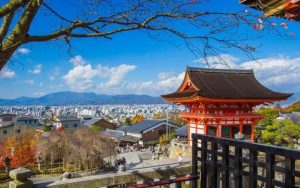
9 Reviews on Tokyo
Great but some outdated info.
The information on Tokyo’s airports is outdated. Haneda Airport now has both domestic as well as international flights.
Roppongi and Kabukicho – both have crime but both are generally safe for tourists and those that do not get involved with organized crime.
pay with suica
google suica, new phones iphone7 and newer uses suica. not every place takes credit cards and this is a low-cost substitute for credit cards you can put money on it from your bank account and you will need that along with cash but more and more places take credit cards nowadays just don’t count on 100% credit cards
Awesome city!
Tokyo is extremely safe and quite busy. As long as you stay aware of your surroundings and don’t be disrespectful or rude you will be fine. Most people will help you if you ask politely!
I left my heart in Japan ♥️
A visit to Tokyo begins of a life long love of Japan. I went as a kid and when I finally got to return 40 years later I was stunned to see how much it had shaped my life. My husband fell in love the day we arrived. From the gracious people to the egg salad sandwiches at 7 Eleven, Japan should be at the top of your bucket list.
I went to Tokyo in the ‘90s for the first time and had to go back again, and again, and again. When I saw someone else had mentioned the egg salad sandwiches, I had to comment. I normally hate those but the ones in Japan are out of this world good and so cheap! Every time I go to Tokyo, I have to have at least one a day!
Useful Info
This info is very useful, you should definitely use it to your advantage. I’m planning a trip to Tokyo (again) it’s been 22 years, but let’s see how it is…
Tokyo is a combo of New York, Toronto, and Japan. In love with the city’s lights at night. Try eating sushi downtown. The Best!!!!
It’s basically if NYC was safe and futuristic.
NY safe is safe tho, but yeah not as safe as Tokyo.
NYC safe? Used to be …. now it is a war zone 🙁
Share Your Experience Cancel reply
Your Review
Title of your review
Article Contents
- Tokyo : Safety by City
- Overall Risk
- Transport & Taxis Risk
- Pickpockets Risk
- Natural Disasters Risk
- Mugging Risk
- Terrorism Risk
- Women Travelers Risk
- Weather Averages (Temperatures)
- User Reviews
- Share Your Experience
Popular Destinations

Safety Index
Recent reviews & comments.
- Anonymous on Florida
- Samuel Lee on San Bernardino
- Cindy Kim on San Bernardino
- Angel Cruz on San Bernardino
- Simon Ross on 10 Safest Cities in Argentina
Popular US States
- Pennsylvania
- Things to Do
- Food & Drink
- Shopping & Style
- Coca-Cola Foodmarks
- Restaurants & Cafes
- Music & Nightlife
- Neighborhoods
- Los Angeles

Tokyo ranked one of the top ten safest cities in the world for travel in 2023
Female travellers rated Tokyo at No 1 in terms of safety in this global survey

Expats may have a few gripes about living here, but one thing indisputable about Tokyo is that it's incredibly safe. The city has consistently ranked among the top ten cities in numerous surveys, most recently in one by Berkshire Hathaway Travel Protection (BHTP) . Last month, the American insurance company released a list of cities around the world that are considered to be the safest places to visit in 2023. The ranking included 29 cities in total, selected from readily available lists of the world’s most popular destinations from companies like Expedia and American Express.
Survey respondents were then asked to rate the cities on the list that they had visited based on their personal experiences. Finally, BHTP factored in ratings from recent surveys, including the biennial safe-cities index from The Economist.
Here are the top 15: 1. Reykjavik 2. Copenhagen 3. Montreal 4. Amsterdam 5. Seoul 6. Singapore 7. Tokyo 8. Berlin 9. London 10. Sydney 11. Barcelona 12. Honolulu 13. Rome 14. Dubai 15. Paris
BHTP noted that the perceptions survey respondents had of each city varied greatly depending on their age, gender and income. According to the firm, female travellers rated Tokyo at No 1 in terms of safety. Tokyo's overall position at No 7 may come as a surprise to some, seeing as it was among the top three in the same survey last year. Now that the government has reopened borders to independent tourists and resumed visa-free travel , however, Tokyo has a chance to redeem itself for next year’s survey.
Want to know what Japan has to offer beyond its famously low crime rates? Here are 15 more reasons that you should visit Tokyo in 2023.
More from Time Out Tokyo
Cherry blossom season has already begun in Atami, an hour from Tokyo
Mask-wearing to be optional on Japanese airlines from this May
The flower festival at Huis Ten Bosch in Nagasaki will have 1 million tulips
The Serpenti snake at Bulgari Ginza is an interactive teamLab art you can control
Chocolate dishes are trending in Tokyo for Valentine's Day 2023
Want to be the first to know what’s cool in Tokyo? Sign up to our newsletter for the latest updates from Tokyo and Japan.
- Emma Steen Staff Writer, Time Out Tokyo
Share the story
Discover Time Out original video
- Terms of use
- Work for Time Out
- Time Out Group
- Advertising
- Modern slavery statement
- Manage cookies
Time Out Tokyo
- Magazine subscription
- Digital edition
- Buy the guide to Tokyo
Time Out products
- Time Out Worldwide
Japan Safety 2024: Is Japan Safe to Visit?
To a firstcomer, Japan may seem like a place from another planet, and unsurprisingly so—they have square watermelons and blue traffic lights.
Japan is also pretty vast—over 3,000 kilometers of land that’s full of contrasts. Up north, you can find floating ice in the seas off Hokkaido. On the south, lush jungles span the islands of Okinawa. In between, tourists flock to neon-bright megacities like Tokyo and Osaka.
Now, when a place is so vast and diverse, it’s totally normal to wonder: is Japan safe to visit? Can I easily navigate my adventures?
Japan is one of the safest places globally . Keep an eye out for possible earthquakes, hurricanes, and the occasional theft—and you’re good to go.
Here are our official and street-smart tips on how to stay safe during your trip to Japan.
Is Japan Safe?

Yes, Japan is safe. According to the 2023 Global Peace Index , Japan is the 9th safest country globally.
If we focus on specific cities, Tokyo, Japan’s capital, was rated the 5th safest city in the world by the Economist —beating London , Barcelona , Amsterdam , and New York ! Osaka, Japan’s food capital, isn’t far behind, claiming the 17th spot for safety, coming before cities such as Los Angeles, Paris , Milan, Rome, and Abu Dhabi.
Here’s our take on safety in Japan:
- Travel warning: International travel advisories rate Japan as a Level-One safety destination—meaning you only need to practice “Normal Precautions”
- Crime rate: Very low, 22.88
- Main crime: Robberies
- Walking alone during the day: Safe
- Walking alone at night: Safe
- High crime areas: Kabukicho, Roppongi, Shibuya, and Ikebukuro (Tokyo), Nakasu (Fukuoka), Susukino (Sapporo), Kamagasaki and Shinsekai (Osaka)
- Police presence: Kobans (smallest organizational police office units)
- Public transportation: Safe, but very crowded during rush hours
A Comprehensive Look at Japan Crime Rates
Japan has a remarkably low crime rating , only 22.88.
In 2020, Japan recorded a minimal homicide rate of 0.2 per 100,000 people — a stark contrast to the United States, which reported 6.4 homicides per 100,000 people the same year.
The most common crimes in Japan are property crimes , with 1.2 incidents per 100,000 people . To put things in perspective, this figure is practically non-existent when compared to rates in France (43.8), Germany (43.2), and the United States (81.4).
The level of trust and safety in Japan is evident in everyday actions— BBC shares that locals have a habit of reserving tables in cafes by leaving their phones on them unsupervised, or leaving laptops open when taking a restroom break. Even if you happen to drop your wallet, chances are that it will be waiting for you at a koban (police box), with your money and cards untouched.
When it comes to serious assaults, the United Nations Office on Drugs and Crime (UNODC) shares that in 2019, Japan had 15 assaults per 100,000 people. Again, this is much less than figures per 100,000 people in other countries, like France (460), Germany (156), and the United States (278).
Areas to Avoid
The main areas that you should be cautious of when visiting Japan are the entertainment and nightlife districts. Here, organized crime prevails, and petty crimes like purse snatching may also happen.
In Tokyo, be especially wary of your surroundings in the entertainment areas of Kabukicho, Roppongi, Shibuya, and Ikebukuro. The same goes for the Nakasu district in Fukuoka, and Susukino district in Sapporo, the second-largest red-light district after Kabukicho.
In Osaka, the area of Kamagasaki is flagged as requiring extra caution due to the large population of homeless individuals and day laborers in the area. Additionally, Osaka’s Shinsekai neighborhood, which features the closed Luna Park repurposed as a dining hub with charming restaurants and souvenir shops, is noted for potential pickpocketing risks.
The Yakuza Criminal Group
If you’re worried about the Yakuza endangering your safety in Japan, don’t be. The Yakuza follows a strict internal code of honor, taking pride in their “chivalry” (ninkyou), which keeps them from upsetting public order. Plus, although yakuza membership is not currently illegal in Japan , there are laws, such as the Anti-Boryokudan law, designed to curtail many of their activities and limit their influence.
A unique story from a foreigner who lived in Japan for 30 years sheds light on an unexpected encounter with a Yakuza godfather. Engaging in charity work for the homeless, the foreigner met a mid-60s man who turned out to be an Oyabun, a godfather in the Yakuza. When asked about his involvement in charity work, he shared that it was a way to “pay for his sins.”
Both seemed to enjoy each other’s company during charity work and contrary to popular belief, the godfather seemed very approachable. The Yakuza godfather even told the foreigner that he should mention his name if he ever encountered any problems or needed any kind of service. However, the foreigner wisely decided not to get involved, recognizing the potential complications that could arise from accepting a favor from such individuals— the key point we wanted to emphasize from this story.
So, as tourists, you are unlikely to stumble upon a Yakuza, and even less likely to get affected by their dealings. Still, keep any fascination to yourself, practice normal precautions, and be respectful towards the locals, this group, and the overall Japanese culture.
Police Presence in Japan
One of the key reasons why Japan is considered one of the safest places on Earth is the widespread presence of kobans —small police office units strategically located in city centers and residential areas.
The koban system has been successfully utilized in Japan for over a century. There are currently around 6,600 kobans operating across the country. Each koban is staffed 24/7 by one or two police officers, and there’s typically an officer patrolling the area on a bicycle.
The effectiveness of the koban system is recognized worldwide. São Paulo’s policing system in Brazil , for instance, is modeled after the Japanese koban system, with the officers being trained by the Japanese National Police Agency experts. The results were quickly evident, as there was a significant drop in crime!
So if you ever feel uneasy or need directions, transportation schedules, or emergency assistance, the police officers at kobans are there to help you!
Public Transportation Safety in Japan
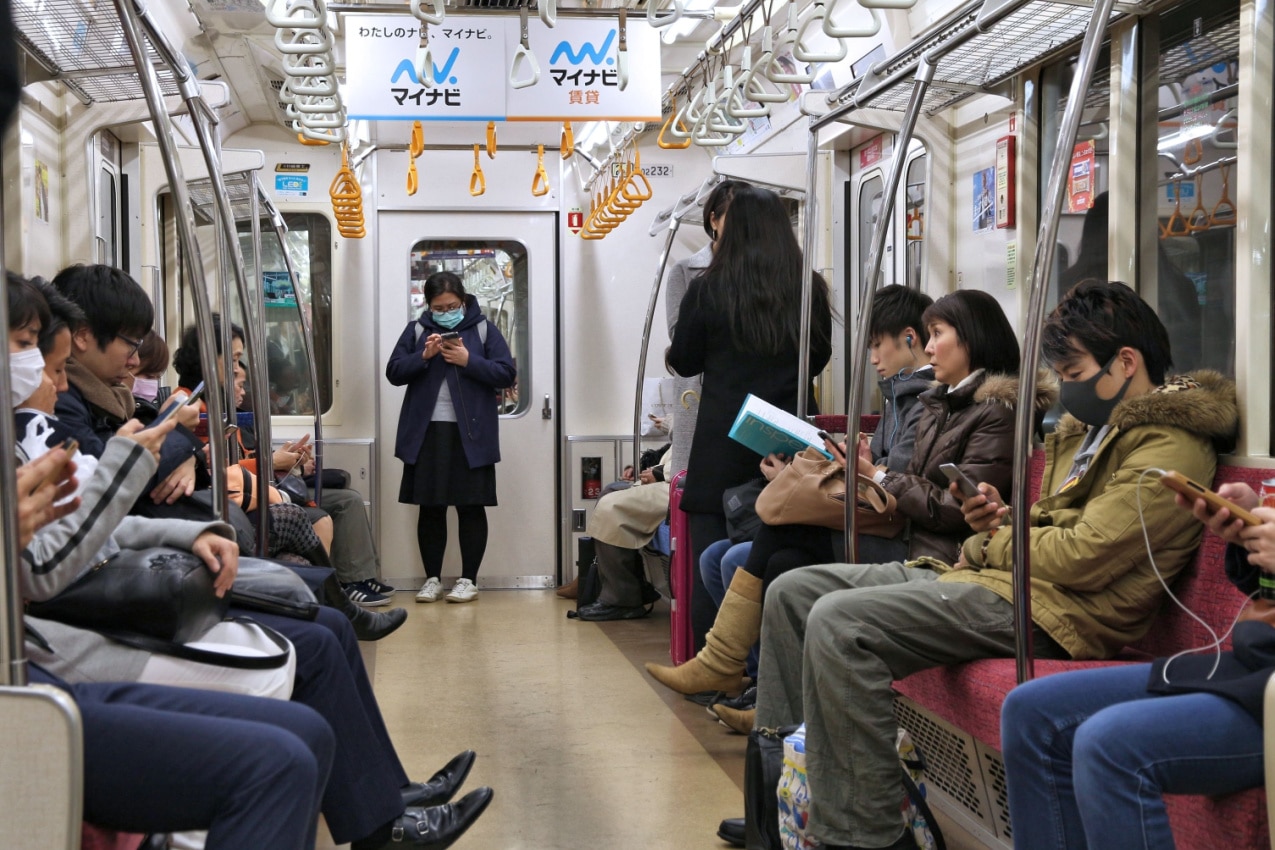
Japan is renowned for its safe and fast transportation system. Trains are the preferred and most convenient mode of travel. They’re very punctual, with trains in Tokyo arriving every few minutes. Subways, a cost-effective alternative, are also safe and punctual, running underground and thus less affected by weather conditions.
Trains are really full during rush hours, so avoid traveling at that time. The crowds can get overwhelming, and station workers may need to push people into trains. This not only makes for an uncomfortable journey but also creates opportunities for pickpockets.
Taxis are widespread but charge higher prices. Still, they are a safe and convenient option at night when public transport is limited. Recognizing whether a taxi is available is easy, though a bit counterintuitive—a red light on the roof indicates a vacant taxi, while green signals an occupied taxi. You can also reserve a cab using ride-sharing services such as JapanTaxi , DiDi , and Uber .
Medical Care Quality in Japan
Japan has more than 8,000 hospitals , including private and public hospitals, as well as clinics. The country is known for its excellent healthcare facilities equipped with advanced technology.
While it’s not a legal requirement to purchase travel insurance for a trip to Japan, we highly advise you to consider it so that you’ll be fully covered in case you need medical assistance.
Here are some travel insurance options to consider:
- Cigna Global Insurance Plan
- GeoBlue International Travel Insurance
- VisitorsCoverage
- Insured Nomads
And if you are ever in need of a doctor’s visit, here are some hospitals you can visit:
- St. Luke’s International Hospital , Tokyo
- The University of Tokyo Hospital , Tokyo
- Juntendo University Hospital , Tokyo
- Japanese Red Cross Medical Center , Tokyo
- Kyoto University Hospital , Kyoto
- Osaka University Hospital , Osaka
- Kameda Medical Center , Kamogawa
- Kurashiki Central Hospital , Kurashiki
- Kyushu University Hospital , Fukuoka
- Toranomon Hospital Kajigaya , Kawasaki
- Nagoya University Hospital , Nagoya
- Hokkaido University Hospital , Hokkaido
- Okayama University Hospital , Okayama
- Chiba University Hospital , Chiba
In case of emergencies, you can call for an ambulance in Japan by dialing 119 . Ambulances won’t charge you for transportation to hospitals.
Is It Safe to Travel Solo in Japan?
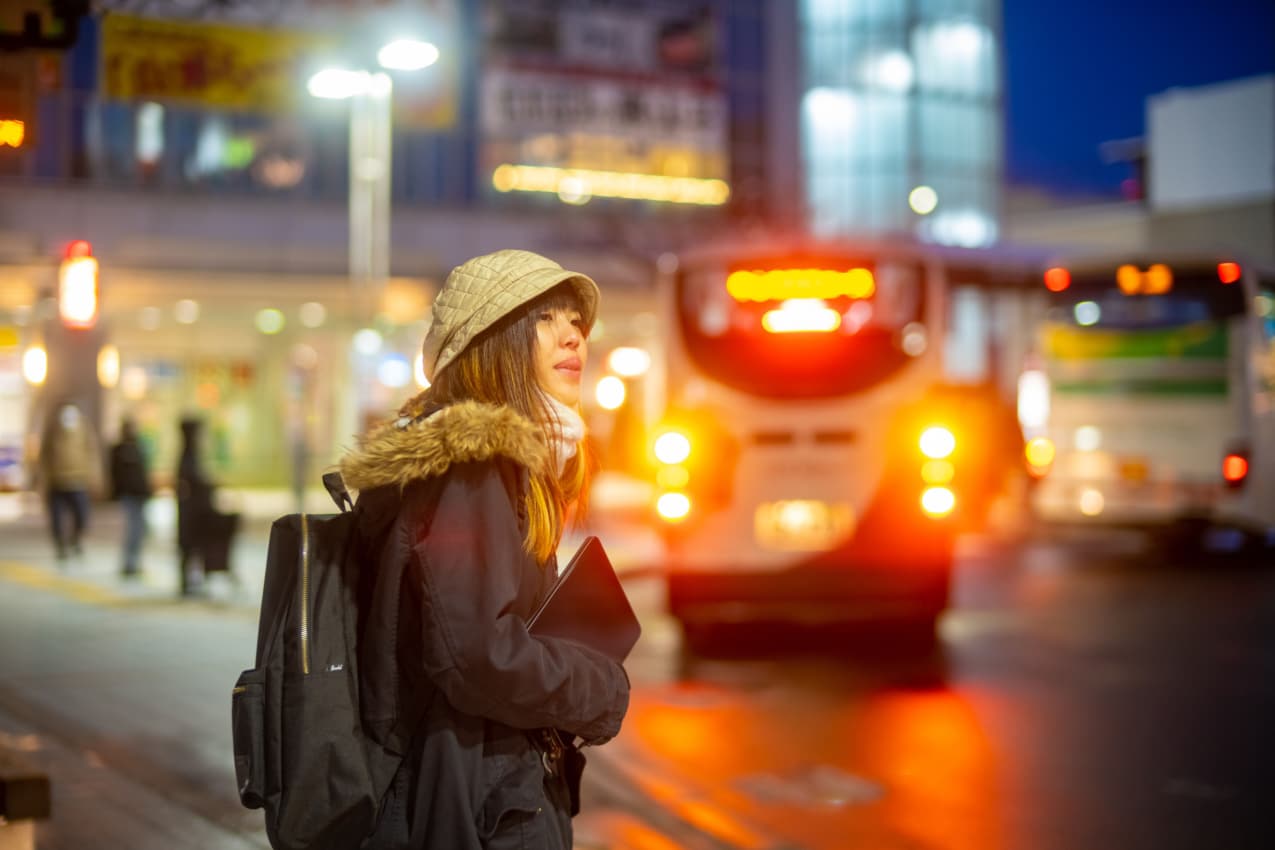
Yes, Japan is safe for solo travel. As we already mentioned, it’s a place where trust runs deep — locals leave belongings unattended, lost items come back intact, and kids commute to school with little supervision.
Still, standard measures should be taken! Even if the majority of people in Japan are friendly, the minority may do something that will ruin your visit.
For instance, Canada’s travel advisory provides a note on drink spiking in Japan, emphasizing the following:
“There are reports of incidents where staff or other customers at bars and nightclubs have mixed drugs and copious amounts of alcohol into drinks of unsuspecting clients. These incidents are particularly frequent in the districts of Kabukicho and Roppongi in Tokyo. The intent is usually to defraud, overcharge services, rob, or assault the person.”
As a safety precaution, never leave your drinks unattended or in the care of strangers.
Additionally, unauthorized photography under skirts and non-consensual groping in crowded trains may occur. For this reason, opt to drive in women-only train carriages. They are marked in pink on the platform.
The Numbeo chart showed a high safety score for walking alone during the day and night. Still, if you do explore Japan’s cities alone, make sure you stick to the tourist areas and far away from the outskirts.
If you ever feel uneasy or need help, look out for the koban police boxes. They’re in every neighborhood, and the officers there are quick to respond to distress calls.
Perils of Nature: The Risk of Natural Disasters in Japan
Nestled along the Ring of Fire , where tectonic plates converge, Japan faces the occasional standoff with nature’s forces—earthquakes, tsunamis, and volcanic stirrings.
The possibility of a natural disaster ruining your vacation to Japan is low, as the government constantly invests in cutting-edge disaster prevention measures —from earthquake alert systems to resilient buildings, and emergency facilities. Each subsequent disaster is less perilous than the previous because the government is eager to learn and protect its citizens better in the future.
Still, it’s wise to remain informed. So let’s learn more.
Earthquakes
Earthquakes are a common occurrence in Japan, with the majority being low on the ‘shindo’ scale and causing minimal damage. The most quake-prone areas in Japan are the Sanriku area (Aomori, Iwate, Miyagi) and prefectures along the Sea of Japan coast (Fukui, Ishikawa, Niigata).
The Great East Japan Earthquake (Tohoku earthquake) in 2011 was the most destructive quake ever recorded in Japan. The resulting damage, including the destruction of many cities and the Fukushima Daiichi Nuclear Power Plant meltdowns, led to the loss of over 15,000 lives and over 30 aftershocks with a magnitude of five or higher on the JMA seismic scale throughout that year.
In the unlikely event of a serious earthquake, it is important to follow the directions of local authorities . If you find yourself alone, take cover by dropping to the ground and covering your neck and shoulders. Seek shelter under a sturdy desk if available.
Tsunamis in Japan are typically triggered by underwater earthquakes, volcanic eruptions, or landslides beneath the ocean floor. The primary threat of a tsunami is along the coastline, particularly in areas adjacent to the Pacific Ocean and the Japanese Sea.
The largest tsunami in Japan occurred in 2011, reaching a height of around 9.3 meters. This tsunami was caused by the Great East Japan Earthquake, the most powerful earthquake ever recorded in Japan.
In response to the 2011 disaster, major sea walls have been constructed in vulnerable seismic areas to mitigate the risk posed by tsunamis. Plus, Japan has a well-developed early tsunami warning system set by the Japan Meteorological Agency (JMA) .
If a tsunami is predicted, stay away from beaches, harbors, and coastal zones. Move as far inland as possible and towards higher elevations to ensure your safety.
Hurricane season officially lasts from July to September but can begin as early as May. During these months, heavy rains and strong winds are common, and there is some potential for flooding.
As of 2023, Japan was hit by a notable hurricane named Khanun, reaching a wind speed of up to 136 mph (220 k/h) and classified as a category 4 typhoon according to the Saffir-Simpson scale.
As severe hurricanes typically move slowly, there is usually sufficient time for you to evacuate and seek shelter. Check the latest hurricane activity in Japan, pack appropriate clothing, and have some indoor activities planned.
Volcanic Eruptions
Japan has around 54 active volcanoes , and some volcanic areas are popular tourist destinations, such as Mount Fuji in Hakone , Mount Aso in Kyushu , and Mount Ontake in the Chubu region.
The most recent significant volcanic eruption in Japan occurred at Mount Aso on Kyushu Island in 2021, leading to the expulsion of ash and smoke. Prior to that, Mount Aso erupted in 2019 , with no reports of injuries or casualties. Japan’s worst volcanic disaster took place on Mount Ontake in September 2014 , resulting in the tragic loss of 144 lives.
Volcanic eruptions are a natural part of the geological landscape, but Japan has implemented monitoring systems and safety measures to mitigate risks. The Japan Meteorological Agency (JMA) provides timely information on volcanic activity, including eruption warnings, evacuation advisories, and danger zone designations. These eruption warnings range from Level 1 (normal) to Level 5 (evacuate). Tourists should pay attention to these alerts and follow guidance accordingly.
If you are participating in guided tours or activities near volcanic areas, tour operators will provide guidance and ensure that safety measures are followed . Listen to your guides and follow their instructions.
Beware the Silent Threat: Carbon Monoxide Poisoning in Japan
Carbon monoxide (CO) poisoning claims around 2,000-5,000 lives in Japan each year, accounting for more than half of all poisoning fatalities.
This odorless and colorless gas is produced by car exhaust, fires, and defective equipment. Is it avoidable? Yes, with the help of CO detectors .
Many authorities around the world, including Japan, advise the use of CO detectors to detect the presence of this gas and alarm you in the case of a leak.
While hotels in Japan likely have CO detectors installed, for added safety, it is advisable for travelers to carry a portable CO detector , especially in cases where the hotel might not have one.
Serenity by the Shore: The Safety of Japan Beaches
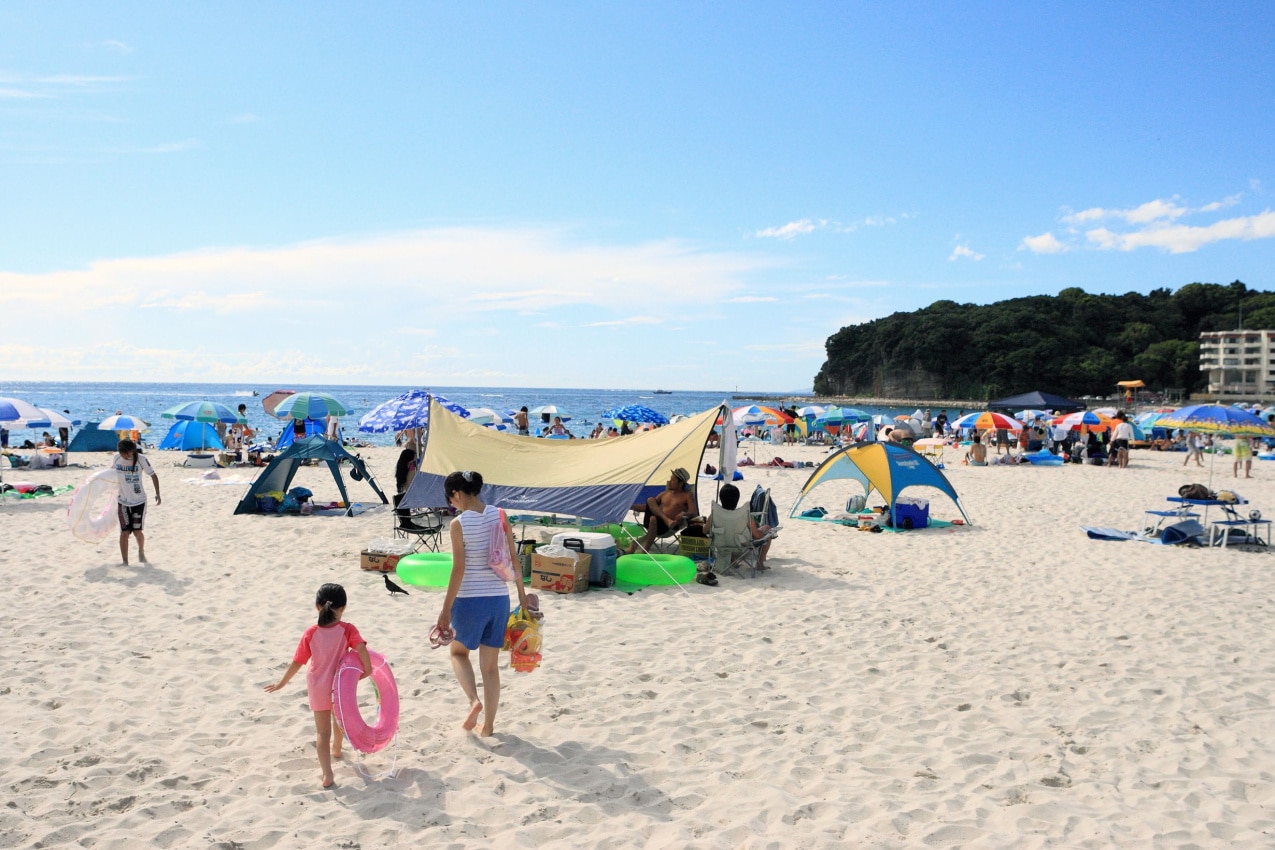
Japan is a long, thin island with the Pacific Ocean on one side and the Sea of Japan and the East China Sea on the other—an extensive coastline with numerous beaches.
Japan’s beaches prioritize safety. You’ll find lifeguards watching over the beachgoers and warning flags set on every beach indicating how safe it is. Here’s a breakdown of the flag colors and their meanings:
- Red and white flag: Tsunami approaching
- Red and yellow flag: Waters are calm, feel free to swim
- Yellow: Waters are a bit stirred up, swim with caution
- Red: Waters are risky, no swimming allowed
- Blue: Waters are clean and safe from dangerous bacteria
Follow these flags, and you’ll have no problem soaking up the sun on Japan’s beaches.
Japan Weather Patterns: What to Expect
Japan experiences four regular seasons: a rainy season, a dry season, and a typhoon (hurricane) season. Given the significant variation in weather across the Japanese archipelago, let’s focus on the weather in Tokyo.
In Japan’s capital, the summers are short, warm, wet, and mostly cloudy, while winters are very cold and mostly clear. Throughout the year, temperatures may soar up to 87°F (30.5°C) and rarely drop below 31°F (0.5°C).
The warm season spans from the end of June to mid-September, with an average daily high temperature of around 79°F (26°C). August is the hottest month in Tokyo, with temperatures reaching 87°F (30.5°C).
The cool season lasts from December to mid-March. The average daily temperature is around 56°F (13.3°C). January is the coldest month, with temperatures dropping as low as 37°F (2.7°C).
The wet season in Tokyo begins in March and lasts until October, with peak hurricane activity occurring from July to September. September sees the most wet days, with an average rainfall of 7.3 inches (195mm). The dry season spans from October to March, with January having the fewest rainy days, averaging a minimum of 1.9 inches (48mm) of rainfall.
Monthly Average Temperatures in Tokyo
When is the best time to visit japan.
Weather-wise— spring and autumn are the best months to visit , particularly March to May and September to November. During these periods, Japan is warm, dry, and covered in cherry blossoms or crimson fall foliage.
Still, the best time to visit depends on the type of experience you’re seeking. Here are some suggestions:
Cherry Blossom Season: The blooming timeline for cherry blossoms varies by region. Southern Japan experiences an earlier bloom, while they’re in full bloom in Tokyo in mid-April. Check the cherry blossom forecast via the Japan Meteorological Corporation for specific information.
Off-Season: Mid-January to March sees fewer crowds, providing a more authentic experience, especially in major cities like Tokyo. Airlines and hotels often lower their prices during this time, making it ideal for budget-conscious travelers.
Peak season: Cherry blossom season and Golden Week in early May are the busiest times to visit. If you are traveling during these months, expect higher prices on flight tickets, hotels, and tours.
Hiking season: The summer months of June to August provide ideal conditions for hikers, particularly in the mountains of the Japanese Alps and Hokkaido’s national parks. However, elsewhere, the weather can be hot and humid.
How to Stay Safe in Japan
- Visit the West-JR website for train timetables, route maps, and station information
- The so-called PASMO card is specifically designed for tourists visiting Japan — with it, you can ride trains, buses, and even purchase items from stores
- Download the SafetyTips app for early warnings about earthquakes, tsunamis, and other weather-related updates
- The Japanese term for exit is “deguchi” — in times of evacuation
- The earthquake announcement is “Jishin desu, Jishin desu, Jishin desu”
- Be cautious with taxi doors, as they open automatically
- Carry your passport at all times in case of police check
- Japan has a zero percent blood-alcohol limit for driving
- Be aware of “no smoking” signs in public places
- Loud conversations in public transport are perceived as rude and annoying
- Expect that in some restaurants you may have to take your shoes off
- Japan’s establishments are more likely to accept cash rather than card payments
- Ask your hotel receptionist to make reservations at restaurants so you’ll always have a table ready
- Learn some basic Japanese phrases to get around
Emergency Numbers
- Police: 110
- Ambulance and Fire Department: 119
Japan has lifted all restrictions regarding COVID-19 — so you don’t need a negative test, proof of vaccination, or quarantine upon entry . In November 2023 , Japan reported around 9,679 cases per day, but the positive cases have dropped by 39%, and fatalities by 44%. So, no need to worry much about COVID-19 when traveling to Japan. Still, it’s wise to take basic precautions: maintain a safe distance from others and wash your hands regularly . If you spot locals wearing surgical masks, no need to panic! It’s a common practice in Japan to wear masks when feeling under the weather to prevent the spread of germs.
Back in January 2015, the Tohoku earthquake contributed to a partial meltdown at a Fukushima power plant. The good news is that the increase of radiation in the area is “low or very low.” Six United Nations agencies , including the International Air Transport Association (IATA) , have given visitors the green light, assuring there’s no health or transportation safety issue around Japan’s Fukushima nuclear plant. If radiation is a worry for you, follow the advice of the Australian , British , and American travel advisories — steer clear of traveling within 12 miles (20 kilometers) of Fukushima .
Sayonara and Happy Travels!
In conclusion, the chances of you encountering any crime in Japan are incredibly low.
The country consistently ranks in the top-ten list of the most peaceful nations, with major cities like Tokyo and Osaka also earning high marks on safety charts.
International travel advisories unanimously support this, placing Japan under the safest “Level One” category and encouraging tourists to rely on nothing more than common sense.
For lone female travelers, taking precautions on crowded trains during rush hours is recommended, as incidents of groping or “chikan” are not unheard of. Opting for the designated women-only carriage, when possible, is a wise choice.
Remember, the friendly officers at kobans are your go-to choice for help, whether you feel threatened or need directions, train schedules, or general information about the area.
With a bit of local know-how, we hope you feel less lost and stressed about your journey to Japan. Wishing you a fantastic time exploring this beautiful and versatile country!
Your email address will not be published. Required fields are marked *
Save my name, email, and website in this browser for the next time I comment.

Japan travel requirements 2024: What travelers need to know
We aim to keep this post updated about Japan travel in 2024 with official Japan travel restrictions, requirements, and health and safety guidance. Our goal is to help you make informed decisions so you can travel confidently, safely, and responsibly in this new post-pandemic world of ours.
Since travel restrictions can vary by citizenship, we will be focusing our post on rules that affect U.S. citizens.
Last update: April 6, 2024. Originally published: July 2022.
Disclosure: This post contains some affiliate links. If you make a purchase through one of our links, we may receive a small commission, at no additional cost to you.
* Get our free Post-Pandemic Travel Checklist *
April 2024: “Tourism is really popular in Japan these days, and crowds can be difficult to avoid. T here are no more travel restrictions for Japan, so it’s a much simpler arrival process than last year. However, we still highly recommend filling out the Immigration and Customs form online for quicker arrival (see instructions below). We showed our passports and QR code at immigration and customs, did fingerprints, and had no questions asked. Wifi in both Tokyo airports can be frustratingly slow, so it’s important to screenshot/download the QR code before departure so you can access it offline. Just as it was pre-Covid, there is a percentage of Japanese people who wear masks out and about in public.” – Michelle & Jedd, Intentional Travelers
At the end of the post, we share more on-the-ground perspectives from local residents and travelers to Japan so you can get a sense of what it’s really like.
Table of Contents
Is Japan open for travel? Can I travel to Japan right now?
As of October 2022 , Japan is open for tourism for independent travelers. Visa-free travel for selected countries, including the US, has been resumed.
Tourists with U.S. passports can stay in Japan visa-free for up to three months. Find details and rules for entering Japan from other countries here .
Japan travel restrictions have been eased but travelers are asked to follow guidelines with regard to masks, social distancing, dining etiquette, and more.
As of April 2023 , a proof of vaccination or a negative Covid-19 test are no longer required for all travelers arriving in Japan.
To facilitate the arrival process, it’s highly recommended to submit your information online through Visit Japan Web before travel.
Steps for Traveling to Japan: What to Know (2024)
For a smoother arrival, travelers to Japan can pre-register for airport Immigration and Customs to receive the QR codes used for “Fast Track” at major airports across Japan.
We completed the Japan entry process in late March 2023 and again in early April 2024. It was admittedly a bit confusing, so I thought I’d share our experience and tips, as the process is still the same (apart from step 2).
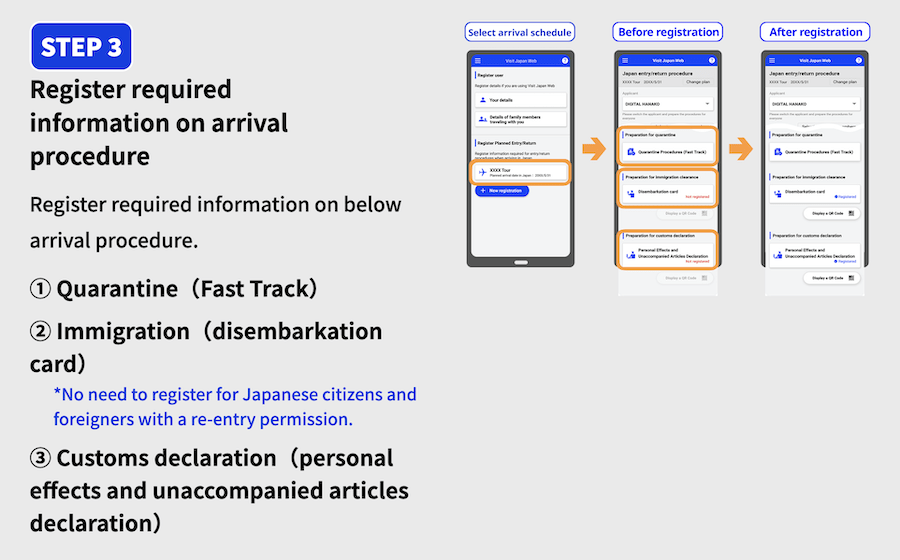
1. Register at Visit Japan Web
While the Fast Track/Quarantine procedures are no longer mandatory to complete in advance, I was glad I followed advice to pre-register through the Visit Japan Web site.
The latest they say you can register is at least 6 hours ahead of your flight to Japan .
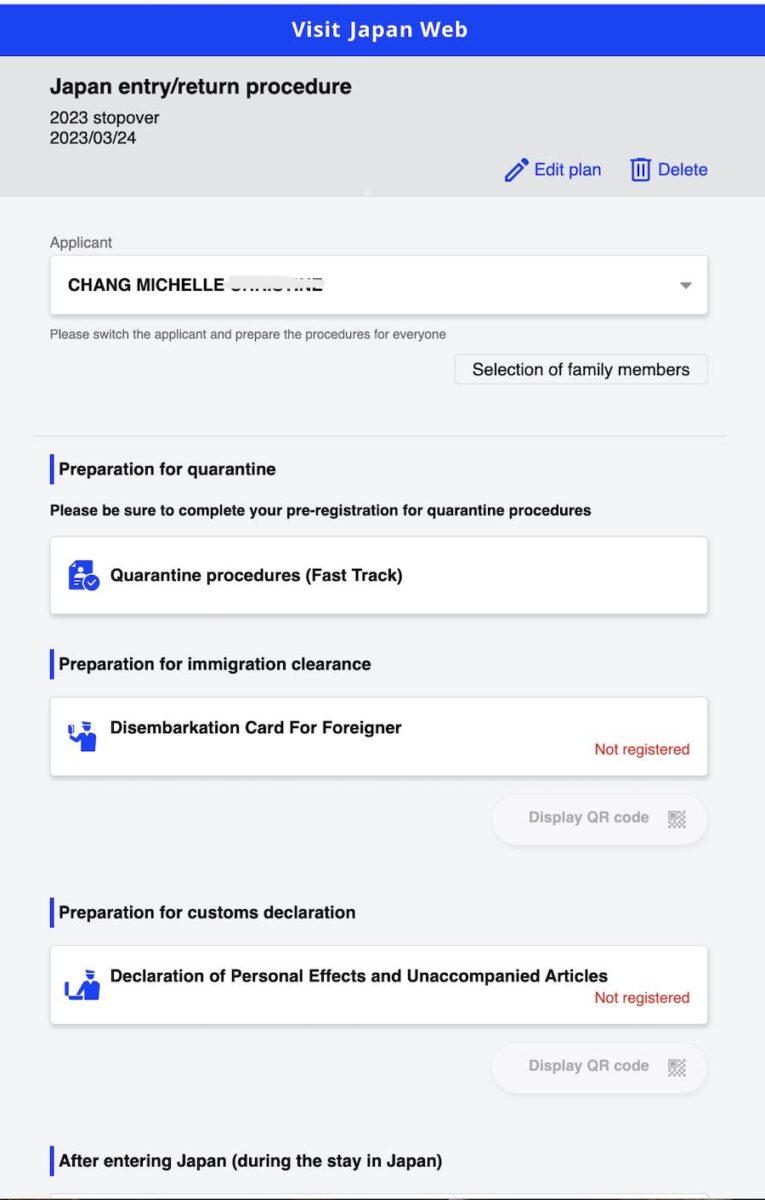
2. Submit your Covid documents in advance – NO LONGER REQUIRED
3. Register for immigration QR code
Returning to the main registration dashboard on the website, select the next module “Disembarkation Card for Foreginer,” which says it’s required for landing in Japan.
Some details pre-populated from from my profile. I selected Tourism for purpose of visit. Then there are three ways to report length of stay: year, month, day; as well as a few questions about any criminal background in Japan.
Once completed, a button “Display QR code” appears below the appropriate section.
Take a screenshot of the Immigration QR code and save it to your phone . It will have a yellow line above it.
If you don’t have the QR code , there are immigration cards available to fill out at standing desks located before entering the lines. Some people got all the way up to the immigration agent and were asked to step aside to fill out a card, which are also available next to each immigration stall.
The immigration line at Narita moved steadily but took about 25 minutes since several flights had arrived at once.
When I showed the QR code, the immigration officer simply took a headshot picture and fingerprint scans, then stuck a “landing permission” stamp in my passport for 90 days. No questions asked.
4. Register for Customs QR code
Returning again to the main dashboard, finally select “Preparation for customs declaration.” This registration allows travelers to go through an electronic declaration gate, which wasn’t super clear once we were at the airport.
I entered my flight origination (Hanoi) and number of family members with me (1). Then there’s the usual customs questions – type of goods, prohibited items, monetary funds, alcohol, cigarettes, souvenirs over 200,000y.
Again, take a screenshot of the Customs QR code and save it to your phone . It will have a blue line above it.
At Narita, the customs line for QR codes are labeled “electronic declaration” in blue. There are also kiosks that allow QR code, card, and duty free, as well as those that are for physical customs card only. The lines weren’t too long so it didn’t matter much which line we chose.
The customs officer had us scan our QR code and we could see our entered data displayed on an over-sized tablet-like device at the desk. No questions asked, we proceeded to exit the airport.
5. Sign up for travel insurance
It’s recommended to obtain insurance to cover medical costs related to COVID-19 in Japan. For travel insurance that covers Covid, we use Nomad Insurance by Safety Wing.
Quarantine rules in Japan: What happens if I get Covid?
Travelers are not required to quarantine upon arrival in Japan, provided that they are not suspected of having Covid-19. See details here .
Residents report that quarantine rules for testing positive may no longer be enforced anymore.
Previously, foreign tourists who tested positive for Covid while in Japan had to contact a local consultation center . A 7-10 days quarantine at a government-designated accommodation facility was required with all costs covered by the visitor.
The quarantine period could end within 7-10 days depending on the symptoms and/or negative COVID-19 test result. See details here .
Can I travel to Japan in June? Can I travel to Japan this Summer?
Travel to Japan in June is open . See details above and check back for updates.
Is it safe to fly to NRT Narita or HND Haneda International Airport ? Health screenings and body temperature checks are no longer in place at the airport. Wearing of masks is no longer required on flights or in the airports, though masking is still widely practiced.
Stringent cleaning and seating limits are implemented.
What is it like to fly to Japan right now? All Nippon Airways reports that masks are now optional. Additional procedures are in place at Immigration – please see details above.
Do Americans have to quarantine when traveling to Japan? No . See quarantine details above.
Does Japan check COVID-19 symptoms of incoming travelers? Health screening procedures such as temperature checks and simple symptom questionnaires are typically not in place at ports of entry anymore.
Does Japan require a negative Covid 19 test for travelers? A negative test is no longer required to enter Japan as of April 2023.
Does Japan require a proof of Coronavirus vaccine for travelers? A proof of Coronavirus vaccine is no longer required to enter Japan as of April 2023.
Do I still need to provide a negative Covid test or quarantine if I have been vaccinated? No. A negative Covid test, quarantine, or proof of vaccination are no longer required to enter Japan.
Is a booster shot required for travel to Japan? No. A booster shot is no longer required to enter Japan.
What Covid testing options are available for travelers? PCR and/or antigen tests are available for travelers in Japan. Travelers should contact the local consultation center to determine the location of testing facilities within Japan. A non-comprehensive list of some COVID-19 testing facilities can be found here .
Test results are available within 24 to 72 hours but many labs can return results in a matter of hours. PCR test costs vary from ¥2,500 to ¥16,500.
What healthcare options are available to travelers in Japan who get the virus? Japan hospitals and clinics are open. Foreign visitors are required to secure a medical insurance which that will cover medical costs in case they contract COVID-19 in Japan.
For travel insurance that covers Covid, check out Nomad Insurance by Safety Wing >
What service businesses and restaurants are open in Japan ? Businesses and restaurants in Japan are open. Some businesses may require their own mask rules or capacity limits.
What public gatherings are allowed in Japan? Public gatherings are allowed in Japan subject to safety guidelines.
Are face masks required in Japan? As of March 2023, wearing of face masks in Japan is recommended but no longer required.
Face masks are almost universally worn in public, especially in urban areas, indoors and on public transportation. The Consulate website states that failure to adhere to mask-wearing norms reflects poorly on foreign visitors.
Are buses running in Japan? Trains, buses and taxis are running as usual in Japan.
How has the Coronavirus impacted Japan?
Japan managed impressively well compared to most countries in the early days of the pandemic. Although Japan has been previously in a State of Emergency, the lockdowns were less disruptive on Japanese daily life.
However, Japan’s inbound tourism business lay dormant for years. Japan finally began easing restrictions in 2022 and reopened to travelers in June with strict entry requirements.
Japan finally eased entry requirements for travelers in October 2022 making it easier for travelers to visit the country. Visa-free travel has also been resumed for select countries.
Vaccination in Japan started later than some other countries. Around 80% of the population has been vaccinated and 64% had received a booster shot.
Tourism is now back with record numbers of visitors, however, staffing shortages have not fully recovered.
For the current situation in Japan, including: total COVID-19 positive cases; total cases in Japan; and COVID-19 testing in Japan, please see the Japan Ministry of Health site .
What should you pack for safely traveling in Japan?
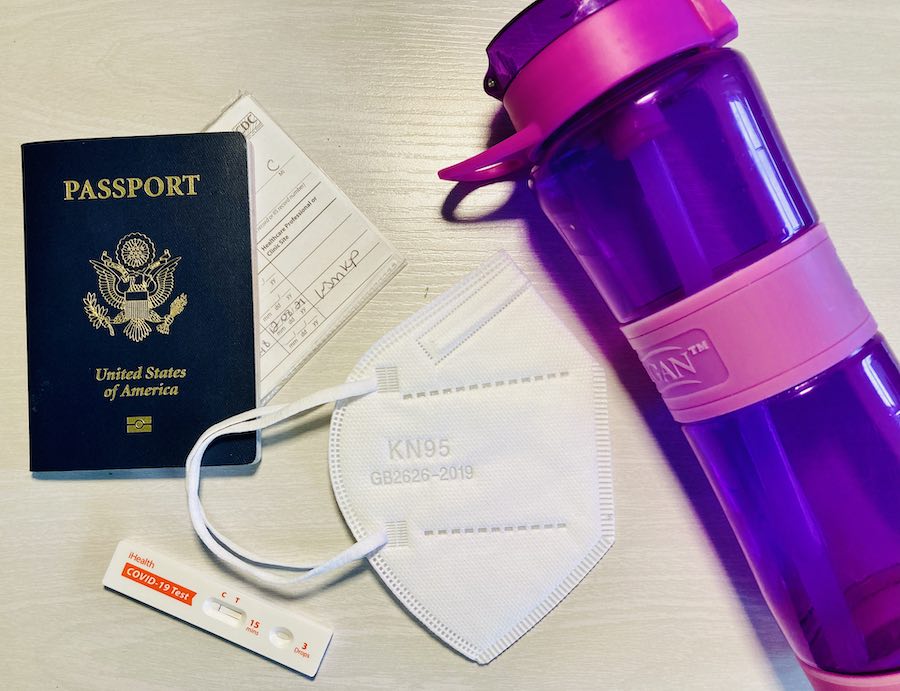
😷 Face Masks -Face coverings are recommended and widely used in public places. Find N95 masks at Bona Fide > or designer options at Vida >
💊 Medicine – Bring enough prescription and over-the-counter medication for your entire trip to avoid trips to the clinic.
💳 Vaccine Card Holder – Protect that paper CDC card when traveling abroad (if your country doesn’t offer a digital version). Get a simple plastic protector > or Vegan leather clippable > or Leather passport + card combo holder >
👃 Covid self-test – The most studied rapid antigen self-test with FDA emergency authorization. NOT valid to enter countries. Use for your own peace of mind. Order from CVS > or Walmart >
💧 Sealed water bottle – Make sure your reusable water bottle has a lid that’s not exposed to the air. We use one of each of the following: Shop insulated water bottles with protective lid > Shop water bottles with purification filter and protective lid >
✈️ Travel insurance that covers Covid – We’ve started using Nomad Insurance by Safety Wing for affordable evacuation, international medical, and trip coverage.
What do Japan locals and recent travelers say about visiting Japan now?
What is it like to visit Japan right now? It’s our goal to provide regular updates here from real people on the ground, to help potential visitors know what to expect. The following are subjective opinions only. Official travel guidance can be found above.
January 2024 – Brandon of Zimminaroundtheworld , expat living in Japan: “Japan is seeing an increase in tourism now that the country is open to visitors. Many visitors are traveling to Tokyo and Kyoto but some towns and cities like Nikko, Fukuoka, Hiroshima, and Naha are also seeing rises in tourism.
Currently there are no travel restrictions within Japan unless it is due to environmental catastrophes like the earthquake that occurred in Ishikawa Prefecture recently. Access to healthcare in Japan is easily available and affordable. Although foreigners can sometimes pay up to 200% more for healthcare it is still cheap.
Many attractions and famous sites around Japan especially in Kyoto and Tokyo are crowded with lines that are longer then expected. In general, restaurants in Japan are smaller and can only able to accommodate up to ten people or fewer and the space can feel cramped. Like anywhere else, keep an open mind and be flexible and there will be no problems while traveling around Japan.”
September 2023 – Jackie Szeto of Life of Doing , American traveler: “My husband and I traveled to Tokyo and Nikko, Japan for vacation in September 2023. Expect large crowds at major attractions, restaurants, and trains in major cities such as Tokyo and Kyoto. Visiting other destinations such as Nikko is a nice change of pace with fewer crowds, especially on the weekdays.
It’s recommended to complete the Immigration and Customs declaration on the Visit Japan Web to expedite arrival, but it’s not required. When landing at international airports, the QR codes for Immigration and Customs are still accepted. Otherwise, all COVID protocols have been dropped in the cities. Antibacterial hand sanitizer is still provided at entrances of hotels, restaurants, and shopping centers. Some people still wear masks in crowded areas and on trains, but most go mask-free.”
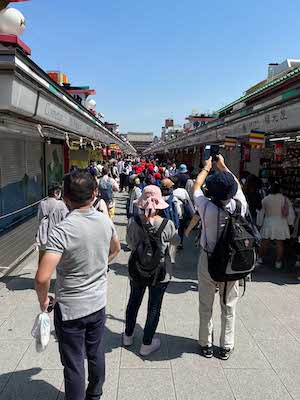
May 2023 – Sophie Pham of Delightful Travel Notes , traveler: “My husband and I were traveling in Japan for 11 days from May 11-21, 2023 for our vacation. I found that Japan had already welcomed visitors with open arms, free of earlier restrictions. The return of both domestic travelers and international tourists created a lively atmosphere, and crowds could be seen in a lot of places.
In May, it took us 45 minutes to clear immigration at Kansai International Airport after landing at around 7:45am.
All attractions and food venues were fully open, with no social distancing measures or mandatory mask rules, although some restaurant servers, locals, and taxi drivers still chose to wear masks. Some famous restaurants had long lines again, and popular attractions like Fushimi Inari, Kiyomizu-dera, and Senso-ji-ji could get crowded during the day. If there’s a particular popular restaurant you want to try, it may be best to make your dinner reservation in advance, especially for weekend. Overall, everything is lively again and we had a great time.”
March 2023 – Michelle, Intentional Travelers, American visitor: “We enjoyed a two day layover in Japan. The online procedures and QR codes were a bit confusing but I highly recommended doing them in advance of travel to make your arrival smoother.”
February 2023 – Joel, US traveler: “For the most part the Japanese are wearing masks. I’d say mask wearing is at about 99%. Despite the crowds in the city and packed trains and subways, it honestly feels way safer than generally any place in America where mask wearing is far from the majority. ANA enforces a mask wearing requirement whereas United is pretty much a free for all.
One key thing that is good to know is at the ticketing counter they need to know your return flight info when initially checking in. We had all the other Japan travel docs as far as the gov mandated requirements but this one kinda caught us off guard. The immigration line may seem staggering but it moves. ”
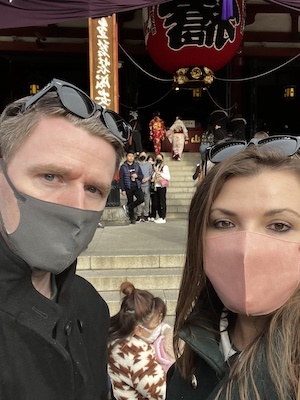
January 2023 – Lizzie of Wanderlust & Life , UK traveler: “I flew to Tokyo in January 2023 for 3 days as part of a stopover between Australia and the UK. For us it felt like the country is so happy to welcome tourists again. We were slightly worried about visiting or entry restrictions changing last minute but the airline kept us up to date and apart from filling out a lot of forms on arrival it felt quite normal being there.
As Japan only opened recently there weren’t as many tourists as we were expecting which was a plus really. We were made to feel so welcome in the country.
Masks are mandatory indoors and everyone seemed to be following this. The vast majority of people were also wearing masks outdoors too. Sanitiser is readily available in restaurants and tourist attractions. We didn’t encounter any contact tracing or even requests to show covid passes. The only frustration we had was that we flew JAL and we had to wear masks our whole flight which was about 14 hours in one go and this was enforced by cabin crew.”
November 2022 – Darryl H., New Zealand traveler: “My visit to Japan involved a return to the sort of measures that, in my home country of New Zealand, had been abandoned some time ago. The first action on arriving at Tokyo’s Narita Airport, with my mask firmly in place, was to allow officials to check and confirm I had complied with mandatory online registration of evidence of my vaccination status. Once this had been done, the arrivals process was pretty much standard.
During my 10-day stay, I experienced no restrictions on my movements or activities. The differences were in the roles of masks, sanitiser and – in some instances – distancing. The wearing of masks indoors and on public transport is close to one hundred percent, whether or not they are demanded. Outdoors, in most situations, they appear to be worn by at least 98 percent of people, although in some areas later in the evening there is an obvious relaxation in standards – especially among younger people. While most tourists appear happy to comply with the standards followed by locals, the proportion of non-mask use by non-Japanese is clearly larger than by Japanese. At no stage did I see any visitor reproached for this.
There is sanitiser on hand (pun intended) everywhere. It is probably accessed by about a third of people. There are many locals who are fastidious about sanitising.
While I observed no enforced distancing on public transport or in the street, it is definitely in place in cafes and other eateries. Most places I visited had plastic partitioning between patrons, and crosses to discourage the use of every second seat. Groups or couples are, of course, welcome to sit together.
The buffet breakfast in my hotel illustrates all three of the above differences. When I arrived at breakfast each morning, masked of course, the attendant ensured that I first sanitised my hands and then put on plastic gloves. Only then could I approach the serving implements and food. I would then sit on one of two seats (the second having a cross on it), both of which were partitioned off from the next pair of seats. Seats with another seat opposite were separated by another plastic partition. If I wanted to return to the buffet for more food, I first had to remask and re-glove. Once I forgot the gloves, and was politely turned back before I could touch the serving implements.
It is not uncommon for Japanese hospitality venues to give high priority to cleanliness, but there seems to be super-high priority now. Where in New Zealand I might expect a quick wipe over of a table between customers, in Tokyo it now appears to be a thorough and sometimes deep clean.
The precautions in no way reduced my pleasure in revisiting Tokyo. And they increased at least my perception of being protected.”
September 2022 – Jackson, American visitor: “Traveling to Japan reminded me of the COVID situation in Hawaii a year ago. People go about their day with a medical mask. Every store front has hand sanitizers and thermo cameras. COIVD testing and vaccination clinics are common place. Despite these COVID precautions, Japanese residents and businesses continue to welcome visitors with refreshing grace and hospitality. Japan’s omotenashi , beautiful scenery, and extraordinary delicacies are worth exploring and appreciating, but can tempt visitors into overlooking the uncertainty that underlines Japan. I hope visitors will take the time to learn about the challenges of the Japanese people and reciprocate Japan’s hospitality with a gracious thank you.”
Aug 21 2022 – Y., American Japanese dual citizen: “ I returned from visiting family in Japan two days ago. Travel is still tough. The plane was empty – only 20 passengers on a big airplane. My pre-travel Covid test was 10 minutes earlier than the required 72 hours so I was turned away at the airport. I scrambled to find a last minute PCR test with rapid results and rush back to the airport.”
August 2022 – Christine, American visitor: “Japan isn’t currently open to tourists. I was there for a school conference, and had to get a conference visa. One has to get a visa for Japan in advance and you can only get one with an EFRS form filled out from someone in Japan.
I had to have a negative PCR test from within 72 hours of departure time. There’s eased quarantine procedures, which depend on the countries you’ve been to in the previous 2 weeks. And you have to have the MySOS app on your phone because they might check up on you. It also expedites your entry because you can upload all the necessary forms/COVID test/questionnaire ahead of time.
Everyone wears a mask everywhere, and they’re available for cheap at convenience stores. Because I was on a university’s campus most of the time, I had to report my temperature and if I was having any symptoms to the University every day.”
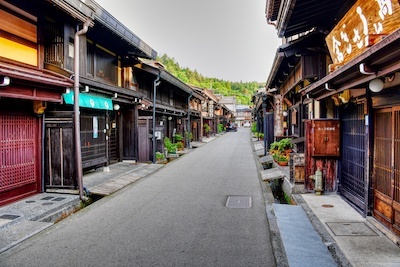
July 2022 – Brandon of https://zimminaroundtheworld.com , Expat in Japan: “Currently Japan is only doing guided tours for international tourism. Travel entry for normal tourism is not an option at the moment. I recently took a trip around central Japan and visited a variety of cities and saw hardly any tourists. It’s nice to get great photos of popular attractions without crowds of people in the photos. But at the same time, it is taking a toll on the economy. I’ve seen shops and restaurants struggle to survive here and locals begging for tourism to come back.
Masks have been worn in Japan even before Covid. To this day, the majority of the population wears masks and obeys the rules, this includes both foreigners and locals. I wear a mask when leaving my apartment and only take it off when social distancing can be achieved or while eating at a restaurant. The positive aspect about Covid is that there are no long lines to enter attractions or eating establishments. I feel public transportation is safe here as the Japanese are very good and sanitizing everything.”
Planning a trip to Japan?
Check out our other Japan travel resources: – Great Things To Do Around Iwakuni, Japan
If you have questions or updates about travel to Japan during the Coronavirus crisis or post-pandemic, please let us know in the comments below.
~ Pin this post for later or share with friends ~
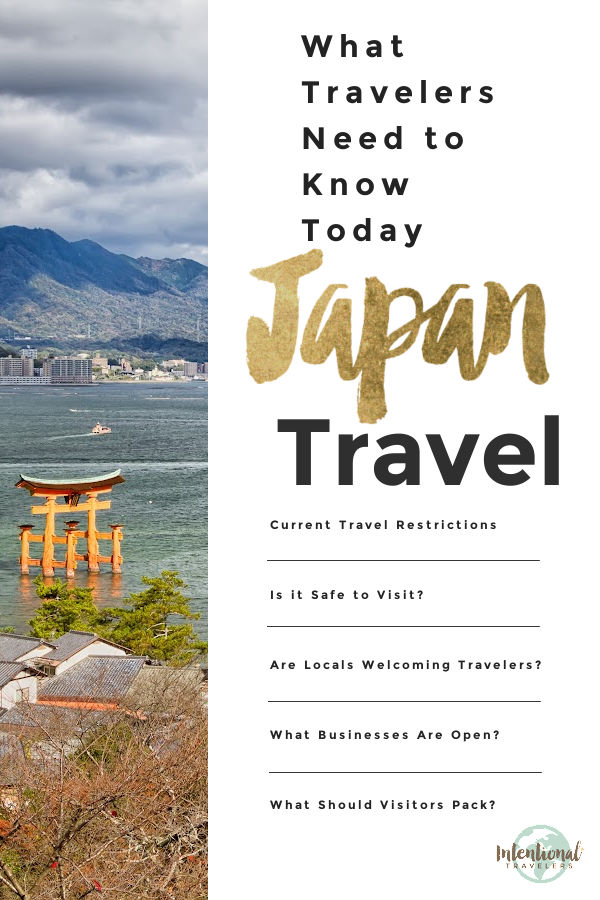
Disclaimer: Please note, travel restrictions change frequently. Readers must take responsibility for verifying information through official sources like the State Department and CDC, in respect to their specific situations. No responsibility can be accepted by Intentional Travelers for action or inaction as a result of information provided through IntentionalTravelers.com. Any information provided here is issued as general information only.
Similar Posts
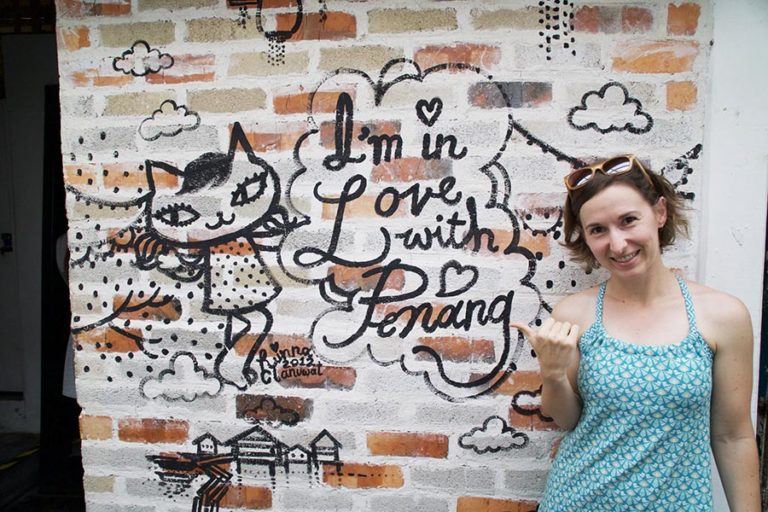
Best things about Georgetown Penang (Plus street art + street food map)
George Town, Penang, Malaysia was recommended to us by fellow nomads. Now that we’ve been, we think Georgetown is the best place to visit in Southeast Asia for first time backpackers, couples, and new nomads. In this post we’ll share: – 6 Reasons why George Town is where to go in Southeast Asia for the…
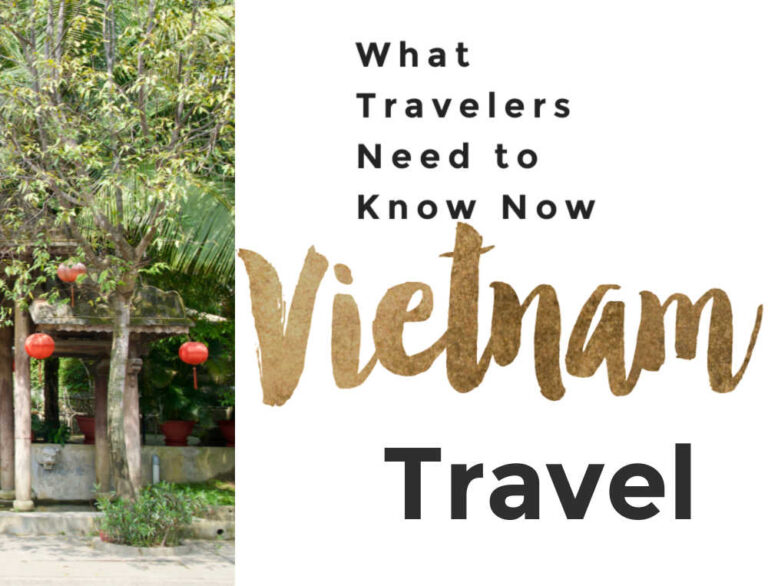
Vietnam travel requirements 2024: What travelers need to know
We aim to keep this post updated about Vietnam travel in 2024 with official Vietnam travel restrictions, requirements, and health and safety guidance. Our goal is to help you make informed decisions so you can travel confidently, safely, and responsibly in this new post-pandemic world of ours. Vietnam is a destination close to our hearts….
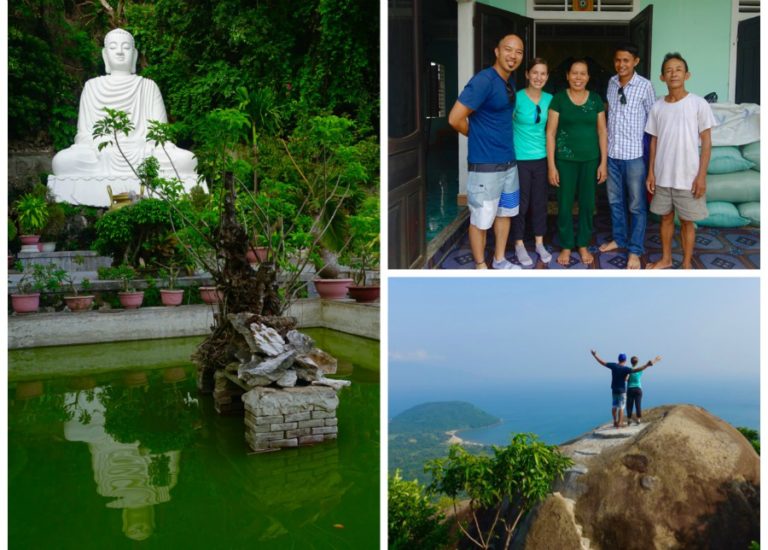
Motorbike Tour From Hue to Hoi An, Central Vietnam
You’re traveling through Central Vietnam, from Huế to Hoi An (or vise versa). You could take the bus – probably the cheapest option. You could take a train. You could rent a car. Or hire a private driver. Or you could take Vietnam’s most typical mode of transportation: the motorbike, and have a spectacular adventure…
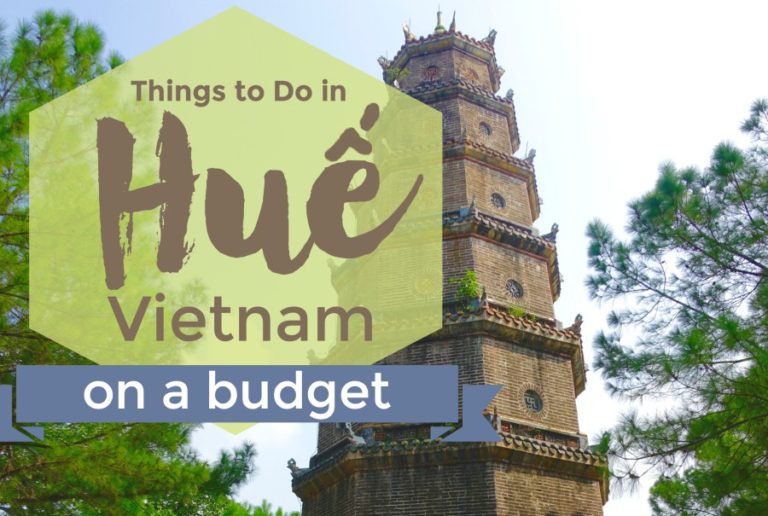
What to Do in Huế, Vietnam on a Budget
Huế can be a great stop for travelers on a central Vietnam itinerary. In this post, we’ll cover the best things to do in Hue, where to stay, and what to eat on a budget. Visiting Hue, Vietnam Once the national capitol and home to the royal Nguyen family, much of the Imperial City was…

Our Favorite Alternatives to Travel Wallets
When it comes to exploring new destinations, we all want to be worry-free and secure. While traditional hidden travel wallets have been the go-to solution, we find they leave much to be desired. The discomfort of hanging wallets around our necks or dealing with bulky waist options led us to look for alternatives. In our…
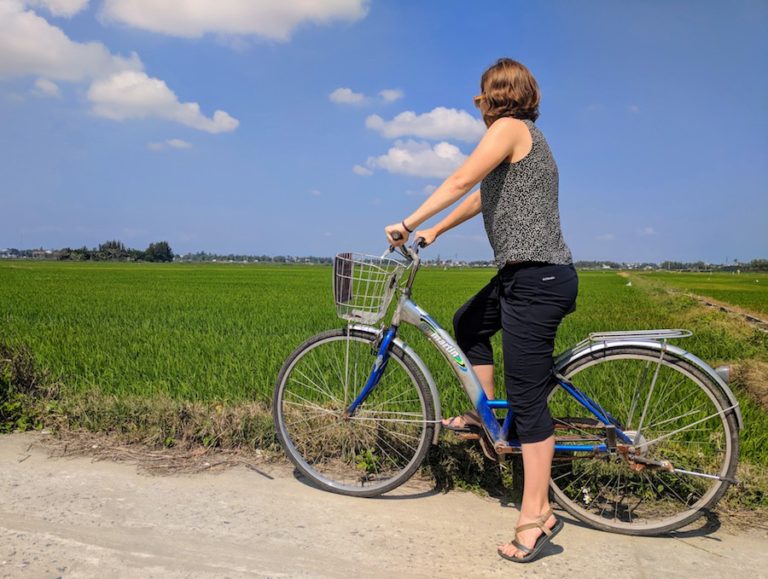
Central Vietnam Itinerary: Top Destinations to Visit
Many tourists are drawn to traveling Vietnam from North to South, but we often recommend prioritizing destinations in Central Vietnam. If you’re visiting this area, our Central Vietnam itinerary will help you plan the perfect trip. Is Central Vietnam worth visiting? In my personal opinion, yes 100%. Having spent several months in Vietnam over several…
Hi Great article ! I noticed you have been vaccinated once with JJ (same here) . You mentioned the requirements for boosters but it sounds like you haven’t had a booster? I tried to sort through the link page but couldn’t find any further info. So my question is I’m planning to travel after May 8th with 1 JJ vaccination, I’m Canadian, but will be coming from Indonesia. Thanks for any insight you might have
Hi and thanks for visiting our blog. While we had the single JJ vaccination, we also had boosters. I mentioned it because the Japan entry form allows you to essentially count JJ as two shots out of the three that are required. In other words, at least one booster is currently required for entry to Japan. That said, vaccine documentation will no longer be required after May 8 so you shouldn’t have to worry about it.
I am travelling to the US from Australia via Japan in September. I fly with JAL, from Melbourne (MEL) arriving at Haneda International Airport (HND), but need to fly out of Narita International Airport (NRT) to New York (JFK).
I would like to know if I will be allowed to travel, via Japan, in September.
Australia is in Blue Category and I have had 3rd dose of Covid vaccination.
I look forward to your reply soon.
Thank you for your question. Unfortunately, it’s difficult to say what will be possible in September, as we do expect the rules to change over time. Currently, foreign travelers are limited to package tours and may not use public transit. To find out if any exceptions can be made for transit between airports, you can try the Japan visitor hotline .
Leave a Reply Cancel reply
Your email address will not be published. Required fields are marked *
This site uses Akismet to reduce spam. Learn how your comment data is processed .
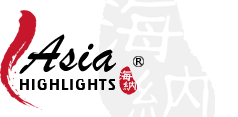
- 2 Weeks for Couple
- 2 Weeks for Family
- Thailand Lantern Festival
- Indonesia(Bali)
- South Korea
- China (HK, Taiwan)
- Itinerary Ideas
- Asia Highlights Travel Reviews
- Thailand Travel Reviews
- Vietnam Travel Reviews
- Cambodia Travel Reviews
- Japan Travel Reviews
- Myanmar Travel Reviews
- China Travel Reviews

Best (and Worst) Times to Visit Tokyo: Weather, Experiences, and Travel Tips
Tokyo is the capital city and it perfectly combines modernity and history. You shouldn't miss it when you travel to Japan. Tokyo has a climate with four distinct seasons. Spring is mild to warm, summer is hot and humid, autumn is warm and wet, and winter is cool and drier, sometimes with snow.
The best times to visit Tokyo are in spring (March to May) to enjoy the best scenery of cherry blossoms and in autumn (September to November) to appreciate the charming colorful foliage.
August is the hottest month in Tokyo with an average daily high of about 31°C (88°F). The coldest month is January, with an average daily high of 10°C (50°F).
The "plum rainy season" extends from June to mid-July and brings persistent light rain. Typhoons hit in September and October, when there is the most rainfall but in concentrated storms between drier periods.
- Spring in Tokyo
- Summer in Tokyo
- Autumn in Tokyo
- Winter in Tokyo
- Travel Guide by Month
Weather in Tokyo Every Month
Discover real reviews of Highlights Travel Family 's best-rated service across trusted platforms.
Spring in Tokyo (March to May): Comfortable Weather and Japan's Best Scenery — Cherry Blossom
March to May, especially March and April, is the most popular travel season in Tokyo — and even in the whole of Japan — as you would experience comfortable weather with cherry blossoms blooming nearly everywhere. Temperatures range from 10–19°C (50–67°F) on average in April and there's an average rainfall of about 130 mm (5 in).
Visiting Japan during the Easter vacation could be a good option for your family. It takes about 7–10 days to enjoy the main highlights in Tokyo, Kyoto, and Osaka as well as to take in some unique experiences. These could include enjoying a boat ride to immerse yourself in the beauty of the pink cherry blossoms along the riverside while avoiding the crowds in the park, and taking a family photo while wearing kimonos under the cherry trees.
Wearing a sweater and a light coat is adequate to cope with the weather, but also pack shirts to wear in the daytime when it gets warmer.
Insider tips: Prices during the cherry blossom season are about two or three times higher than usual. Many traditional ryokans and excellent guides are also fully booked in advance, so we highly recommend that you book hotels and flights at least 3-6 months in advance.
Check more details about Plan Your First Trip to Tokyo >>>
Summer in Tokyo (June to August): Hot, Humid, and Big Fireworks Celebrations
Summer (June to August) is the hottest and most humid time in Tokyo. Temperatures range from 26–30°C (79–86°F) on the average summer day, and the average rainfall is about 160 mm (6 in) per month.
When traveling in Tokyo in summer, the heat is not a big problem to worry about. You could enjoy plenty of indoor activities inside air-conditioned buildings and travel to the attractions in a private air-conditioned car, which is also helpful to minimize the inconvenience of any rainfall.
It does not rain every day (12 days a month on average) and you can travel around easily. Although it is the rainy season, many family groups still visit Japan to celebrate their kids' graduations, anniversaries, birthdays, or just for an annual vacation.
Big fireworks celebrations are popular and lively activities in Tokyo during the summer. Imagine wearing a yukata (summer kimono) and enjoying the colorful fireworks in the cool summer breeze. It is not only a visual feast but also provides you with an opportunity to soak up the traditional cultural atmosphere.
July to early September is the only time you would be allowed climb Mount Fuji. You could enjoy cooler temperatures, fresh air, and sea of clouds there.
It's suitable to wear summer clothes, such as shirts, shorts, sunglasses, and hats. You are recommended to take an umbrella in case of sudden rain.
Insider tips: June is an ideal time for a summer vacation in Japan as a family with teenagers. You could enjoy slightly cooler temperatures, fewer crowds, and cheaper costs.
Autumn in Tokyo (September to November): Cool Temperatures and Colorful Fall Foliage to Appreciate
The cool weather and colorful fall foliage make autumn (September to November) another popular time to visit Tokyo and other areas of Japan. Temperatures during this period have a pleasantly mild average range of 15–22°C (59–72°F).
September and October (the typhoon season) are characterized by a high average rainfall of about 230 mm (9 in) per month, while November tends to be much drier with a moderate average rainfall of 96 mm (4 in).
You could appreciate the fall foliage almost everywhere in November , take a leisurely stroll or enjoy a cup of steaming tea in a tranquil Japanese courtyard teahouse to admire the colorful foliage and enrich your experience in Japan.
The weather changes frequently in Tokyo in fall, but making sure that you have a shirt, a mid-layer, and a rain coat should be enough to cope with it. If you travel during the typhoon season, don't forget to take an umbrella.
Winter in Tokyo (December to February): Cold but Good for an Onsen Experience
Winter (December to February) is the coldest time in Tokyo but it's not too cold for traveling , with an average high temperature of about 11°C (52°F). It's the driest time of the year, with an average rain/snowfall of about 56 mm (2 in).
Hakone , located about 2 hours away via Japan Railways (JR) from Tokyo, is the best place to relax in a traditional Japanese-style ryokan with an onsen (hot spring bath) , where you could enjoy the stunning snowy trees and mountains surrounding you.
To enjoy some winter fun, you could take a JR train to Nagano, which would take about 1½ hours. There, you could witness the unique sight of snow monkeys soaking in warm hot springs to keep themselves warm.
Celebrating Christmas and New Year in Tokyo would allow you to see the dazzling Christmas lights, pray for good luck in the coming year at a shrine, and watch the big fireworks to welcome the New Year. It one of the busiest times to travel, so we recommend that you book flights and hotels at least 3-6 months in advance.
You'd better wear thick clothes to keep warm in Tokyo in winter. We recommend that you take a down jacket, gloves, and waterproof boots.
Contact us if you are thinking about a trip to Japan. Our professional travel advisors are ready to create a wonderful trip based on your needs and interests, whatever the weather.
Tokyo Travel Guide by Month
Click the sign of each month to check the travel guide information.
Tokyo Weather in January
- Average high: 10°C (50°F)
- Average low: 2°C (36°F)
January is the coldest month and it's a dry time for Tokyo, with light and infrequent snow or rain. The cold weather also brings the benefits of the lowest prices and the fewest crowds after the New Year holiday.
Tokyo festivals and events in January: New Year is a popular time to travel to Tokyo and you could pray for good luck in the coming year at a shrine.
Suggested reading: How to Plan a Japan Winter Trip >>>
Tokyo Weather in February
- Average high: 11°C (52°F)
Tokyo in February remains cold and relatively dry, but it's not too cold to travel. This makes it a good choice for those who want to avoid high prices and large crowds.
Tokyo Weather in March
- Average high: 14°C (57°F)
- Average low: 4°C (39°F)
The weather starts to get warmer in March in Tokyo, but it still gets cold in the early mornings and evenings.
March sees the start of the cherry blossom season, although most of March in Tokyo is uncrowded. When the cherry blossom comes into full bloom in late March, it tends to get very crowded.
Tokyo Weather in April
- Average high: 19°C (66°F)
- Average low: 9°C (48°F)
April is a pleasant time to travel to Tokyo, with mild temperatures. The average rainfall increases to about 134 mm (5 in), but it wouldn't significantly affect your trip plans as there is only moderate rainfall.
Tokyo festivals and events in April: The cherry blossoms usually reach full bloom in early April, during time which prices can double and crowds tend to be large.
Tokyo Weather in May
- Average high: 23°C (73°F)
- Average low: 14°C (57°F)
May sees the end of spring blossom season and the rain situation is similar to April's, but there is warmer weather. You could explore the highlights and do some outdoor activities in comfortable weather.
Tokyo Weather in June
- Average high: 26°C (79°F)
- Average low: 18°C (64°F)
June is the beginning of summer and the "plum rain season". It does not rain every day. Sometimes there may be steady light rain, but it would not affect your journey.
June is an ideal time to travel to Tokyo for many families with teenagers as the weather is significantly cooler than the following summer vacation months (July and August), there are fewer crowds, and the cost is cheaper.
Suggested reading: How to Plan a Japan Summer Trip >>>
Tokyo Weather in July
- Average high: 30°C (86°F)
- Average low: 22°C (72°F)
The plum rainy season continues in July and the weather is hot and humid. But there is no need to worry as Tokyo offers plenty of authentic cultural activities that you could enjoy indoors.
Tokyo festivals and events in July: In July, Tokyo hosts many big fireworks celebrations, when you could immerse yourself in the local cultural atmosphere by wearing traditional Japanese clothing.
Tokyo Weather in August
- Average high: 32°C (90°F)
- Average low: 24°C (75°F)
The heat is not a big problem in August, because you could enjoy plenty of indoor activities inside air-conditioned buildings and travel to the attractions in a private air-conditioned car.
Tokyo festivals and events in August: The Obon Festival is the most important festival in summer in Japan, aimed at worshipping ancestors. A grand celebration takes place in Tokyo during this time and you could observe or participate to experience the cultural atmosphere.
Tokyo Weather in September
- Average high: 28°C (82°F)
- Average low: 20°C (68°F)
Typhoons hit Tokyo in September and you might experience heavy rainfall for a period of a day or two. If you are travelling in September, keep your itinerary flexible in case of flight delays or cancellations.
Tokyo Weather in October
- Average low: 15°C (59°F)
The weather becomes cooler and more pleasant in Tokyo in October. In late October, the leaves turn yellow or red, creating Japan's attractive autumn scenery.
Tokyo Weather in November
- Average high: 17°C (63°F)
November is the best time to travel to Tokyo to enjoy the comfortable weather and appreciate the beautiful scenery of colorful fall foliage.
It's one of the peak seasons in Japan so we recommend that you make reservations at least 3-6 months in advance if you want to have your choice of hotel and the best guides.
Tokyo Weather in December
- Average high: 12°C (54°F)
December is cold and much drier in Tokyo . You could experience classically-Japanese and seasonally-unique activities during this time. Stay in a traditional Japanese ryokan with an onsen to enjoy snow scenery in Hakone and watch snow monkeys soak in the hot springs to keep warm in Nagano.
Why Asia Highlights (10,000+ reviews & 98.8% 5-star rating)
- Save Your Time:
- Less research, more enjoyment!
- Real-time 1V1 expert planning
- Maximize Your Flexibility:
- Personal local guide and ride
- Explore at your own pace
- Celebrate Your Journeys:
- Specially-crafted family adventures
- Celebrate milestones with style!
- 10-Day Japan Cherry Blossom Spring 2025 Mini-Group Tour
- 2-Week Japan Private Family Vacation
- 12-Day Classic Japan Tour
- 9-Day Japan Highlights Tour
- Plan a Family Trip to Japan 2024/2025: Experiences and Itineraries
- Plan a Japan Cherry Blossom Trip 2025, Dates and Avoid Crowds
- 12 Days in Japan: Top 4 Itineraries for First Visit 2024/2025
- 1 Week in Japan: Top 5 Itineraries for First Visit 2024/2025
- Japan Weather in January: Travel Tips for First-Timers
- Japan Weather in February 2024: Travel Tips for First-Timers
- Japan Weather in March 2024: Travel Tips for First-Timers
- Japan Weather in April 2024, Travel Tips (for First-Timers)
- Japan Weather in May 2024: Travel Tips for a First Visit
- Japan Weather in June 2024: Coolest Summer Month, Travel Tips for First Visit
- Japan Weather in July 2024: Full of Festivals, Travel Tips for First Visit
- Japan Weather in August 2024: Travel Tips for First Visit
- Japan Weather in September 2024, Travel Tips (for First-Timers)
- Japan Weather in October 2024: Travel Tips for First-Timers
- Japan Weather in November 2024: Best Autumn Month, Travel Tips
- Japan Weather in December 2024: Travel Tips for First-Timers
Get Inspired with Some Popular Itineraries
At Asia Highlights, we create your kind of journey — your dates, your destinations, at your pace. You can have any trip tailor made for your travel.
More Travel Ideas and Inspiration
Sign up to our newsletter.
Be the first to receive exciting updates, exclusive promotions, and valuable travel tips from our team of experts.
Why Asia Highlights
Where can we take you today.
- Middle East
- African Safari
- Travel Agents
- Loyalty Program
- Privacy Policy
Address: Building 6, Chuangyi Business Park, 70 Qilidian Road, Guilin, Guangxi, 541004, China
Is Tokyo safe to visit? A comprehensive safety guide
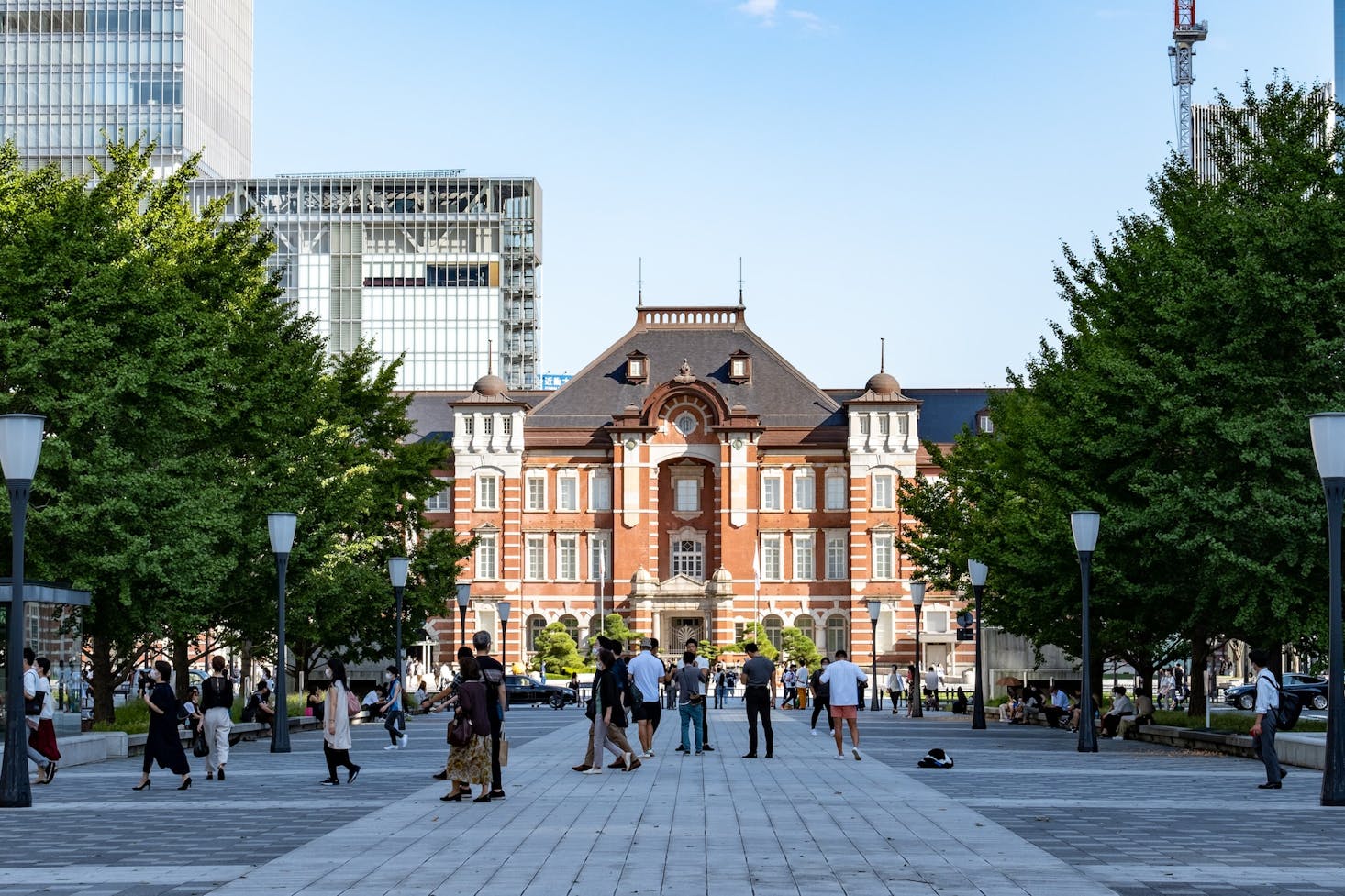
Tokyo is filled with skyscrapers, bright lights, and multi-floor arcades. It is the most densely populated city in Japan and one of the biggest metropolitan areas in the entire world. Approximately 37.4 million live in Tokyo, making it an interesting megacity destination.
Tokyo is an understandably busy place. With so many people living here, is Tokyo safe to visit and spend time exploring places like the Tokyo Skytree and Shinjuku Gyoen National Garden? The simple answer is yes. In fact, in November 2022, Japan had 934, 500 International visitors, with many of them passing through Tokyo.
Tourism does wane a bit during typhoon season, June through November, but not so significantly that the city sees a huge lull in tourist activity. Safety measures when visiting should include keeping an eye on the weather and listening to advisories as they are issued regarding a possible natural disaster.
When you do visit Tokyo, ensure your valuables are kept safe when you're out and about exploring this incredible city. Use the Tokyo Bounce luggage storage platform to stow your stuff and walk about with ease.

Love discounts and traveling?
Sign up for our newsletter and get 10% off your next booking.
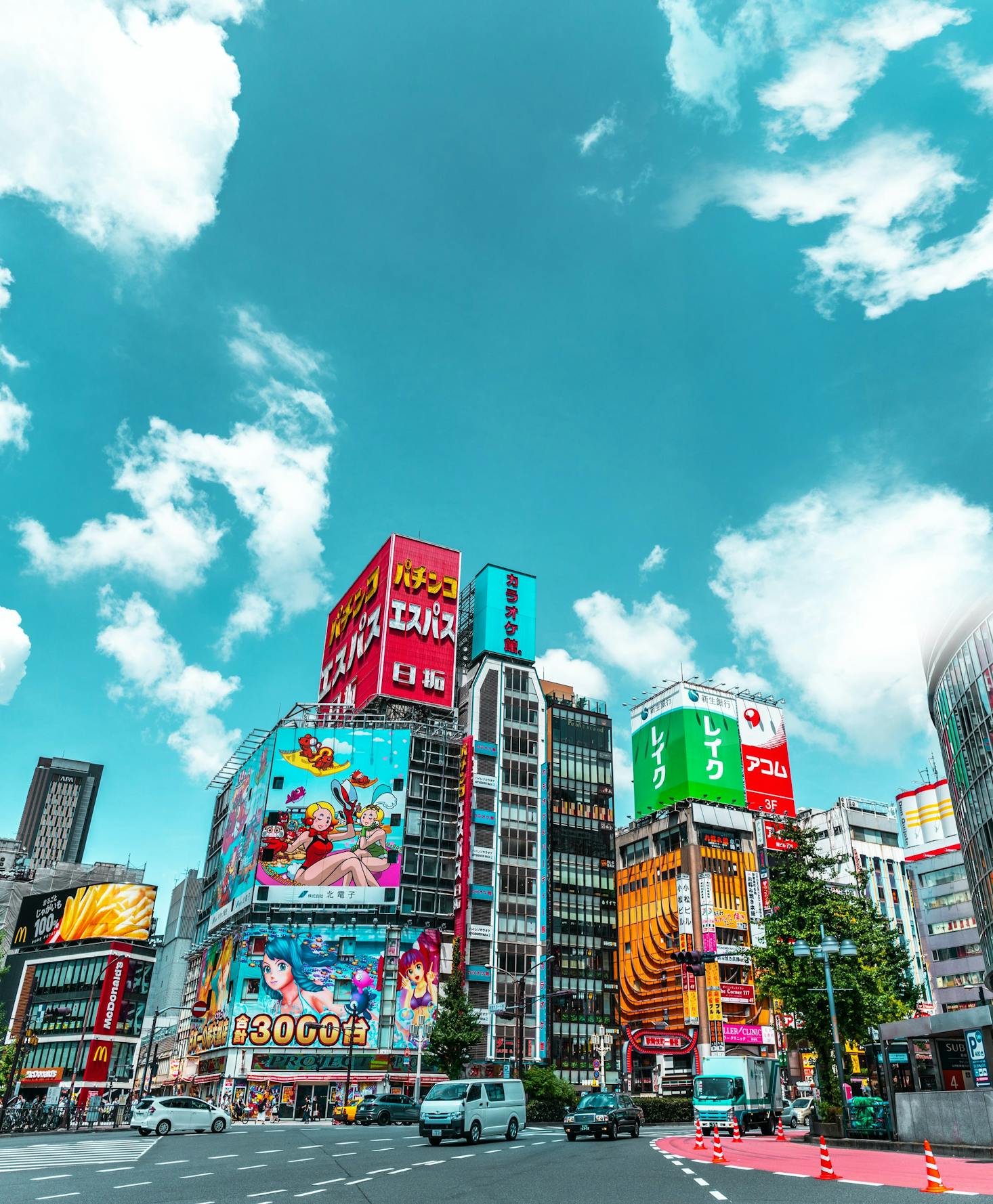
Is Tokyo safe to visit right now?
Even though Tokyo is a hugely populated place, it is a relatively safe city to travel to and learn more about Japanese culture. Presently, the Global Peace Index of Japan is 12, and savvy travelers will be able to easily enjoy their trip while avoiding petty thieves or other street crimes.
Before you plan your trip to Tokyo, check with your government’s official travel guidelines and follow any recommendations listed. You'll also want to view the extended forecast for Tokyo and be aware of any possible storms, the extended forecast will also give you an idea of the seasonal clothing you'll need to pack.
No safety guide is perfect and it's best to research various aspects of Tokyo safety as you get ready for your trip. Experienced traveler or not, being in the know of an unfamiliar city is always a good thing.
Top petty crimes and scams in Tokyo affecting tourists
While Tokyo is one of the safest cities in the world, it is not crime-free, and therefore knowing some of the petty crimes that you might encounter when visiting is an excellent way to keep yourself safe.
Petty theft
Whether pickpocketing, purse snatching, or shoplifting, petty theft occurs in this massive city. When you're out in a crowd or riding public transport keep your wallet or handbag close and if you happen to have any shopping bags, keep those in front of you to discourage hands from sneaking inside. Finished shopping and want to see a few sites? Store your items with Bounce and pick them up before heading back to your accommodation.
Credit card fraud is another petty theft that you'll want to report not just to your credit card company but also to the Japanese police. Bicycle theft is on the rise, but if you're not cycling your way through the city you'll not have any safety concerns.
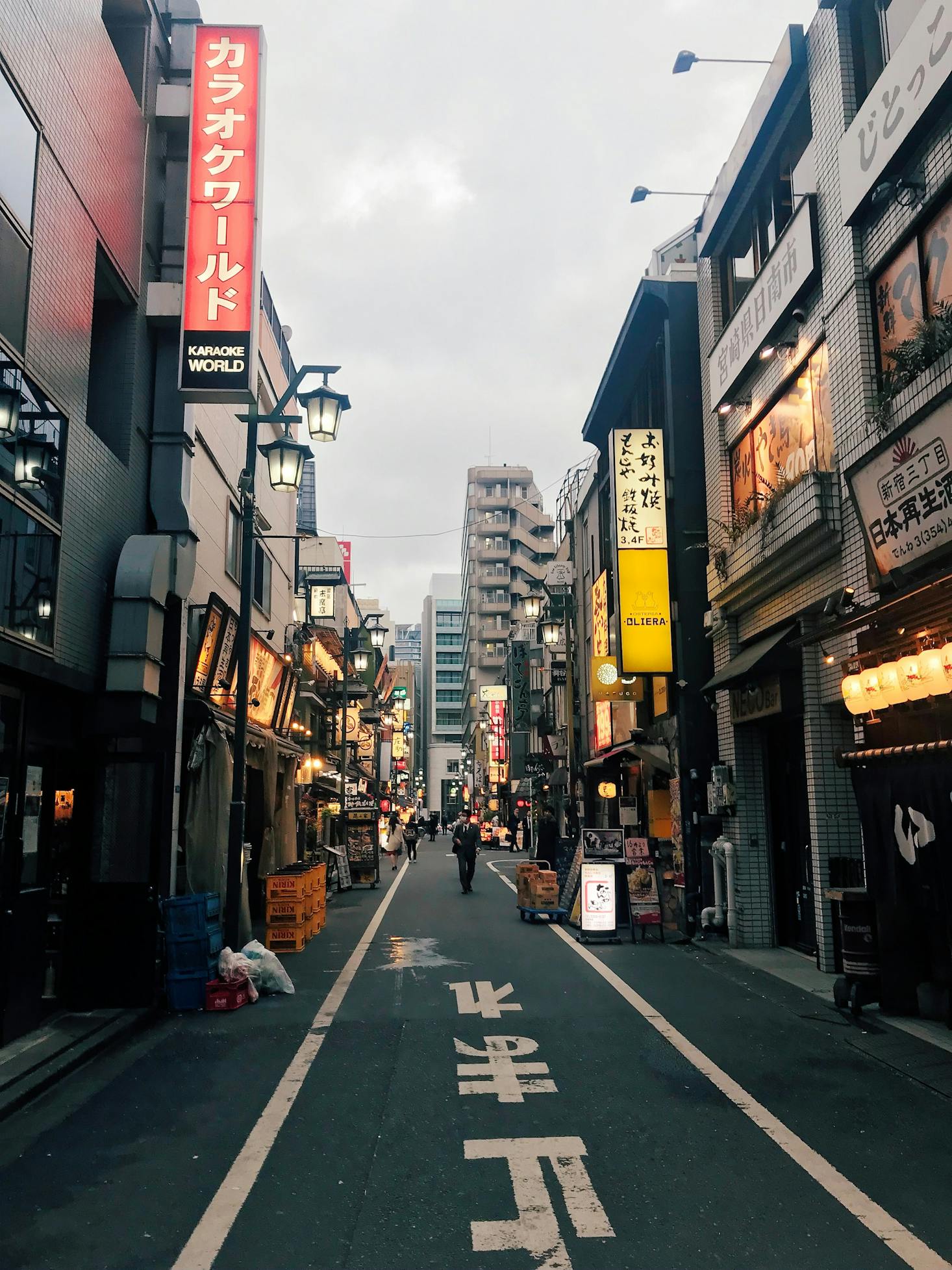
Is Tokyo safe to travel alone
For solo female travelers, Tokyo is safe, but keep in mind that gender equality in Japan is relatively low. The Bounce Women Travel Safety Index has given Japan a rating of 10 on the list of travel-safe countries for solo women travelers.
The rail system in Tokyo even has women-only carriages during rush hour. When traveling alone, trust your instincts and if something seems sketchy or shady, walk away and avoid the situation. There are plenty of districts or neighborhoods that are very safe and tranquil for you to explore, even at night.
Safest neighborhoods in Tokyo
When deciding which of the Tokyo neighborhoods you're going to stay in during your visit you can never be too cautious while doing your research.
For the budget-conscientious traveler, Asakusa is the place to go. It is one of the cheaper neighborhoods in Tokyo. The area has an old-world vibe and is more out of the way from the busyness of the city center. In general, this neighborhood is relaxed and filled with wonderful shops selling traditional handicrafts. Public transport keeps you connected to the hustle and bustle of Tokyo.
While Shibuya is not a super busy neighborhood, it is a popular place to stay. Day or night, there is always something to see and explore. You'll not be bored when you decide to stay here. Filled with tons of trendy cafes and bars, and hip shops, spend time hanging with the locals and getting a feel for the city outside of the craziness of the city center. Don't miss Shibuya Crossing, the world's busiest and most hectic pedestrian crossing area.
Being a well-known neighborhood, Shinjuku is a favorite among tourists and locals. Located in central Tokyo, this is one of the more happening areas that are safe to explore. Skyscrapers create a brilliant skyline and neon lights on the streets produce a vibrant backdrop as you stroll along and check out the sights.
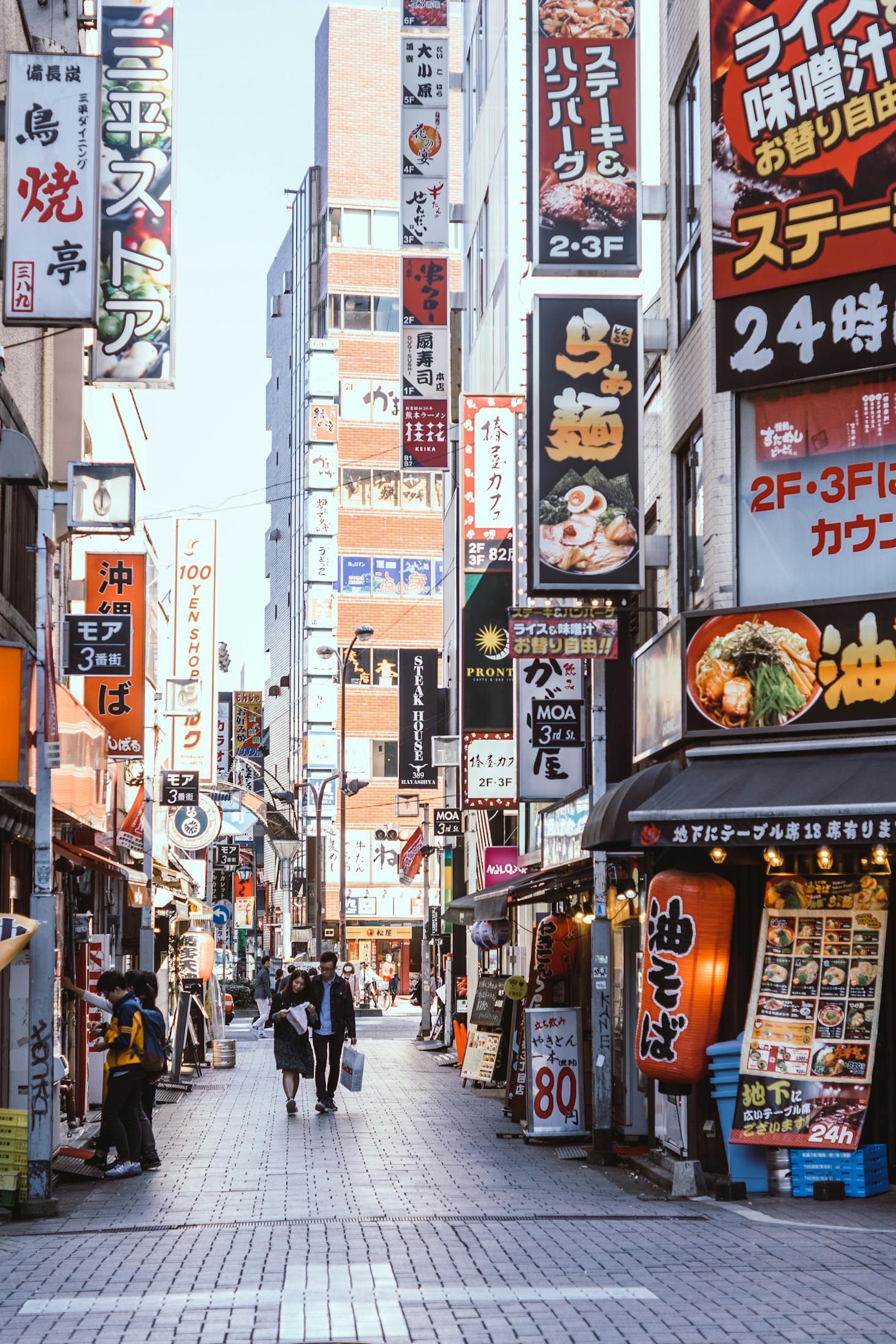
Is Tokyo public transportation safe?
While Uber is a safe mode of transportation, it is actually more expensive than taking a taxi or riding the train. With Uber in Tokyo, you can track your journey and will know the license plate of the car picking you up. You also pay in-app so you don't have to carry cash.
Taxis are definitely safe in Tokyo and are super clean with some taxi drivers even wearing peaked caps and white gloves. If you need to hail a taxi, you'll find plenty of taxis near taxi stands located near some tourist sights, shopping malls, and larger train stations.
Using an app such as Line Taxi or Japan Taxi is another way to get a taxi. Licensed cabs have green number plates and car signs. If the sign is green, that means there is someone in the taxi. Taxis can be expensive, but not as expensive as an Uber.
Public transport is also very safe. There are ten different railway companies operating more than 60 lines and things can get a bit confusing if you're unsure of how things work. Google Maps will become your best friend when trying to figure out the system. It will show you the cheapest or fastest route available.
When using the train in Tokyo you'll want to get an IC card. There are two different IC cards: Pasmo or Suica and either one can be bought at a ticket machine. A station attendant will help you if you're not sure which one you need.
Buses are available as well but if you're in a hurry, the train is much quicker. Buses are not generally used by tourists simply because they are a little confusing. Have your IC card ready and get on at the front of the bus so you can tap your card.
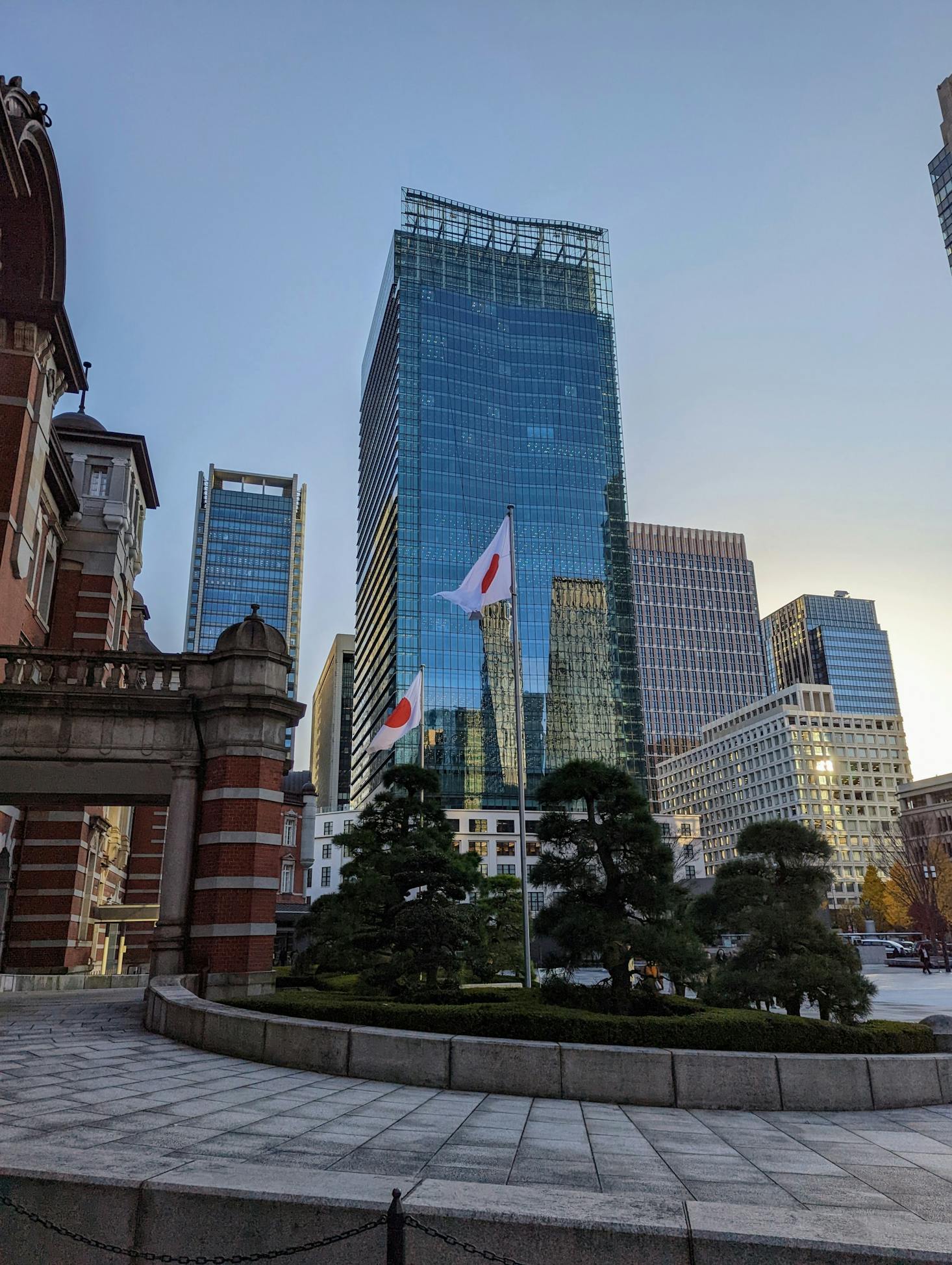
Important emergency numbers in Tokyo
When you a planning a trip to Tokyo, there are some important safety and emergency numbers you'll want to have handy, whether in your phone, with your passport, or kept with your cash or card. Other important information you should keep with your important papers or on your phone is the address and phone number of your country’s embassy.
- Japan’s International Access Code: 010
- Japan’s Country Code: 81
- Tokyo Area Code: 3
- Tokyo Police: 110
- Tokyo Medical Emergency/Ambulance: 119
- Tokyo Fire Department: 119
Staying safe in Tokyo
Japan's capital city is a fabulous place to visit and safety concerns are low. Whether visiting Tokyo for business or pleasure, you'll find that by following safety tips, using common sense, and staying aware of your surroundings you'll be just fine.
From female tourists to families looking for their next adventure, Tokyo is a wonderful destination. Japan is a safe country with little risk for visitors. See exceptional sights like the Nezu Museum and shop to your heart's content at Isetan. Plenty of fun awaits in Tokyo, so don't miss a thing.
Explore the world
Get the bounce app.
Instantly find locations nearby to drop off your luggage wherever you go.
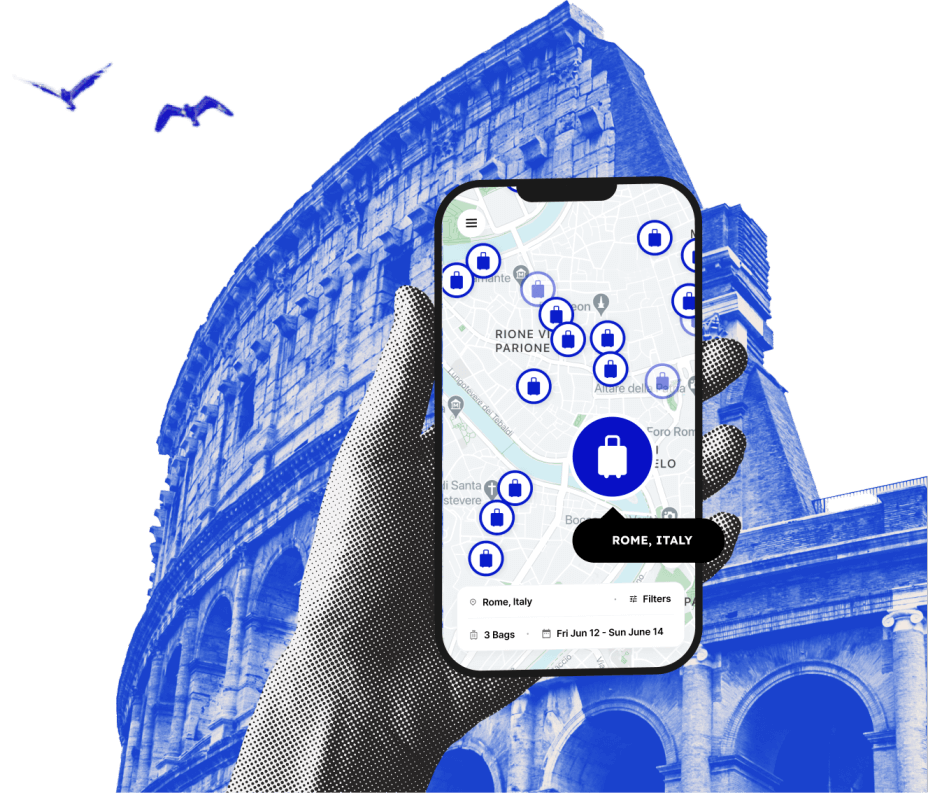
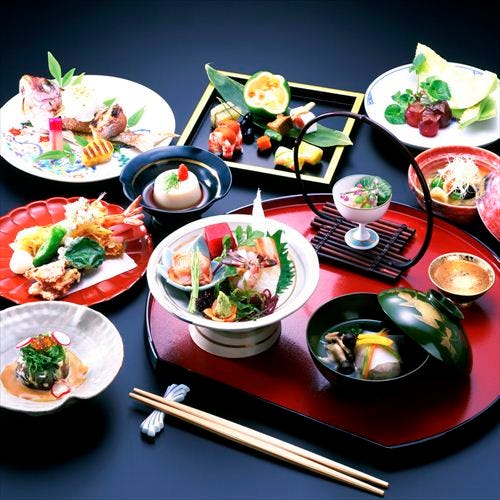
Is Japan Safe to Visit? Complete Look at Which Tokyo Areas Are Safe - And Which Aren’t
People all around the globe have an image of Japan being safe. Indeed, the Global Peace Index (a ranking determined by domestic crime and conflict, war, military budget, and so on) sees Japan on rank 10, a number that leaves no doubt about Japan being safe and peaceful. However, it is also an unpleasant truth that heinous crimes such as murder and theft have become more noticeable. In the unlikely event that you will be affected by such a crime, your positive impression will have been ruined. Let’s take a closer look at Tokyo’s neighborhoods and find out where and what kinds of crimes take place, should you want to avoid the worst places.
Tokyo’s 23 Wards - Ranked by the Number of Crimes

Generally speaking, Tokyo experiences less than 40,000 criminal incidents per year. According to a report about the number of crimes in Tokyo’s 23 wards by the Metropolitan Police Department, most crimes happen in Shinjuku , the western ward with the city’s largest population Setagaya, and Edogawa on the east where a lot of families live. Here are the exact numbers of criminal cases in these wards:
Areas with the Largest Number of Criminal Incidents
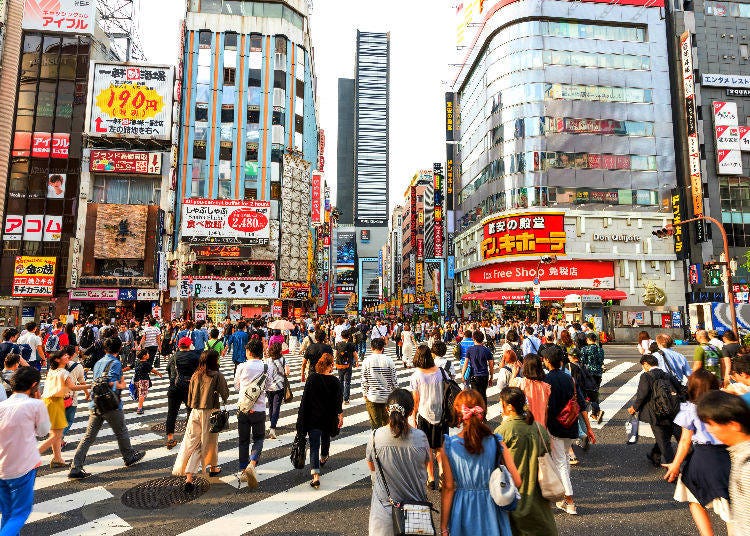
1) Shinjuku : 7,940 crimes in total, a lot of them shoplifting. ( Shinjuku , Shin- Okubo , Takadanobaba area) 2) Setagaya: 7,839 crimes in total, a lot of them burglaries of temporarily vacated houses; a quiet residential area. (Futakotamagawa, Shimokitazawa , Meidaimae, Sangenjaya area) 3) Edogawa: 7,759 crimes in total, a lot of them vehicle break-ins. ( Kasai Rinkai Park , Koiwa, Funabori area) There are subtle differences in the places where these crimes occur. Shoplifting is the most common criminal incident in Shinjuku , which boasts the world’s largest terminal station. Shinjuku Station has the world’s largest number of passengers per day on average, so there’s a plethora of restaurants, bars , and entertainment spots. In an area as crowded as Shinjuku , it is inevitable that a comparatively large number of crimes occur. Be extra careful about your belongings as you explore the amusement area of Kabukicho. Break-ins into empty houses occur particularly often in Setagaya, Tokyo’s ward with the largest population that is also a rather upscale residential area, as well as in Adachi Ward up north. Edogawa in the east has a lot of cases of vehicle break-ins.
Areas with the Lowest Number of Criminal Incidents
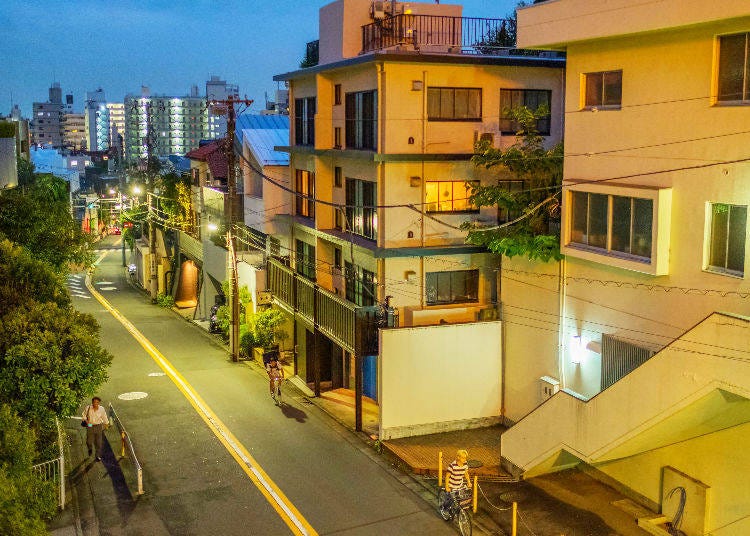
1) Bunkyo: 1,730 crimes in total. (Suidobashi, Ochanomizu, Nezu, Yanaka, Sendagi area) 2) Meguro: 2,354 crimes in total. ( Jiyugaoka , Naka-Meguro , Toritsu-Daigaku, Senzoku, Yutenji area) 3) Arakawa: 2,385 crimes in total. (Nippori, Minamisenju, Mikawashima area) On the other hand, Bunkyo Ward boasts the lowest crime rate in Tokyo. It’s the location of various famous sights and historic locations, such as Tokyo Dome, Koishikawa Korakuen Garden , and Rikugien Garden . It’s followed by Meguro and its neighborhoods of Naka-Meguro and Jiyugaoka , known as great neighborhoods to live in among Japanese people. Third place takes Arakawa, the ward served by the Tokyo Sakura Tram streetcar and its wonderfully nostalgic atmosphere. It is said that Bunkyo Ward has such a low number of crimes because it is home to several educational institutions such as colleges and high schools. Frequent police patrols and neighborhood watches play a big role in crime prevention there as well. Bunkyo is also an area with a lot of “good old neighborhoods” such as Yanesen, as well as sightseeing spots including Nezu Shrine and Yushima Tenmangū. The areas with the largest number of crime incidents, namely Shinjuku , Setagaya, and Edogawa, are also areas with a comparatively high population. Likewise, few people live in the low-crime areas of Bunkyo, Meguro, and Arakawa. Those who do live there are said to be mainly locals born and raised in these parts of Tokyo, which may also have an influence on the low crime rate.
Tokyo: Crime Rate Ranking
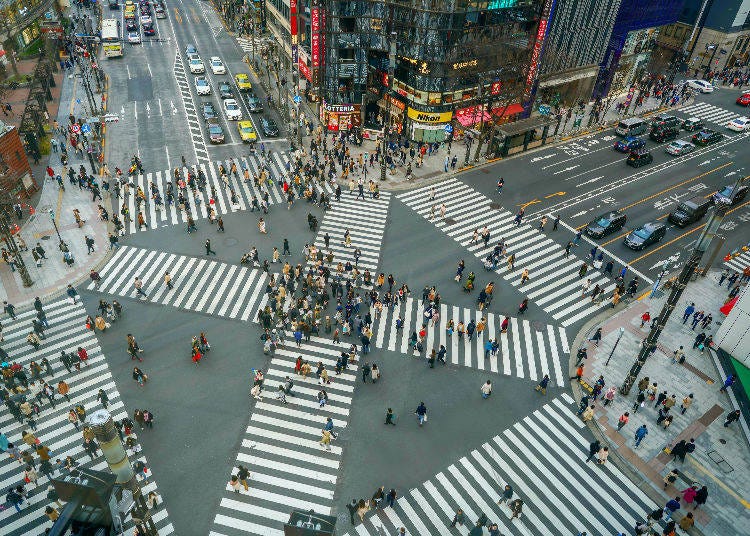
However, it’s natural that areas with a high population also have a higher number of crimes. What likely expresses the state of an area more realistically is the crime rate, which is the ratio at which crimes are committed. If the population is small but the crime rate is high, an area is labeled as dangerous. Let’s take a look at the crime rate in Tokyo’s 23 wards to get a realistic picture, based on information by the Metropolitan Police Department.
Top 3 Areas in Tokyo with the Highest Crime Rate
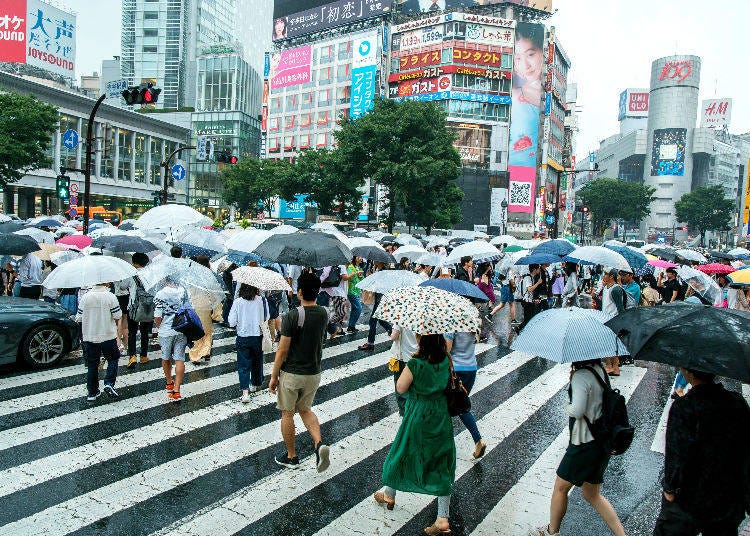
1) Taito (1.26%): Ueno , Asakusa area 2) Toshima (1.10%): Ikebukuro , Sugamo, Mejiro area 3) Edogawa (1.03%): Kasai Rinkai Park , Koiwa, Funabori area Shibuya (1.03%): Shibuya , Harajuku , Ebisu area The ward with the highest crime rate in Tokyo is Taito, which includes the two famous downtown areas of Ueno and Asakusa . It’s also the district with the highest male ratio of all 23 wards. Both Asakusa and Ueno enjoy a large number of international tourists, so it is particularly important to maintain public order and safety. Toshima ranks second, which is where the large downtown area of Ikebukuro is located. A lot of young people from the suburbs gather here to enjoy themselves, which may be a reason for the increasing number of incidents. On the other hand side, such a mixed crowd of people also creates an interesting culture, so if Ikebukuro manages to create an atmosphere of “safe and fun,” it may very well become a new Tokyo trend spot. Edogawa is on the third place and is also the ward with the lowest average age of its residents. Is it the energy of youth or the temperament of an old downtown area? Historically, Edogawa has played a major role in the evolution and development of Tokyo, so a safer daily life is much desired. Tokyo’s wards with a high crime rate tend to be rather representative downtown areas of the city, such as Taito with Ueno and Asakusa , Toshima with Ikebukuro , and Shibuya with Harajuku .
The Top 3 Areas in Tokyo with the Lowest Crime Rate
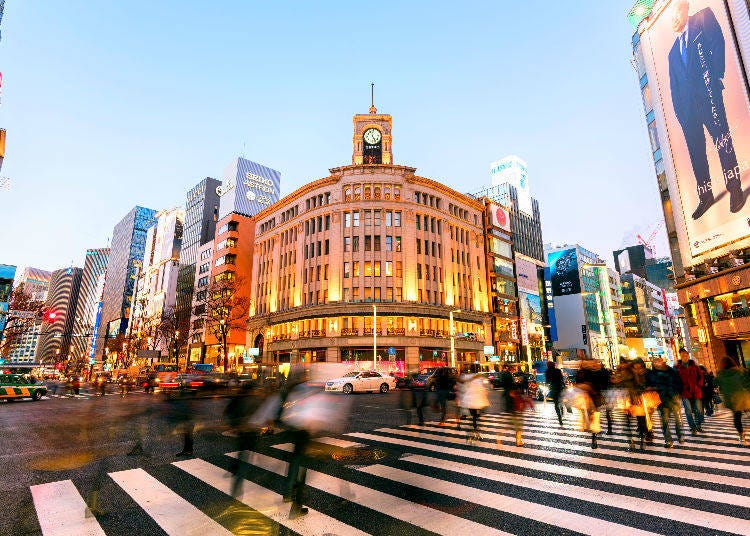
1) Chuo (0.41%): Nihonbashi, Ginza , Yaesu area 2) Chiyoda (0.42%): Yurakucho, Ochanomizu, Kanda, Akihabara area 2) Bunkyo (0.42%): Suidobashi, Ochanomizu, Nezu, Yanaka, Sendagi area Chuo Ward on the first place is an area dotted with high-end shopping districts and office buildings, including Ginza , Nihonbashi, Ningyocho , and Yaesu. Due to various measures taken by the ward, the number of young people moving to Chuo is on the rise as well. It seems like a lot of people are drawn to the district’s long-cultivated upscale feeling and atmosphere. Second place goes to Chiyoda, a ward with several major institutions such as the Imperial Palace and the National Diet Building. That may be a reason as to why the district has such a low crime rate, almost earning it first place. However, Chiyoda also includes downtown areas such as Kanda and Akihabara , as opposed to Chuo Ward where upscale shopping and business areas dominate the picture. This makes it obvious that Chiyoda has a high level of security and order. Chiyoda was also the first ward to forbid smoking on the street, which is another example for its strict measures for public order. Bunkyo on third place is home to Tokyo University, Japan’s highest-ranked college. Next to an abundance of facilities such as schools and hospitals, and even the locals born and raised in Bunkyo are also often very elegant and sophisticated people. The ward has a distinct atmosphere that seems to exude the feeling that crime does not have a chance here. Quiet residential neighborhoods define the ward’s cityscape, boasting nature and feeling inherently safe.
Violent Crimes in Tokyo, Ranked by Number of Incidents
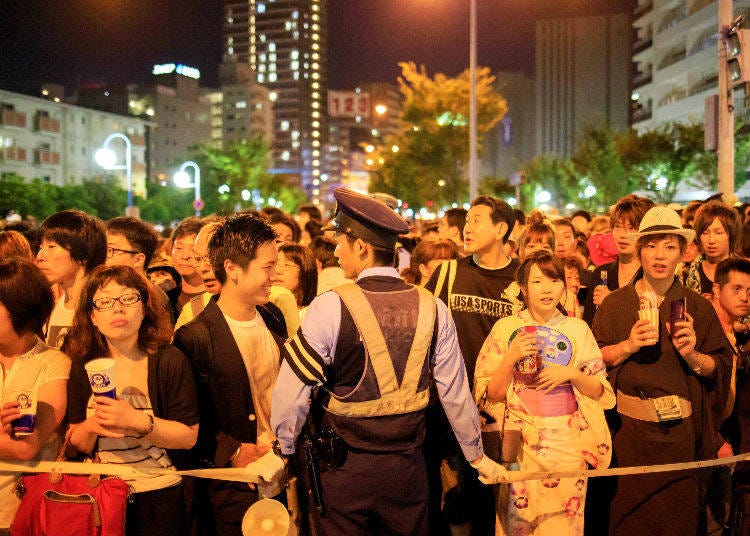
We’re also going to look at the number of violent incidents in addition to criminal incidents and crime rates. How many cases of homicide, robbery, assault, and so on are occurring around Tokyo? To get a better picture of this, we divide Tokyo’s 23 wards into the 77 jurisdictions used by the Metropolitan Police Department and look at the number of violent incidents that occurred in one year within a 20-minute walking distance. We start with the areas with the most violent crimes.
Top 3 Areas in Tokyo with the Highest Number of Violent Crimes
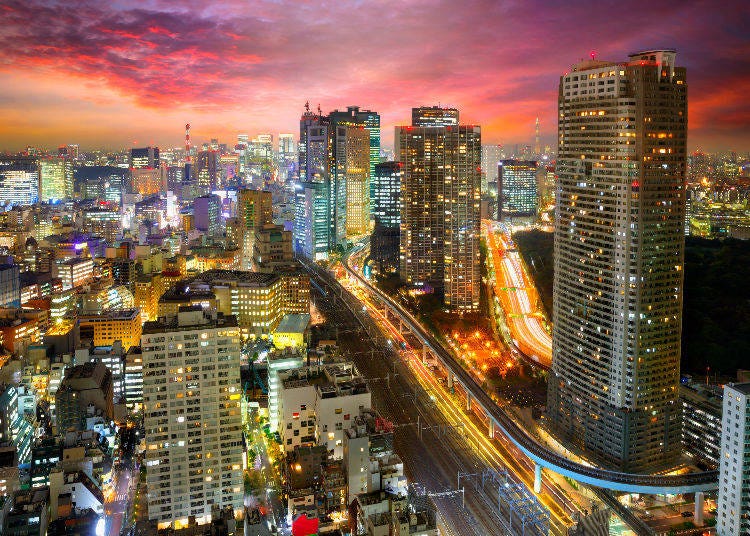
1) Shinjuku Ward ( Shinjuku ): 757 incidents; Shinjuku , Kabukicho, Shin- Okubo area 2) Chiyoda Ward (Manseibashi): 642 incidents; Akihabara , Marunouhi, Kanda area 3) Toshima Ward ( Ikebukuro ): 581 incidents; Ikebukuro , Sugamo, Mejiro area The number of violent incidents is high in areas with a lot of people, such as Shinjuku , Kanda, and Ikebukuro . It is said that there is a correlation between the number of incidents and areas where a lot of ATMs and pachinko parlors can be found. Downtown areas with an abundance of those seem to be more easily affected by a deterioration of security. These downtown areas also feature a lot of entertainment facilities, shops and department stores , as well as bars and restaurants. But even in a safe country such as Japan, be aware of measures for the safety of yourself and your belongings as to not get caught up in an incident. Especially Shinjuku ’s Kabukicho is known as a city that does not sleep, illuminated by neon lights even late at night, but it is also a neighborhood with a high number of violent crimes such as injury cases, blackmail, or assault. Pay attention to your surrounding as you enjoy the nightlife district.
Top 3 Areas in Tokyo with the Lowest Number of Violent Crimes
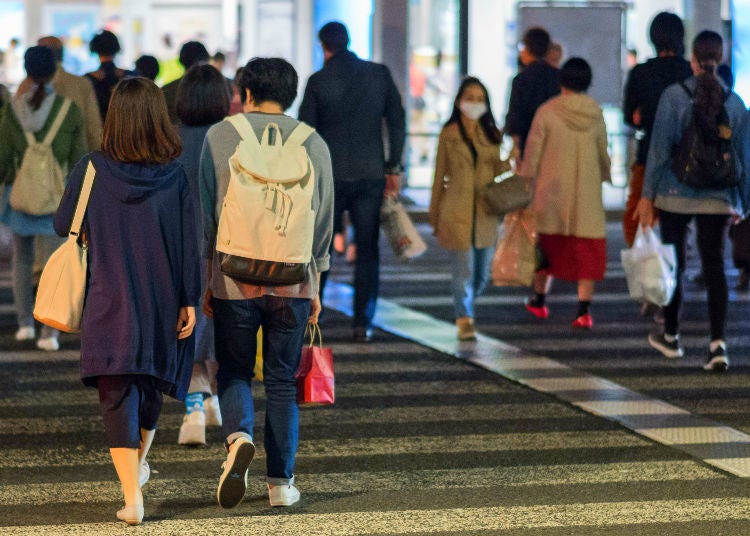
1) Ota Ward ( Haneda Airport ), 13 incidents; Haneda Airport area 2) Minato Ward (Tokyo Wangan), 14 incidents; Odaiba , Ariake, Shin-kiba area 3) Ota Ward (Ikegami), 55 incidents; Tamagawa, Ikegami, Kugahara area Places one and to go to Ota and Minato Ward, defined by Haneda Airport and Odaiba with the Tokyo Bay area respectively. These are areas where few people live and even though they do get crowded with people, violent crimes are few. Additionally, the area around Ota Ward’s Ikegami neighborhood is not too close to the city center, boasting an atmosphere like a historic downtown and acting mainly as a quiet residential district. However, the security situation around the crowded Kamata Station is somewhat concerning, even though it is in the same ward. Safety tends to be better further away from terminal stations, and that is not only true for Ota.
Tokyo Ranking: Where is it Safe, Where Should You be Careful?
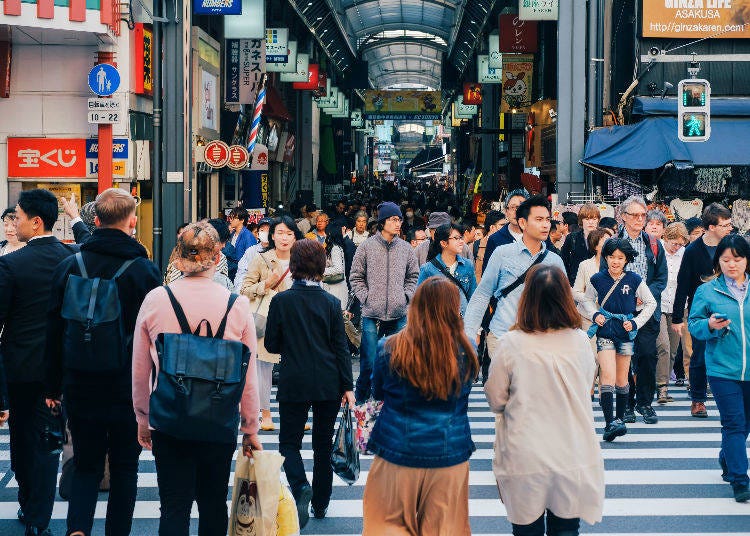
We’re going to take a look at what kind of incidents occur in which part of Tokyo’s 23 wards, to find out which neighborhoods are actually safe. Let’s determine areas that have a high level of security and those that don’t, based on the data of the Metropolitan Police Department.

First up is Shinjuku Ward, one of the areas with the most incidents in all of Tokyo. Where are the areas that are considered dangerous, which of them is the worst? Shinjuku Ward is divided into four areas based on the jurisdiction of the police stations, namely Ushigome, Totsuka, Yotsuya, and Shinjuku .
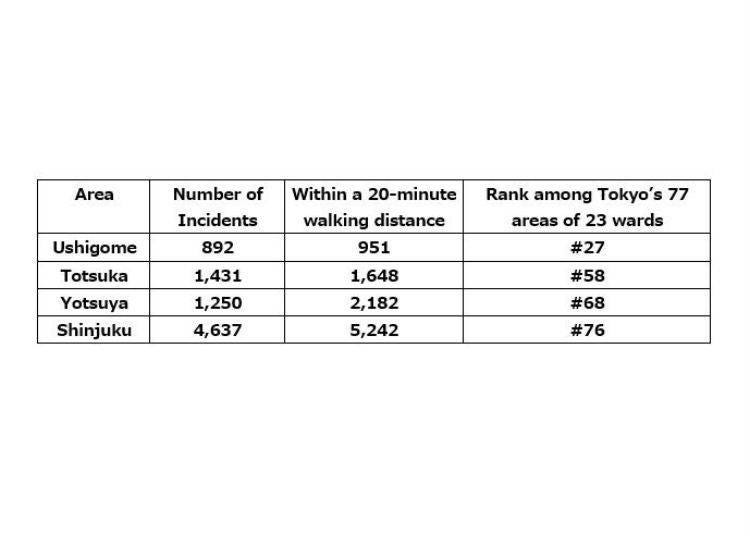
・Ushigome: Akebonobashi, Ushigome Wakamatsu, and the student town of Waseda are eastern areas with many restaurants and sweet shops, boasting a traditional and nostalgic atmosphere. ・Totsuka: a northern area that includes Ochiai, Omokagebashi, and Takadanobaba . Especially the latter neighborhood is famous as the birthplace of the creator of Astro Boy. ・Yotsuya: located in the south and is made up of Shinanomachi, the New National Stadium, as well as Aarakicho with its many eateries that still convey the atmosphere of the town’s former status as a red-light district. Yotsuya Sanchome and Shinjuku Sanchome, dotted with shops and commercial facilities, also belong to this area. ・ Shinjuku : a shopping hot spot centered around Shinjuku Station, Kabukicho (the busiest downtown area in all of Japan), Shin- Okubo and its Koreatown, as well as the Tokyo Metropolitan Government. The number of violent crimes occurring in 1 year within a 20-minute walking distance, by type of incident.
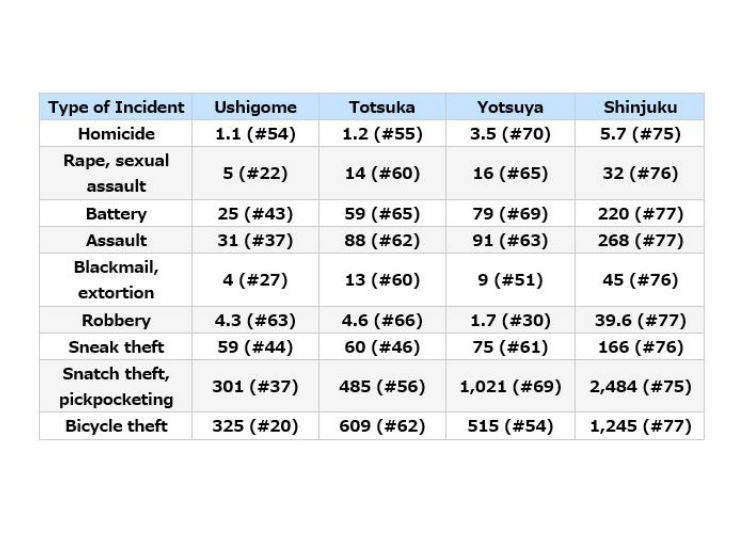
As expected, the number of incidents that occur within a 20-minute walking distance of Shinjuku Ward peak in the flourishing nightlife district of Kabukicho, right in the heart of Shinjuku (around Shinjuku Station). Especially in regard to battery, assault, robbery, and bicycle theft, Shinjuku takes last place among all 77 areas when it comes to safety. The ward boasts a lot of tourist attractions such as Shinjuku Golden Gai, Shinjuku Gyoen National Garden , Koreatown in Shin- Okubo , and ever-exciting Kabukicho. However, visitors should be careful both day and night. On the other hand side, Shinjuku ’s Ushigome area climbs to #27 in overall safety, and there’s very little crime compared to Shinjuku ’s other districts.
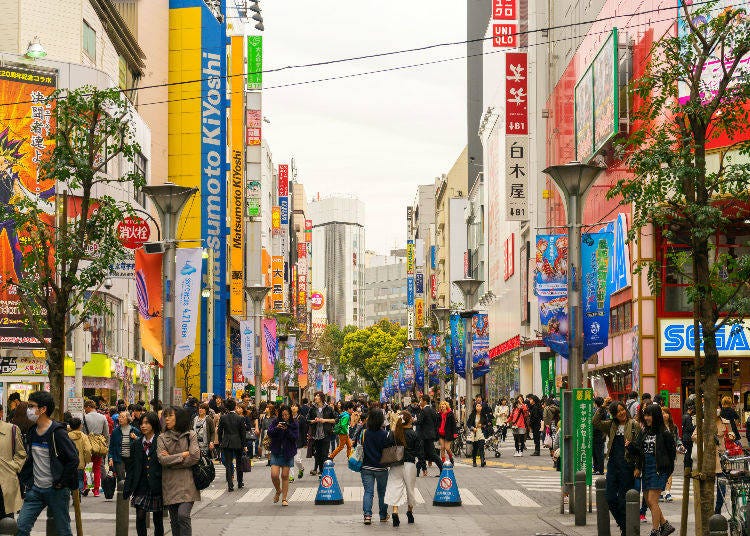
Staying with bustling downtown areas for now, let’s take a look at Toshima Ward next. Ikebukuro and its large terminal station are at the center, while Sugamo and Mejiro are the other two areas that the ward is made up of. The number of violent crimes is quite high in all areas, comparable to Shinjuku .
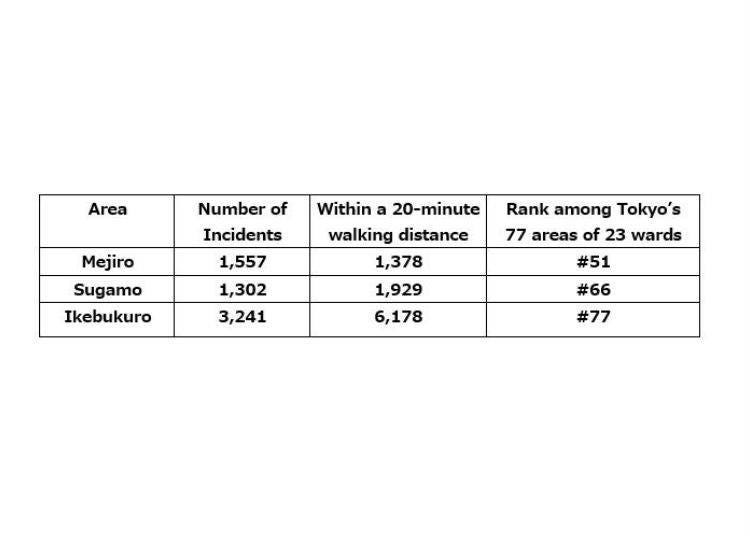
・Mejiro: an area in the west that includes Higashi- Ikebukuro , Zoshigaya, Gakushuinshita, and Mejiro, with the latter being a quiet residential area with upscale property. ・Sugamo: made up of Otsuka, Komagome, Koshizuka, and Sugamo, where a lot of senior citizens live. ・ Ikebukuro : a central area with Ikebukuro Station at its heart that also includes Shimo- Itabashi and Kita- Ikebukuro . The number of violent crimes occurring in 1 year within a 20-minute walking distance, by type of incident.
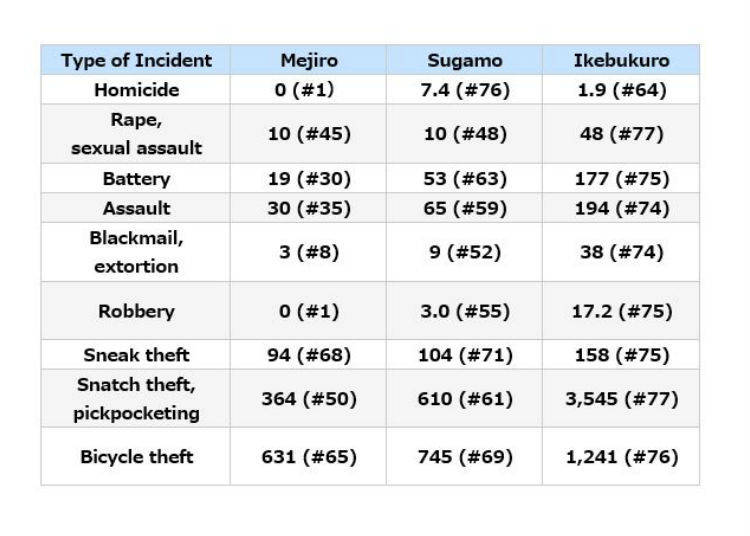
The Ikebukuro area is crowded day and night with many young people and has more criminal incidents than the Shinjuku area. It lands on the lowest rank among all 77 areas in regard to rape, sexual assault, snatch theft, and pickpocketing. It is said that recently, the number of snatch thieves on motorcycles has increased not only in the bustling downtown areas but also in residential neighborhoods. Sugamo, which is popular among Tokyo’s seniors, has a high number of homicides and sneak thefts.
But Which Areas of Tokyo Are the Safest?
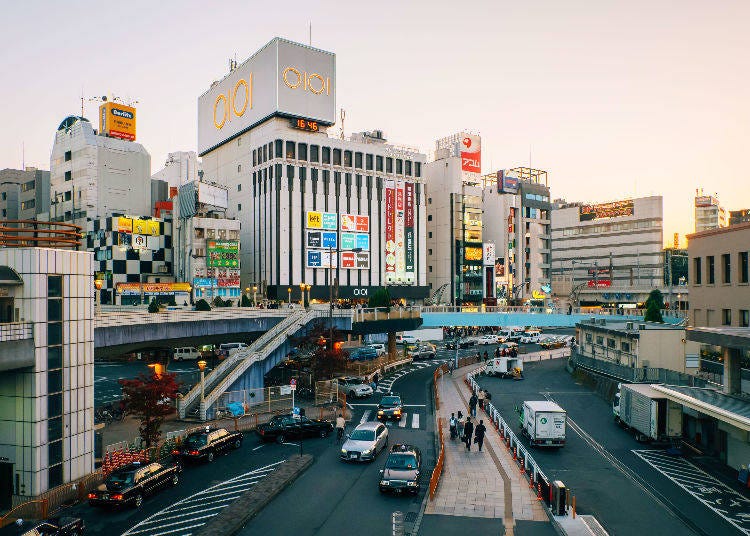
Tokyo’s Safest Area #1: Ota Ward, the Largest Ward of the City #1 Haneda Airport , #3 Ikegami, #11 Den-en-chofu If we look at the Metropolitan Police Department’s data in regard to where the fewest criminal incidents occur, we find Ota Ward at the top. Of all 77 areas, Ota’s Haneda Airport is ranked first, with Ota’s Ikegami following on place three, while Ota’s Den-en-chofu is ranked 11th. Ota Ward also is the largest of all of Tokyo’s wards in regard to area. Generally speaking, it is a very safe ward, but it is important to differentiate between truly safe and unsafe places within Ota. It is divided into the four areas of Den-en-chofu, Omori, Kamata, and Ikegami. The number of incidents differs greatly between them (the table excludes #1 Haneda Airport ).
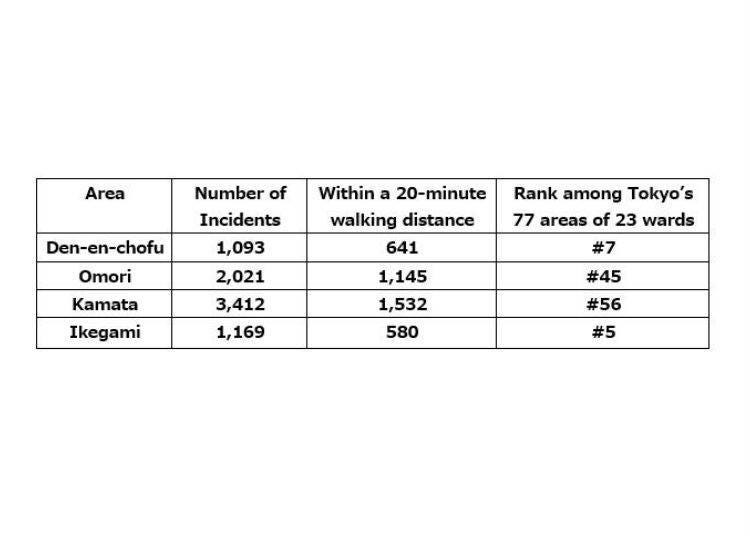
・ Den-en-chofu: an area in the west that includes Okayama , Kitasenzoku, and Den-en-chofu, one of Tokyo’s prime residential neighborhoods. ・ Omori: it faces the sea on its east side, has an abundance of restaurants and bars , and includes Showajima, Heiwajima, and the Tokyo Ryutsu Center. ・ Kamata: a southern area served by three lines, boasting some of Tokyo’s best restaurants. Includes Umeyashiki, Zoshiki, and Kamata. ・ Ikegami: Magome, Kugahara, and Ikegami make up this district, with the latter known for Monzenmachi and Ikegami Honmon-ji Temple . The number of violent crimes occurring in 1 year within a 20-minute walking distance, by type of incident.
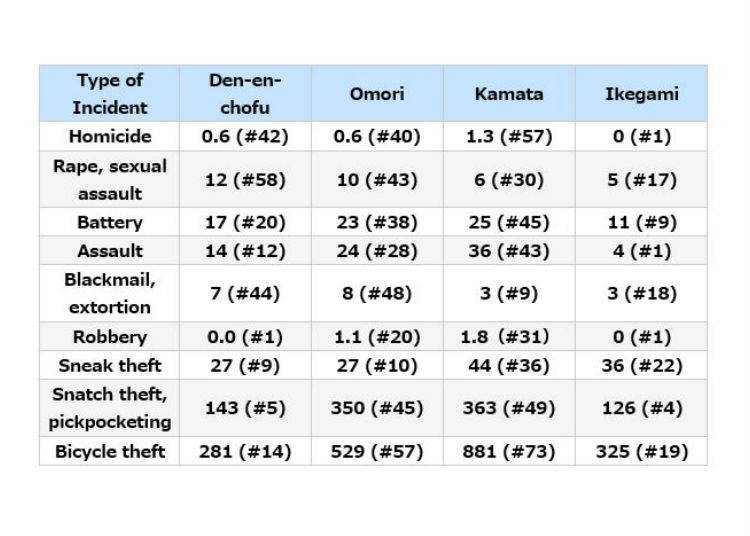
Ikegami is a calm residential area with a lot of families, while Den-en-chofu is known as an upscale residential neighborhood – in both places, the number of criminal incidents is very low. On the other hand, crimes occur considerably more often in Kamata and Omori. Especially bicycle theft is bad in Kamata, making it the 5th worst district in regard to this particular crime. It may not be an exaggeration to say that there’s a good chance that your bike is going to get stolen if you don’t lock it properly. Tokyo’s Safest Area #2: Nerima <@#4 Hikarigaoka, #7 Nerima , #10 Shakujii|b@
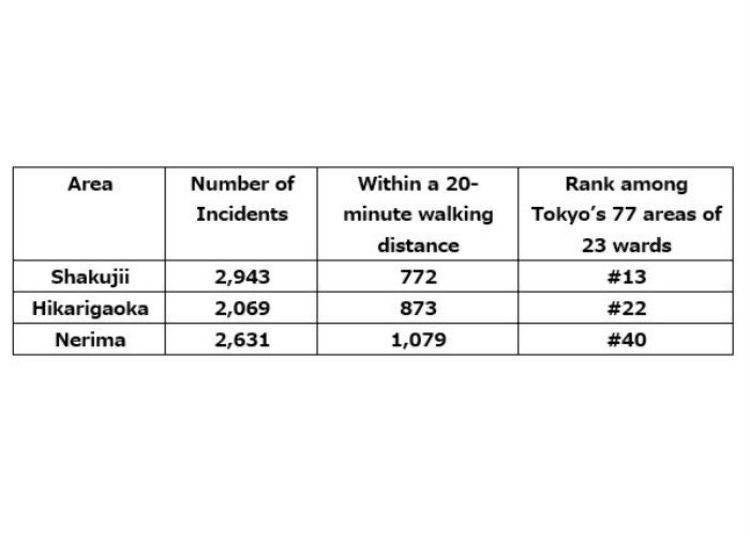
・Shakujii: the picture of a quiet residential area in the west with plenty of parks , gardens , and greenery right at the station, such as Shakujii Park . Includes Musashi-Seki and Oizumi-gakuen. ・Hikarigaoka: a central area with Akatsuka, Nerima -Takanodai, and Hikarigaoka, the first station on the Toei Oedo Line. ・ Nerima : an area in the east with great access to the city center, made up of Heiwadai, Ekoda, and Toshimaen. Served by three lines. The number of violent crimes occurring in 1 year within a 20-minute walking distance, by type of incident.
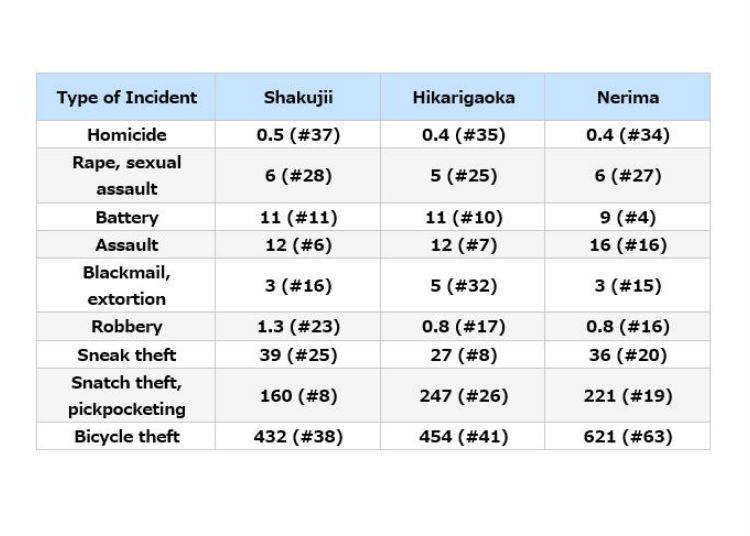
None of the three areas of Nerima Ward has particularly high crime numbers compared to Tokyo’s other 77 areas, no matter what incident we’re looking at. This is especially surprising because it is one of the most populated wards. Usually, there’s a correlation between the number of people in an area and the number of crimes, but Nerima seems to be an exception. It’s popular as a residential area especially among families, but also known as a nice and safe neighborhood for singles.
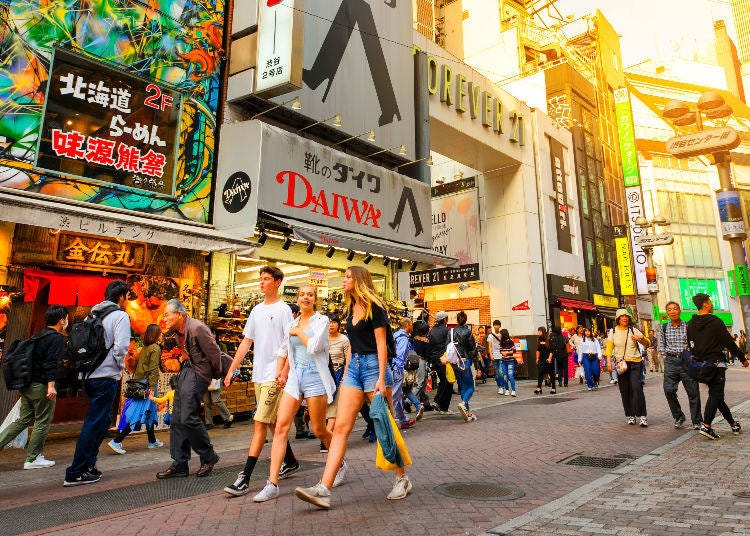
Looking at the data of the Metropolitan Police Department, it’s easy to see which specific areas are labeled as safe and what counts as a “bad neighborhood.” There seems to be a tendency of a higher number of criminal incidents in areas with terminal stations, especially those that have a lot of restaurants and bars . However, residential areas aren’t automatically safe as snatch and bicycle theft can be quite frequent. As you plan your sightseeing trip and try to find accommodations, it can be useful to check the areas that you’re particularly interested in! Source: Metropolitan Police Department, Mansion Market Lab (マンションくらし研究所)

- Area Tokyo Station
Share this article.
Limited time offer: 10% discount coupons available now!
Recommended places for you.

Tokyo Tower
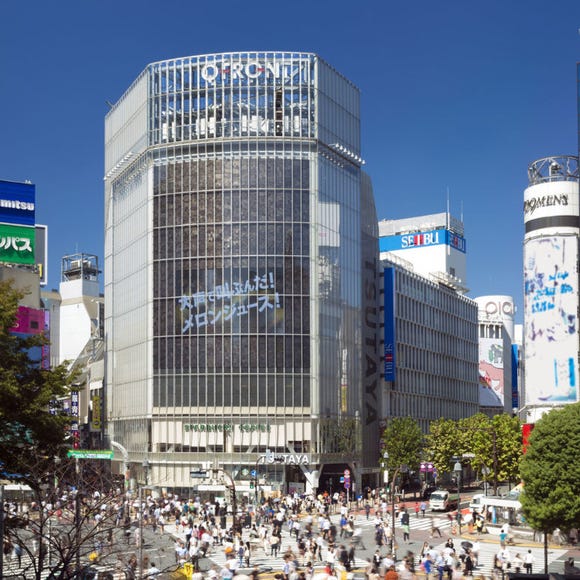
Shibuya Crossing

Tokyo Disney Sea®
Theme Parks
Chiba Suburbs
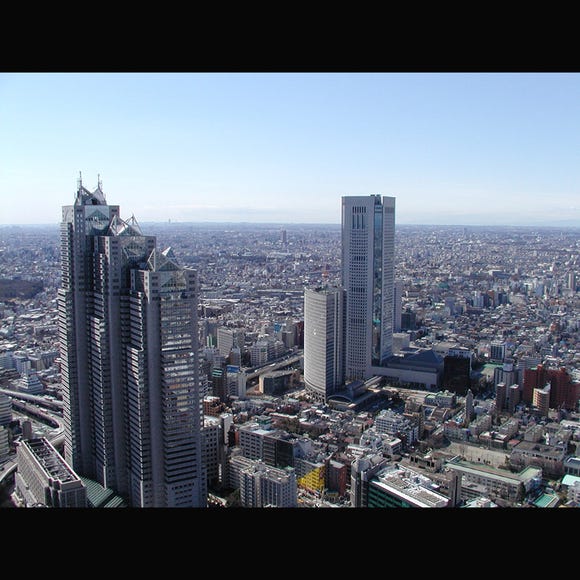
Tokyo Metropolitan Government

Ameyoko Shopping Street
Old Towns (Shitamachi)

Senso-ji Temple

Complete Guide to the JR Hokuriku Arch Pass: Your Key to Kanazawa, Fukui, and Japan's Coastal Wonders

Tokyo Summer 2024: Snooze with Snorlax in a Pokémon Sleep Suite!
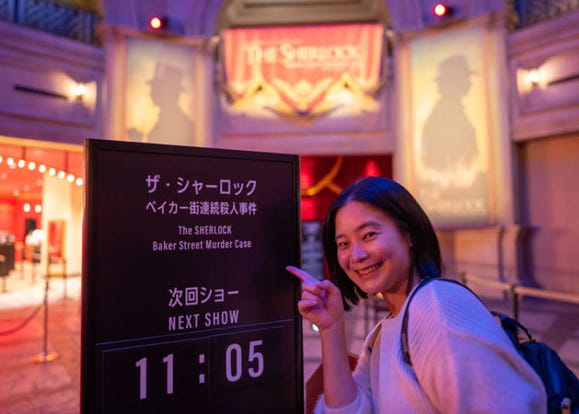
Step Into the Story: Inside Immersive Fort Tokyo
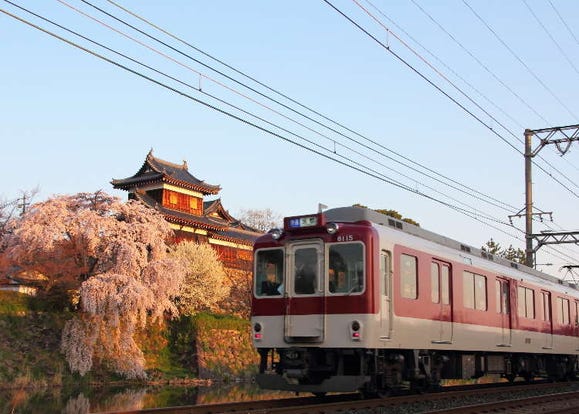
The Complete Guide to the Kintetsu Rail Pass
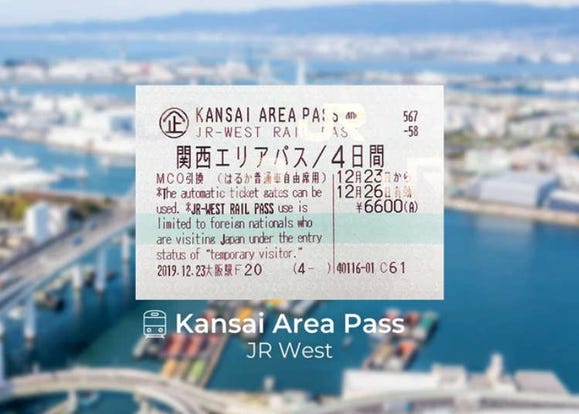
A Complete Guide to the JR West Kansai Area Pass

What to Do in Tokyo in June 2024: Roundup of Tokyo Area Events and Festivals
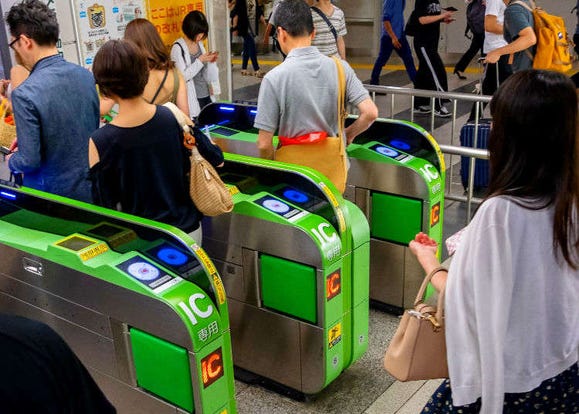
JR Edition: Visit all of Tokyo in one Day with the Tokyo Metropolitan District Pass!

15 Must-Try Ueno Restaurants: From Wagyu Beef and Unagi to Sushi - Plus, New Culinary Hotspots
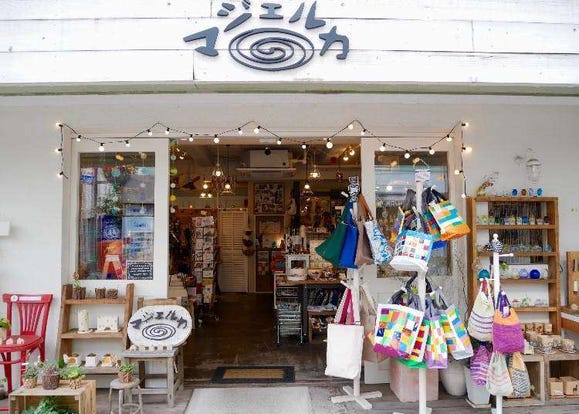
Kichijoji – Explore Tokyo’s Top-Rated Stylish Suburb in Half a Day!
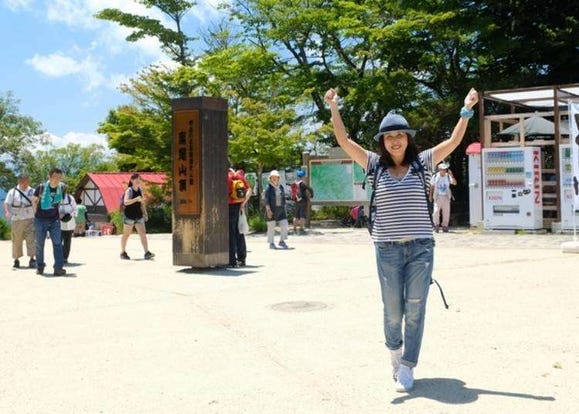
Have the Perfect Summer in Tokyo: Fun Things to Do, Eat & More
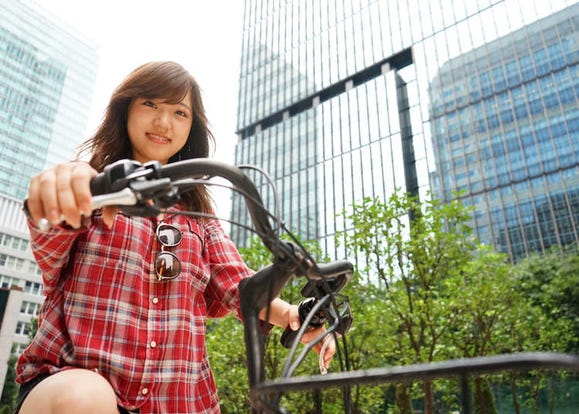
Bicycling Tour of Tokyo: 3 Sightseeing Cycle Guides for Seeing Tokyo this Spring!
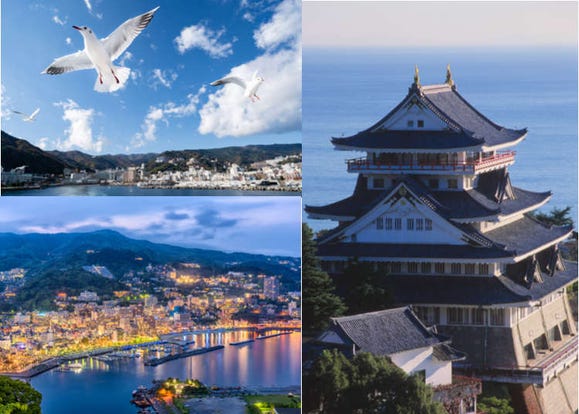
Atami 1-Day Itinerary: Exploring Japan's Castle & Hot Springs Resort Town Near Tokyo!
- #best ramen tokyo
- #what to buy in ameyoko
- #what to bring to japan
- #new years in tokyo
- #best izakaya shinjuku
- #things to do tokyo
- #japanese nail trends
- #what to do in odaiba
- #onsen tattoo friendly tokyo
- #best sushi ginza
- #japanese convenience store snacks
- #best yakiniku shibuya
- #japanese fashion culture
- #best japanese soft drinks
- Meet the Team
- Work with Us
- Czech Republic
- Netherlands
- Switzerland
- Scandinavia
- Philippines
- South Korea
- New Zealand
- South Africa
- Budget Travel
- Work & Travel
- The Broke Backpacker Manifesto
- Travel Resources
- How to Travel on $10/day
Home » Asia » Travel Safety
Is Japan Safe for Travel? (Insider Tips)
The land of cherry blossoms and Shinto shrines, clean cities and video-games, Japan is a cultural force to be reckoned with.
Japan is as much a cultural epicenter as it is one for natural disasters. From frequent earthquakes to notorious tsunamis and a shockingly high number of nuclear power plants, there are things that certainly raise a few eyebrows in Japan. So, you may ask, “Is Japan safe?”
It is a valid question and the reason we have created this truly epic insider’s guide into staying safe in Japan. I believe that everybody should be able to travel smart anywhere in the world, even “safe” countries, and so I’m here to help.
I am going to be covering a whole lot of ground in my handy guide. I mean it. That means just about everything from the safety of public transport in Japan, to what to do in case a rogue bear attacks, and whether it’s even safe to drive in Japan. I’ll definitely cover whatever your concern is.
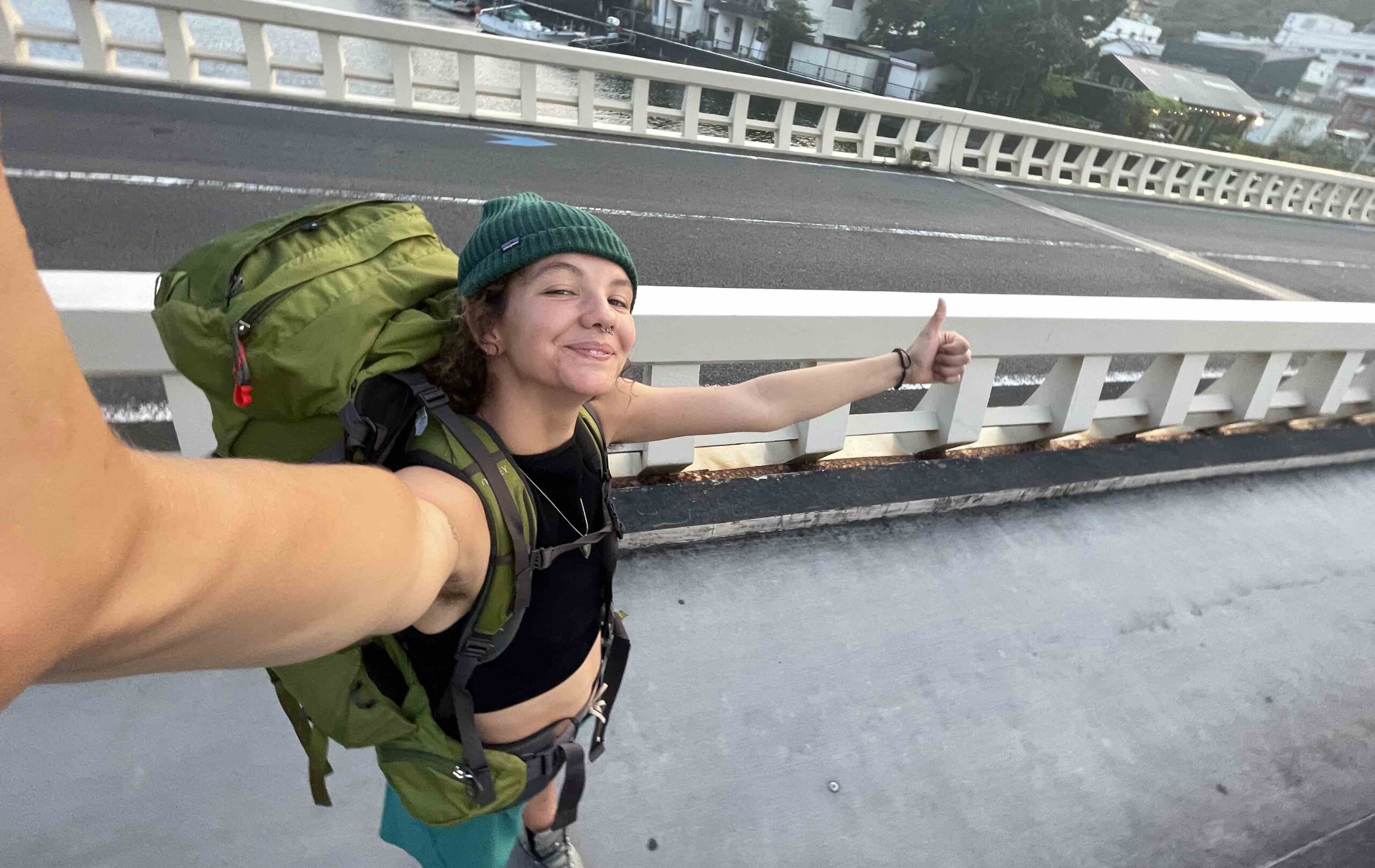
The Broke Backpacker is supported by you . Clicking through our links may earn us a small affiliate commission, and that's what allows us to keep producing free content 🙂 Learn more .

Unlock Our GREATEST Travel Secrets!
Sign up for our newsletter and get the best travel tips delivered right to your inbox.
How Safe is Japan? (Our take)
Is japan safe to visit right now, safest places in japan, 19 top safety tips for traveling to japan, is japan safe to travel alone, is japan safe for solo female travellers, more on safety in japan, faq about staying safe in japan, so, is japan safe.
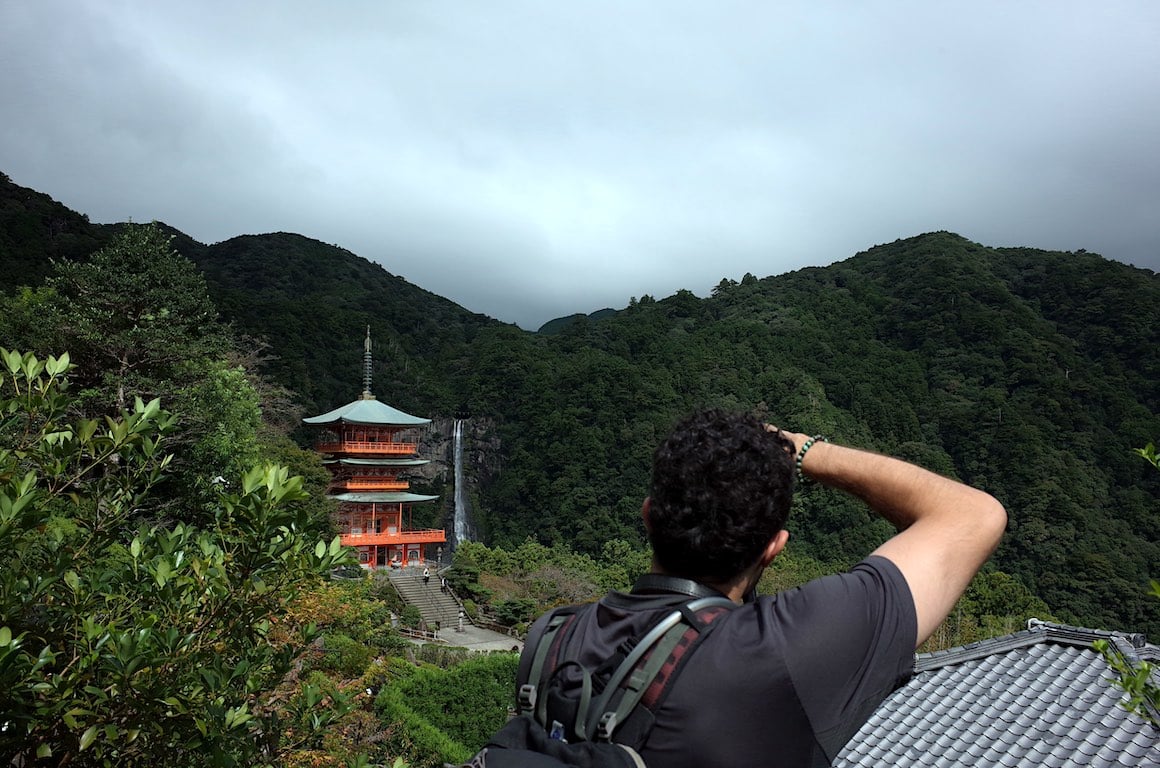
Travel to Japan is amazing if you want a unique destination to explore. A literal wealth of culture awaits you in this incredible country. Not only that: ancient paths to hike, tropical seas to bathe in, and mountains to ski. Japan has it all.
But all this natural beauty comes at a price. Natural disasters are a frequent occurrence in Japan.
We’re talking earthquakes – a lot. With earthquakes comes the threat of tsunamis. These can be devastating.
Heavy rains can bring flooding and landslides. Oh and typhoons as well, which can pretty brutal.
That, however, is just the mandatory disclaimer. Travel in Japan is unbelievably safe. Crime is low at the best of times and almost non-existent for a foreigner.
Even in regards to the natural disasters, though devastating, Japan is such a highly-developed country with such advanced infrastructure that the statistical likelihood of losing your life on a two-week holiday in Japan is very unlikely.
Aside from seismic activity… The fact remains that Japan really is one of the safest countries in the world. However, It’s always wise to be prepared for the unexpected. Investing in a reliable travel insurance ensures you can explore with peace of mind.
Oh, you’ll also want to get hold of a specific Japan travel adapter to make sure all your devices charge safely too.
There is no such thing as a perfect safety guide, and this article is no different. The question of “Is Japan Safe?” will ALWAYS have a different answer depending on the parties involved. But this article is written for savvy travellers from the perspective of savvy travellers.
The information present in this safety guide was accurate at the time of writing, however, the world is a changeable place, now more than ever. Between the pandemic, ever-worsening cultural division, and a click-hungry media, it can be hard to maintain what is truth and what is sensationalism.
Here, you will find safety knowledge and advice for travelling Japan. It won’t be down to the wire cutting edge info on the most current events, but it is layered in the expertise of veteran travellers. If you use our guide, do your own research, and practise common sense, you will have a safe trip to Japan.
If you see any outdated information in this guide, we would really appreciate it if you could reach out in the comments below. We strive to provide the most relevant travel information on the web and always appreciate input from our readers (nicely, please!). Otherwise, thanks for your ear and stay safe!
It’s a wild world out there. But it’s pretty damn special too. 🙂
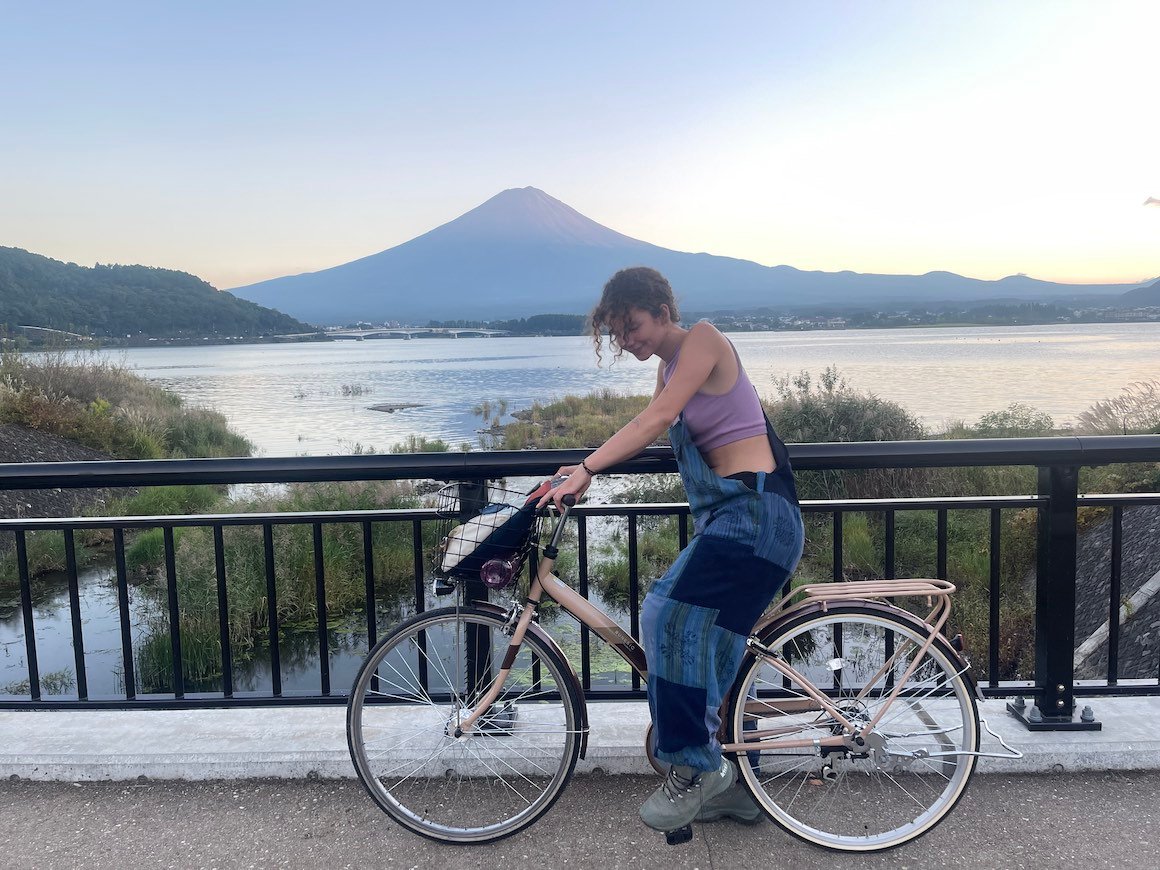
Absolutely, Japan is safe to visit – without a doubt.
And, naturally, a whole LOAD of people enjoy their majestic safe travels to Japan. There were over 28 million visitors to Japan each year. For 99.9% of all statistical normies, Japan is safe.
When we talk about anything outside of ‘acts of God’, Japan is ridiculously safe to visit. Ridiculously! Leave your bag in a restaurant and walk around at night alone. It’s pretty much all good. No hassle. You’ll even see young children travelling home by themselves on trains.
It’s so safe that often Japanese people are just… asleep on trains. You’ll see that a lot. It’s a sign that people have nothing to worry about – at least in terms of safety.
The Global Peace Index (2021) ranked Japan 12th out of 163 countries . That’s just below Singapore. But honestly? We’d say that it’s safer than a lot of the countries ranked above it.
Pretty much all of Japan is safe. That being said, choosing the right area to stay in Japan can make or break your trip. To help you out, we’ve listed our favorite ones below:
Kyoto is the historical and cultural center of Japan. It is where you will find most of the most famous sites in all of Japan. A trip to Japan isn’t complete without wandering around the famous sites of Kyoto and checking these fabulous sites off your bucket list.
We’ve said it many times before, but since Japan is pretty much safe anywhere, you can expect plenty of security and safety in Kyoto as well.
It’s best to rent a bicycle when visiting the city so you can easily get to all the sites but public transportation is also amazing. Make sure you spend quality time at the Arashiyama Bamboo Forest and at the lovely gardens at the Okochi Sanso. Those are located in the West part of the city in the Arashiyama district.
Tokyo
Of course, we can’t forget about Tokyo! The city where you can do absolutely anything and everything . Tokyo is home to restaurants where you can dance with cyborgs or you can hang out with animals at pet cafes. You can also ride in a real-life Mario Kart in Akihabara! Take the Tokyo streets by storm in this real-world Mario Kart experience. You even get to dress up as the characters, as they do provide costumes.
Tokyo has it all. There are so many different districts to visit that it can feel overwhelming. You can walk around Giza for upscale shopping and incredible sushi or you can visit Asakusa to get a hefty dose of history and culture. Nakameguro is the hipster neighborhood, and Akihabara is where all the anime and gaming happens.
And the best thing about it, all these neighborhoods are safe! Including the cheapest of Tokyo’s hostels .
Kamakura is a lovely coastal town that has an abundance of gardens and temples. It’s also home to the Great Buddha, Daibutsu. This seaside Japanese city is actually just a bit south of Tokyo. You can do it as a day trip from Tokyo but it’s better to spend some quality time there to soak up the peaceful vibes and to save some bucks!
What we love about Kamakura the most, besides the opportunity to save some dough, is the dozens of Buddhist Zen temples and Shinto shrines that are so incredibly tranquil. Also, if you were in need of a little adrenaline rush, Yuigahama Beach is a fun place to go surfing. Even if you just needed some time relaxing on the sand, Yuigahama Beach is the place to do it.
Places to avoid in Japan
To be honest, there aren’t any dangerous places in Japan. Certainly not in the city. If you’re hiking or going more towards the countryside, simple common sense should keep you perfectly safe.
Just as an overall warning though: Avoid any areas that seem sketchy. That includes dark side streets and areas without any tourists. If it doesn’t look welcoming, stay away! And of course, just stay aware of your surroundings at all times.
Chances are, you’ll have absolutely no issue in Japan. Even looking for trouble can be a bit of a mission, that’s how safe it is.
Japan Travel Insurance
ALWAYS sort out your backpacker insurance before your trip. There’s plenty to choose from in that department, but a good place to start is Safety Wing .
They offer month-to-month payments, no lock-in contracts, and require absolutely no itineraries: that’s the exact kind of insurance long-term travellers and digital nomads need.

SafetyWing is cheap, easy, and admin-free: just sign up lickety-split so you can get back to it!
Click the button below to learn more about SafetyWing’s setup or read our insider review for the full tasty scoop.
Seriously: Japan is super safe! No matter where in Japan you stay , you will feel secure. Like, there’s so much about this country that makes it so stress-free to travel around.
Japanese people are incredibly kind to foreigners and also quite shy; it’s rare to ever feel like a Japanese person is intruding on your personal space. You won’t really have to worry about crime in Japan.
It still does exist, however. And alongside what little crime there is, the natural world can be a scary place in Japan. Make sure you read on our safety tips for travelers.
- Be sensible – Even though Japan is safe, you might want to avoid areas that seem sketchy. Things can still happen.
- Stay prepared – Like you would in any other country. Don’t let your guard down completely because Japan is usually safe. Taking precautions like separating your money in different caches (like in a money belt) keeps you from getting screwed by petty crime or just being forgetful.
- Take care in ‘seedy’ areas – Bar areas in the Tokyo areas of Kabukicho and Roppongi, for example, are known for scams, drink spiking, and sexual assault.
- Don’t do drugs – It’s very illegal in Japan. And hard to get. Unless you have good local friends, you may find yourself inadvertently bartering with the Yakuza .
- Don’t follow touts to bars – Most likely you’ll be led to the sort of place we warned against in the last tip. At the very least, you may be regretful surprised by an enormous cover charge.
- Tattoos are iffy – Although it’s becoming more accepted, tattoos have traditionally been stigmatized in Japan due to their connection with the Yakuza. However, the foreigner card, as always, is always the ultimate trump card. You’ll have no issues 90% of places (including onsen ).
- Watch out crossing railway lines – You’ll have to cross lines in towns and cities. Make sure you aren’t caught between the barriers. It’s hard to miss the wailing Anime-girl alarm though.
- Learn some Japanese – Numbers, greetings, please, and thank yous are lapped up by the locals.
- Get a translation app – Google Translate can be a lifesaver.
- And use Google Maps for trains – There are also some apps purpose-built for Japan’s public transport system.
- Be respectful – Especially to older people. Bowing is where it’s at. And take your shoes off if you’re going in someone’s house.
- Don’t get carried away in public – The Japanese traditionally maintain a reserved nature in public. That said, when the gloves come off and it’s party time, the socially-normative inhibitions go right out the window.
- Avoid rush hour – Especially if you’re taking the train. Is rush hour dangerous in Japan? No… Is it worth it…?
- Prepare for the weather – Winters are cold and the summers are hot. A winter travelling in Hokkaido really isn’t all that far from Russia after all.
- Watch out for bears when hiking – Noise – be it loud stomps, a speaker, or a anti-bear bell, are all strong recommendations.
- And watch where you step – Snakes are worth worrying about. A bite from the major type, mamushi, typically results in hospitalization.
- Stick to marked trails when hiking – Same as you’d do anywhere. Going ‘off-piste’ can lead to getting lost, injury, or worse.
- Know what to do in the event of an earthquake – REALLY important. Download an earthquake app and keep an eye on the news.
- Watch out for the weather – When typhoons hit they can be STRONG. It’s key to stay inside.
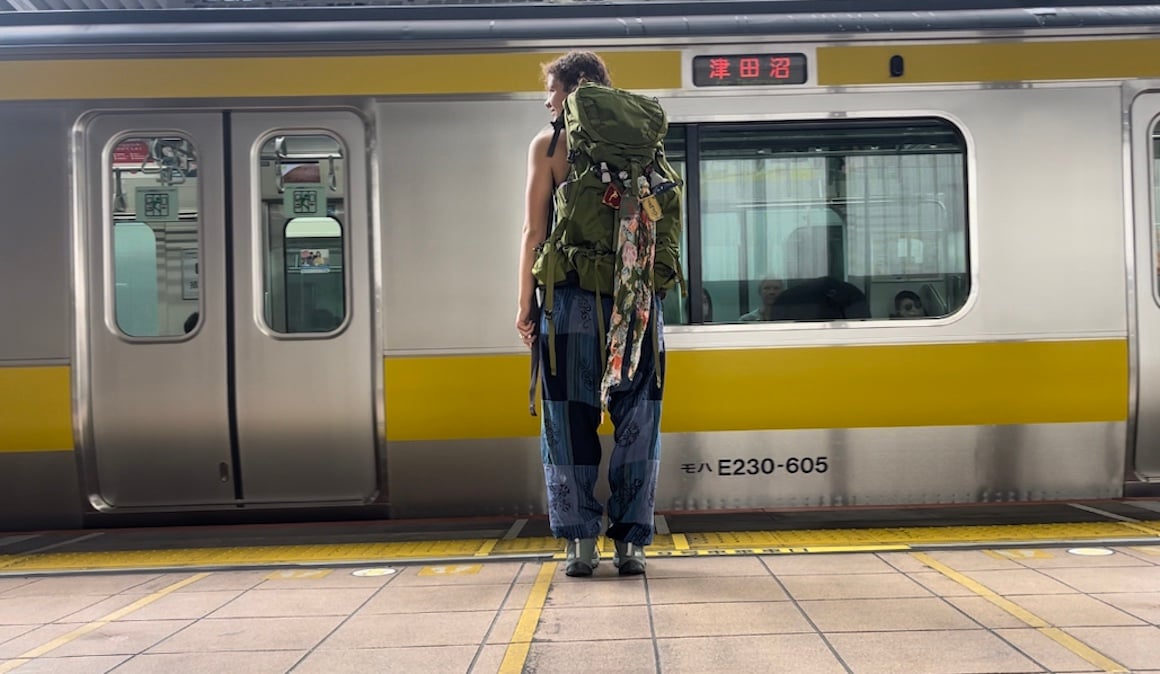
Japan is one of the safest countries in the world, so it goes without saying that it’s going to be very safe for solo travelers too. It’s a safe, solo-friendly place.
You’re going to be able to wander around at night feeling like you’re the last person on Earth. Still, it pays to be knowledgeable, so here are a few solo travel tips for Japan.
- Know when to call it quits when it comes to drinking. Booze is everywhere, and it’s cheap. Be especially careful in touristy bars, where drink spiking can happen.
- Make sure you can get home at night. It’s easy to lose track of time when you’re out and about. Missing the last train in a city means walking, which is long, or getting a taxi, which is expensive in Japan.
- When you’re out hiking, know your limits. The climbs here can be steep and relentless. Do your research and plan ahead. Plenty of people have hiked all over Japan and written extensively about the experience – often complete with photos of the route.
- Meet up with other people. Japan can be a lonely experience and sometimes spotting another backpacker feels like finding a unicorn. The best way to stay connected is to be social and meet people.
- Don’t be afraid to eat out or even drink by yourself in Japan. This is totally normal. It’s a standard post-work de-stressor in Japan (usually coupled with several drinks).
- Keep in touch with people. Your family and friends back home will most likely think you’re doing something pretty cool, so don’t leave them in the dark and go off-the-grid completely.
- Take a tour! A walking tour, a whiskey tour… anything! This will open up the country a little more – since many things you go to see won’t be adequately explained in English. It’s a good way to learn and meet other travelers.
- Figure out a route from the train station, or bus stop, to your hotel ahead of time. If you need WiFi, head to a konbini (convenience store) like 7-11 or Lawson to connect.
- With that in mind, think about picking up a data sim at the airport. Japan’s WiFi sitch is pretty good but there are always times when it’s not around and you really need to check or translate something.
- Book accommodation and bullet train tickets in advance. This isn’t a country where you can just rock up and make a reservation. You will have to book before you arrive so plan ahead.
- Don’t be afraid to ask for help if you need it. People will literally draw a map on a napkin for you if you’re lost and write down the connections you need to make if you’re not sure about the train.
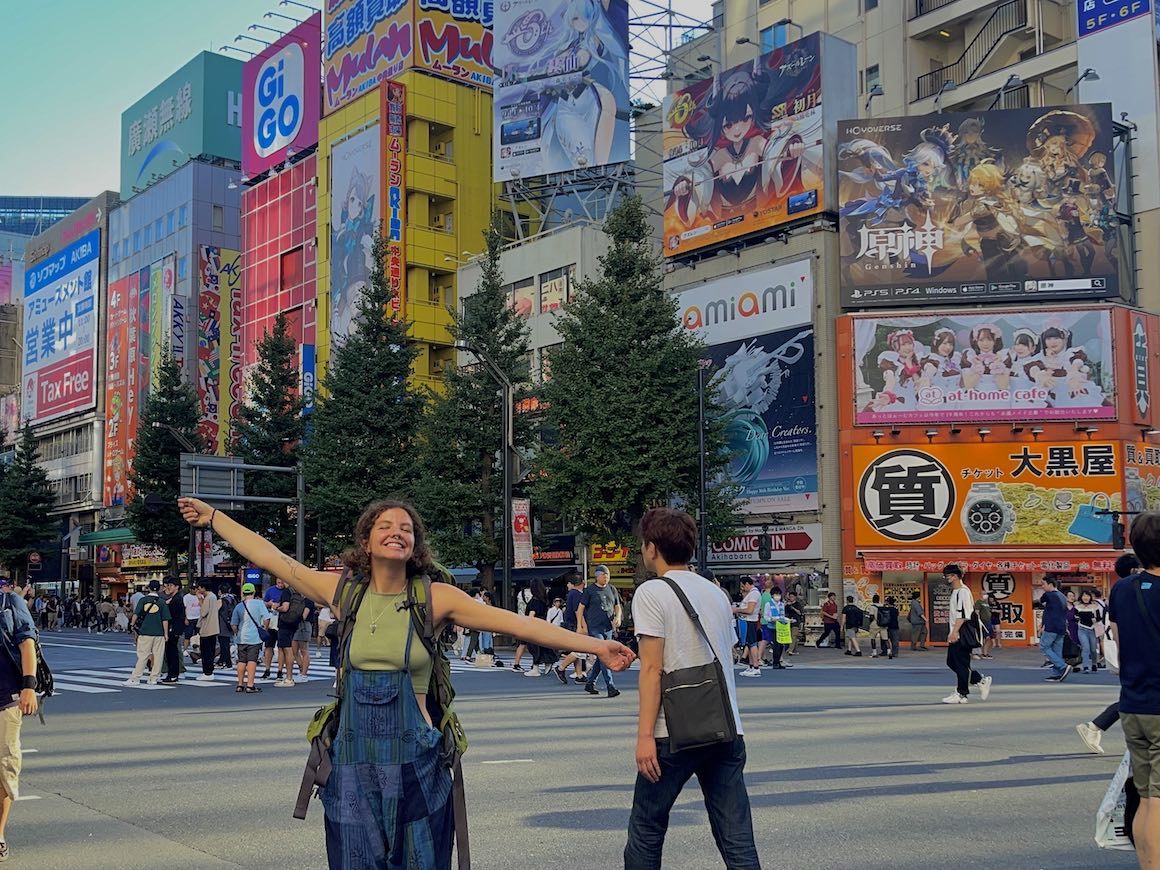
Japan, being Japan, is most definitely safe to visit for female travelers. Being a woman anywhere in the world comes with its own risks, and that applies to Japan too.
Women in Japan have traditional roles, but it’s changing. In fact, single women are very free in Japan, but they aren’t always totally safe. Japan has earned an unfortunate reputation (with grounds) for having an issue with perverts and gropers (among worse things), particularly on some public transport. While this is an ongoing historical social issue in Japan, it’s extremely rare for this to reach a foreigner.
Here are some travel safety tips for the women going to Japan!
- Dress appropriately and try to blend in. You’re not going to get catcalls, but revealing your midriff or having cleavage on show is going to make you stand out.
- Japan has women-only carriages on many of its urban train networks. There’s a name for the onboard gropers – chikan – and historically it has been a common occurrence on public transport in cities, mainly during rush hours. As a tourist, particularly if you avoid peak hours and use the women’s carriage, you’ll be fine.
- Know that if someone is bothering you, physically or being weird , make a scene! Yell, shout, and tell another passenger to call the police. This will definitely spook the harasser.
- With that in mind, stay in a hostel with good reviews and female-only dorms. Not only will you get a better night’s sleep, but sometimes mixed dorms can be a bit overwhelming.
- And on that note, find yourself some travel buddies! Japan can be a lonely experience.
- Don’t be scared to try an onsen. These are traditional public baths, often using naturally hot mineral water… but everyone’s naked . The baths are gender-segregated, and it’s an amazing experience. All sorts of women, from teenagers to older ladies, and even mothers with babies, come in to use the baths, relax and socialize. You might even get chatting to someone yourself! Oh, the whole naked thing? No one cares!
We’ve covered the main safety concerns already, but there are a few more things to know. Read on for more detailed information on how to have a safe trip to Japan.
Is Japan safe to travel for families?
Being as developed as it is, Japan is actually an amazing place to travel with children.
And if your children are videogame or anime fans, they’re going to absolutely love it! We’re talking everything from the Pokemon Centre to arcades galore.
When it comes to history… there’s Kyoto with all its ancient temples. You can feed the deer in amongst the shrines of Nara. You can visit actual former samurai residences in Kakunodate.
And then there are the many museums and theme parks of Osaka and Tokyo.
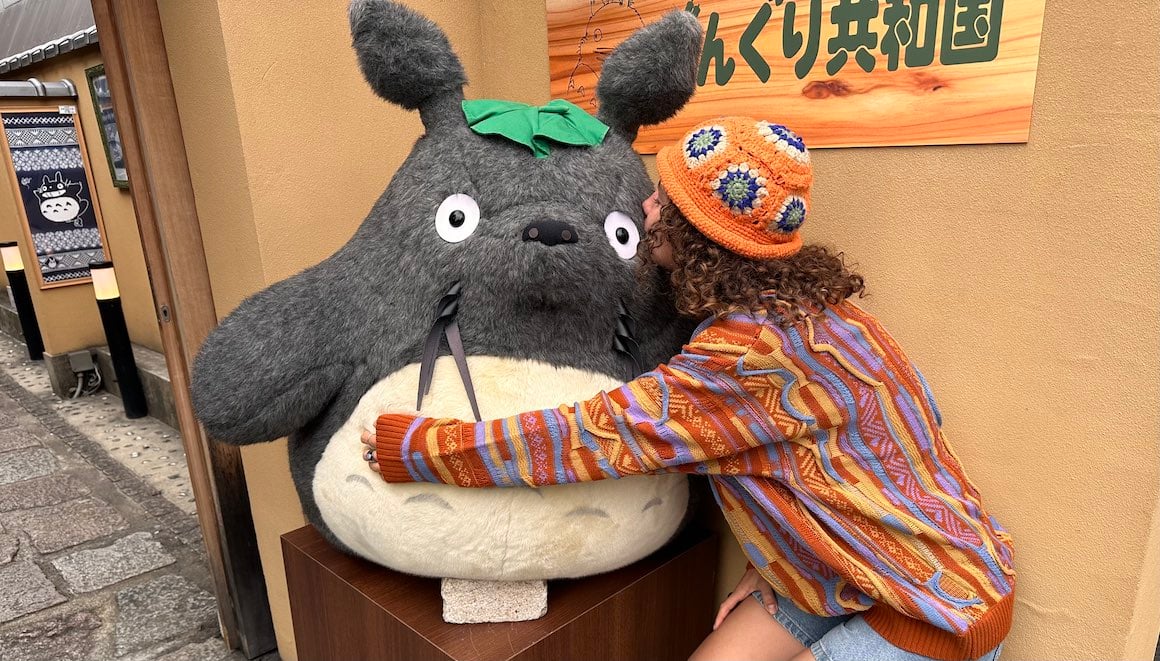
In February there are the beautiful tiny igloos of the Kamakura Festival, the ice festival of Sapporo and Asahikawa, and skiing .
Japan is a fantastic (and safe) holiday destination for families. There’s so much to do!
Everything in Japan is very easy to do with children. It’s one of the safest places for traveling families to take their children. You’ll often see them walking around by themselves, playing in parks, and taking themselves to and from school.
You can even bring SMALL children to Japan. Easily. Baby changing facilities and public toilets are pretty much everywhere. Things like this are well catered for in Japan.
Japanese Hostels actually often have the option to hire out a whole dorm . So you could get yourself a four-bed hostel dorm with its own bathroom.
But at the end of the day, Japan is safe for families to travel. 100%.
Is it safe to drive in Japan? Getting around Japan.
Yes, it sure is.
And there are some superb road trips to be had too (Japan is for the motorbike lovers). There are lovely little coastal routes, around the Kii Peninsula for example, drives through the mountains, and endless backroads that weave through villages and towns.
There’s parking everywhere, though it can be pricey. Nobody drives crazy or too fast except for the odd tosser. The Japanese are some of the safest and most patient drivers on the planet. They also drive on the left which is great news for the Commonwealthers.
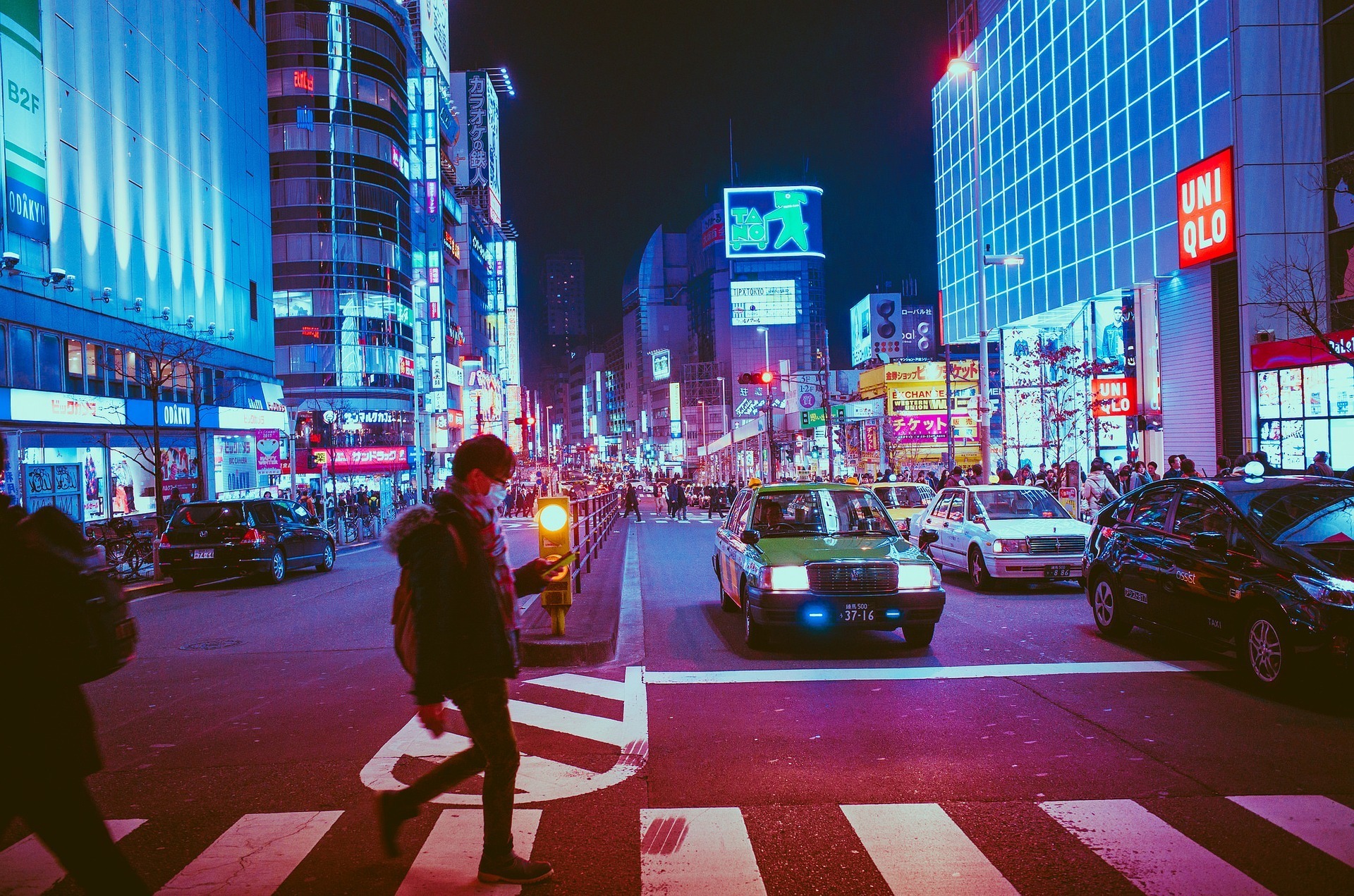
City driving can be hazardous. Pedestrians are one hazard: if it’s green for you to turn left at a junction, it’s often also green for pedestrians to cross. Why? No idea but that’s how it is! Be careful!
You might want to learn some Japanese road signs. A few basic signs doesn’t mean actually reading Japanese, just recognizing the characters.
Basically, it’s like driving in any developed country. It ranks very low in terms of deaths due to road traffic accidents – in the top ten safest countries for driving, in fact, along with Iceland, the UK, and others.
So, yes. It’s certainly safe to drive in Japan – with an international driver’s permit .
Is Uber safe in Japan?
Definitely. Uber is safe in Japan.
But, for some reason, it’s more expensive than taxis.
That might be because Uber is more convenient than a taxi. So you pay for the privilege. That might not be it, though. Either way: it is pretty pricey.
All the usual perks of Uber apply here. That’s everything from being able to see in advance who your driver is, all the way to being able to not have to use any Japanese to book a car. Get a Japanese SIM card to use this while you’re out and about.
Are taxis safe in Japan?
Unlike in other countries, where you have to negotiate with drivers, worry about drivers not turning the meter on or driving too fast, or other odd stuff happening in the car – taxis are totally safe in Japan.
There’s this stereotype that Japanese taxis are ultra-clean. That’s NOT a myth: they really, really are.
Quality will still vary between companies and locations (eg. rural towns vs. cities). There are many different companies, and taxis are generally more likely to be super-swish in major cities than in tiny fishing villages.
Taxi prices are indicated on Google Maps . You can even order through this, via JapanTaxi, or DiDi. They tell you the wait time and the fare.
English-speaking taxi drivers aren’t widespread. You might want to learn some basics in case but chances are Google Translate will suffice.
That said, taxis are super expensive. We’re talking more expensive than London prices. Very steep.
Is public transportation in Japan safe?
Japan is famous for its punctual public transport. (And a billion other things – do they do everything perfect here?) The trains are well known for being on time, all the time.
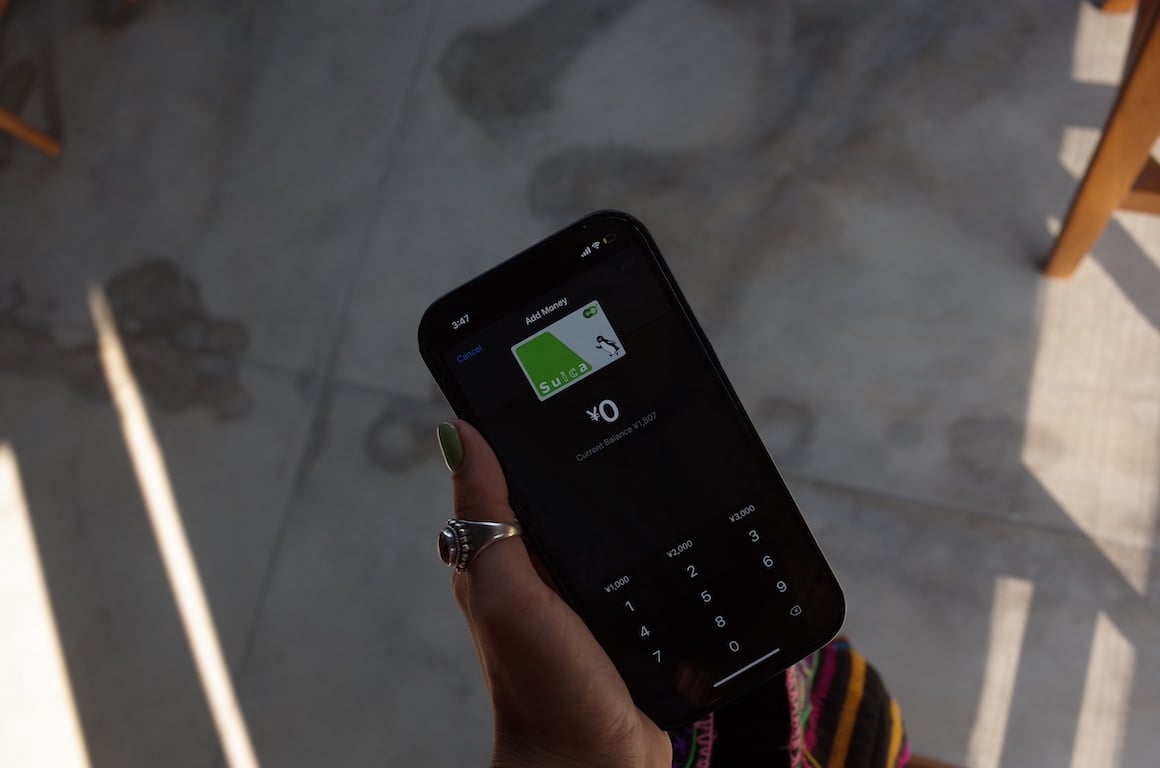
Getting Around the Cities
Each city will have some level of a train or metro system. Whether that’s a few stations crossing a small city, or an entire metro system like connecting the larger metropolises of Tokyo, Osaka, Nagoya, and Fukuoka. It’s VERY comprehensive.
And whilst public transport in Japan is safe, there is one thing to worry about: chikan . This is basically sexual assault, from inappropriate touching to groping, on women. Though it nearly always usually only a concern for local women, it’s not ok.
Other than metro systems, some cities have a tram network . Cities like Hiroshima and Hakodate are examples. Tokyo even has a couple of lines. This, too, is safe.
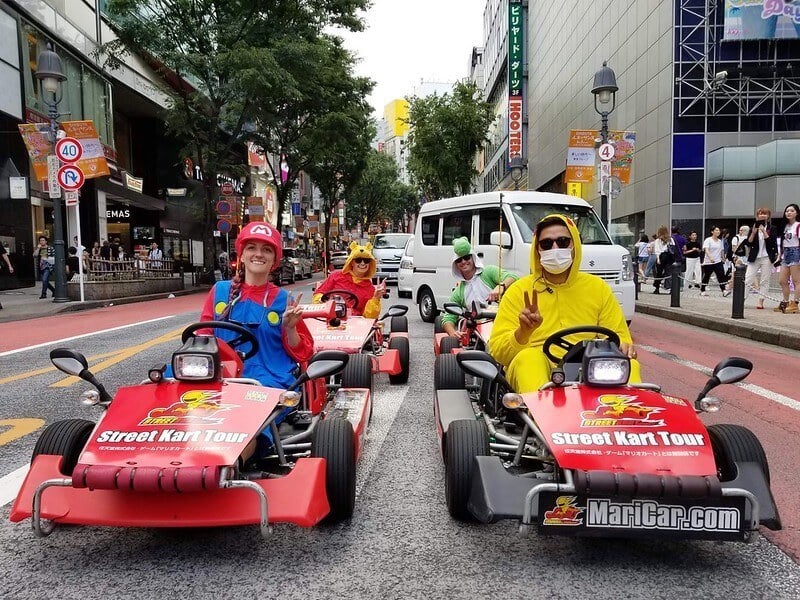
Cities, towns and villages have bus systems which are also safe, efficient, and easy to use . In more rural areas everything will be in Japanese. In cities, it’s usually a mix of Japanese and English. Anything in between depends on how well-trodden it is by English-speaking tourists.
All in all, if you get confused, there’ll always be a friendly Japanese person around to help. Getting around Japan’s cities is safe and easy.
Getting Around Japan
Then there’s getting around the country itself. The rail system is amazing! Local trains here go into almost every single nook and cranny of Japan.
It can be confusing, though: these are often a mix of private lines, Japan Rail lines, and a whole load of different trains from local to reserved and un-reserved limited or semi-limited expresses. Yep. More confusion.
Use Hyperdia to find the cheapest and easiest train routes.
There’s also the famous shinkansen or bullet train. This is super fast, super clean, super nice… and super expensive! (Seeing a trend here? A trip to Japan can cost quite a bit if you’re not smart. )
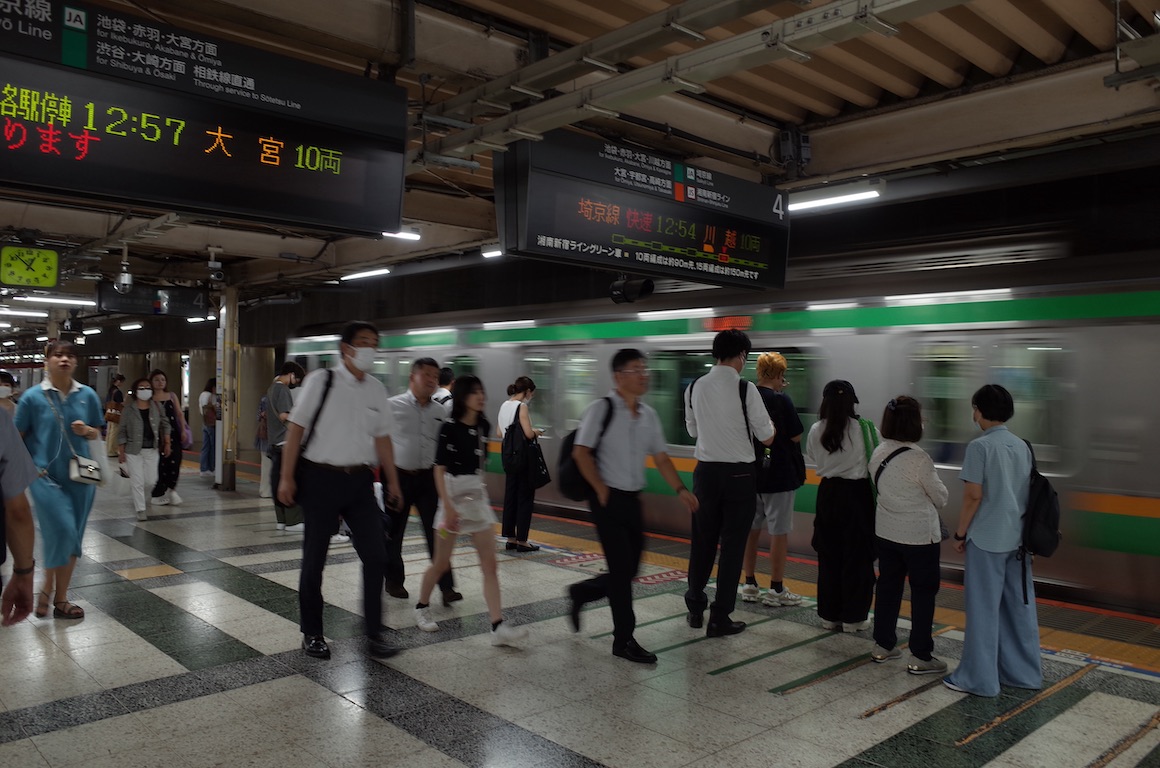
The cheapest way to get around is by highway buses. These ply Japan’s roads cheaper than the price you’d pay via rail. Best of all: no having to change at random train stations.
Even cheaper are night buses. These vary in quality: some companies are amazing, come with toilets, WiFi, and footrests while others may just have a reclining seat. But these are the cheapest way to travel between Japan’s major cities. Night buses in Japan are (of course) safe, too.
Put simply, public transport in Japan is amazing. Like most things about the whole damn country.
Is the food in Japan safe?
Japanese food is really safe and really tasty. That’s about it. The only times you may come up against anything unsafe is if you have an allergy to seafood. There’s a lot of seafood in Japan.
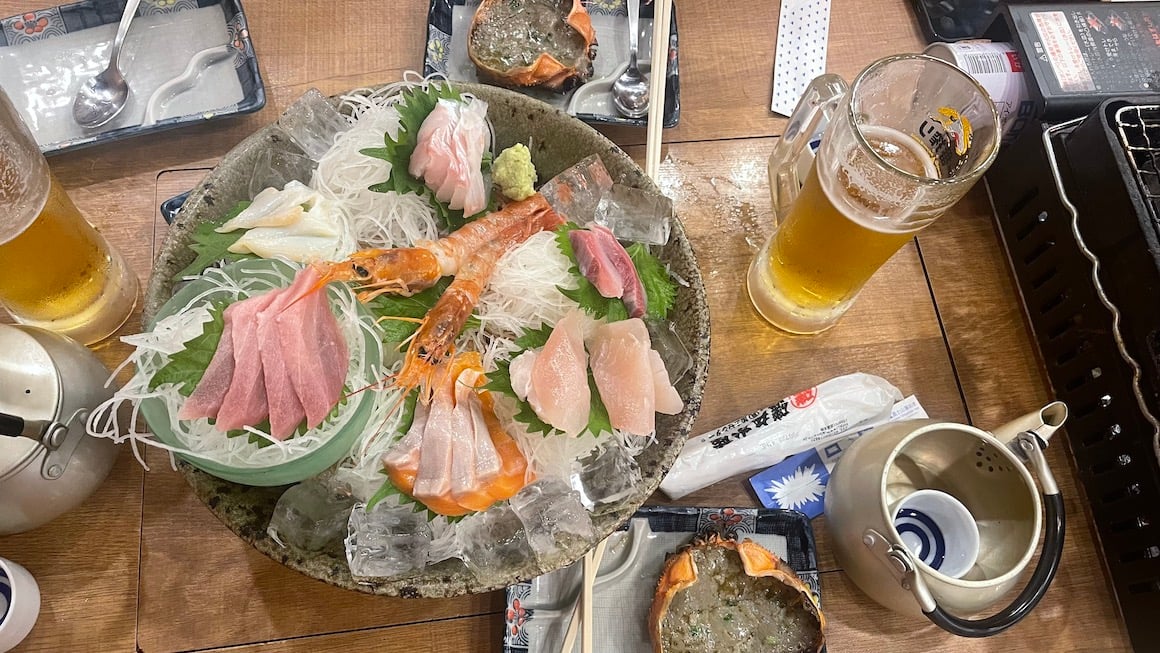
But whilst hygiene conditions are meticulous, there are still things you can do to ensure that you stay as healthy and as safe as possible when you’re eating your way around Japan. So here are some of our top tips when it comes to food safety in Japan.
- Raw food in Japan isn’t just about fish. You can get raw slices almost any meat. We’re talking beef and raw slices of horse ( uma ) and even chicken sashimi. If you have a delicate stomach at all, you may want to avoid these raw meats as much as possible – especially chicken .
- If you want a good food experience, go somewhere busy. A lot of places in Japan are just outright tasty. But if you really, really want a good meal, head for somewhere that looks very popular.
- Avoid places that look like flashy tourist traps or if a tout is trying to get you in. Most likely this won’t be very good quality food and you might end up paying a lot of money for the privilege.
- It can be tricky being a vegetarian in Japan. Even something advertised as a “cheese sandwich” will usually come with a slice of ham. Potato salad? Bits of bacon in it. Vegetarianism (and even veganism) are a thing in Japan, however, it’s rare and not the norm at all. Ask for things with niku nashi at the end of the sentence – that means “without meat.”
- Last but not least, wash your hands. Always. This can save you from getting ill in Japan, at home, and everywhere else.
- Traveling with an allergy? Research ahead of time how to explain your allergy. Keep in mind that store owners and restaurant staff might not know all the foods that contain allergens, so it’s helpful to know the names of some of these too. If you’re gluten-free , pick up a handy Gluten-Free Translation Card with descriptions of Celiac disease, cross-contamination risk, and local Japanese ingredients in Japanese.
Can you drink the water in Japan?
Yes. In cities, it’s a bit chlorine-y .
Outside of these, in rural areas, it’s pretty tasty (particularly in Hokkaido). Wherever you are, bring along your travel water bottle to tote it around with you so you never have to buy those evil single-use bottles!
Watch out in remote areas after heavy rains, winds, and/or landslides. This can put dirt and other contaminants into the water. In these instances, treat or filter your own water. It should clear up after a day or two.
But in general? The water in Japan is completely safe to drink.
Is Japan safe to live in?
Yes, it most certainly is But one thing. The longer you live in Japan , the more likely it is that you are going to experience an earthquake. That’s just GOING to happen.
To really make Japan safe for you to live in, you’re going to have to know what to do in the event of a big earthquake. Having earthquake apps downloaded on your phone, and watching the news if you even feel a small wobble, will help you out.
Then there are typhoons. These happen regularly but especially from September to October – typhoon season. They can be nothing more than a storm. But they can also be truly terrifying and dangerous.
They can cause flooding, landslides, and massive infrastructure damage.
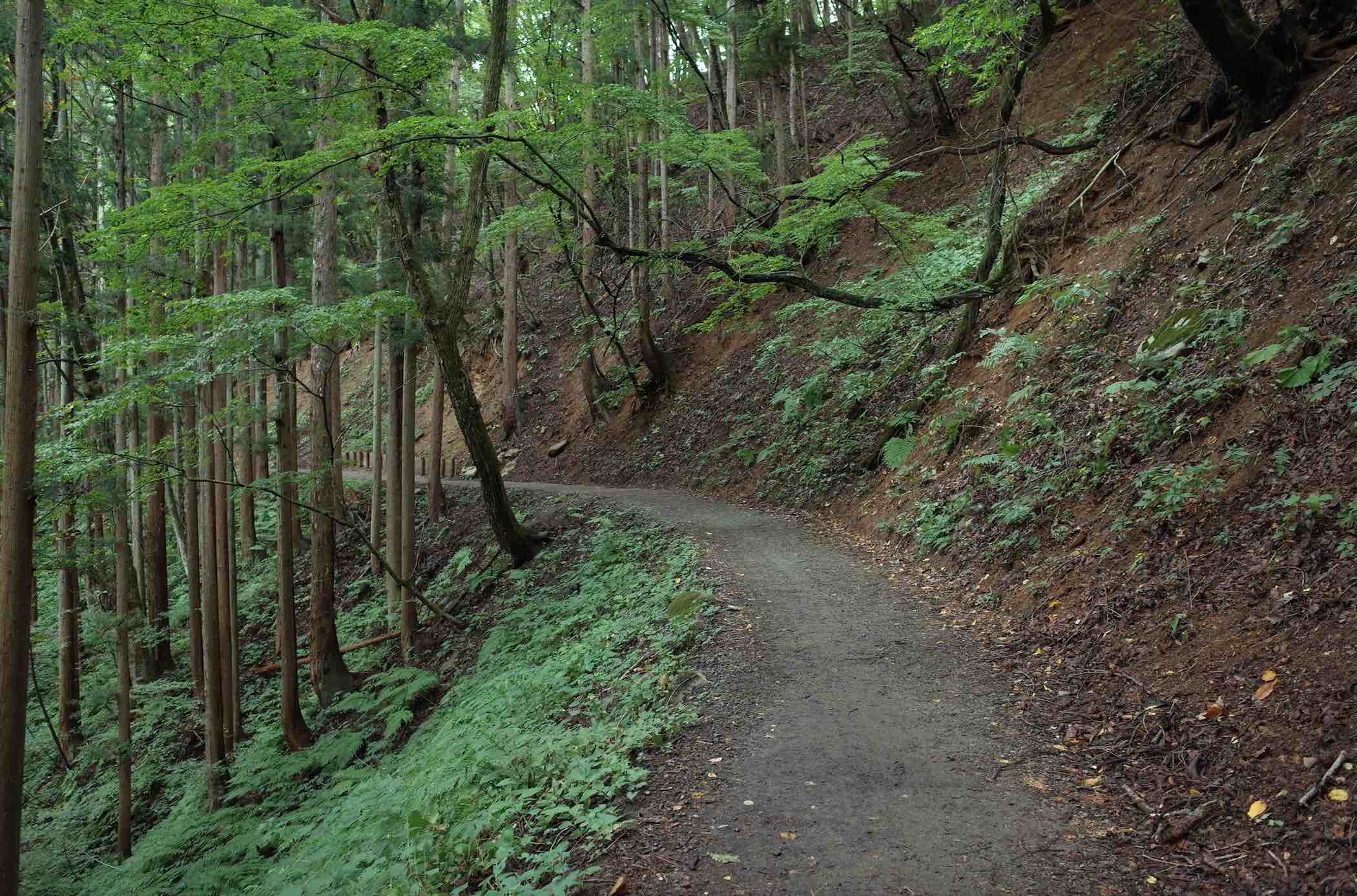
Natural disasters are par for the course in Japan. Combine this with the large number of nuclear power plants in Japan, and it’s a dangerous mix (perfectly encapsulated by the Fukushima disaster of 2011) .
Although this isn’t a concern for everyone, people who are trepidatious about nuclear power (including many Japanese people) make the move to Hokkaido which has a comparatively low number of plants. On occasion, they may even leave Japan altogether.
Aside from that, as we’ve said over and over, Japan is safe. On a human level, it’s really safe. But you should honestly learn some Japanese. English is not very widespread and although it’s becoming more common with younger generations, it’s still extremely limited.
It can be hard to integrate. Find some friends online via Facebook groups, do your research, and try to meet up based on common interests. It’s all about perseverance.
Japan is safe to live in, but it can be tough sometimes. Especially if you’re by yourself.

A new country, a new contract, a new piece of plastic – booooring. Instead, buy an eSIM!
An eSIM works just like an app: you buy it, you download it, and BOOM! You’re connected the minute you land. It’s that easy.
Is your phone eSIM ready? Read about how e-Sims work or click below to see one of the top eSIM providers on the market and ditch the plastic .
Is it safe to rent an Airbnb in Japan?
Renting an Airbnb in Japan is a great idea. And it’s perfectly safe, as long as you read the reviews. Staying at an Airbnb during your trip will also open up new possibilities and options to experience the country. The local hosts are known to take great care of their guests and give the absolute best recommendations of what to do and what to see. Local knowledge always goes a long way, so be sure to reach out to your hosts if you’re unsure about how to fill up your Japan itinerary!
On top of that, you’ll stay safe with the reliable Airbnb booking system. Both hosts and guests can rate each other which creates a very respectful and trustworthy interaction.
Is Japan LGBTQ+ friendly?
While most locals, especially the older generation, still have a conservative mindset, members of the LGBTQ+ community are unlikely to get into any sort of trouble. That is, of course, if you don’t push boundaries and stay respectful of the local culture.
Public affection isn’t a big thing in any relationship so adapting to that is the best thing to do. Popular cities like Tokyo or Kyoko offer a bit of a gay nightlife, but it’s not overwhelming. However, you’ll be welcomed with open arms.
Japan is simply a great country to visit, no matter what kind of traveller you are.
Here are some quick answers to common questions about safety in Japan.
What should I avoid in Japan?
Avoid these things in Japan to have a safe trip: – Avoid walking into dark side streets or sketchy areas – Don’t do drugs – Don’t follow touts to bars – Avoid rush hour – it’s a hub for pickpocketing
Is Tokyo dangerous for tourists?
All areas of Tokyo are safe to visit for tourists. The crime rate is super low, but that doesn’t mean that you’re perfectly safe. Your main concern will be pickpocketing during rush hour on public transports. Stay alert and aware of your surroundings and you’ll have a trouble-free visit.
Is it safe to walk at night in Japan?
As long as you don’t walk into dark side streets or areas that literally scream “danger”, it is safe to walk at night in Japan. If you’re still worried, it’s always a good idea to call a taxi to get around after dark.
Is it safe to live alone in Japan?
Yes, loads of expats live in Japan by themselves. Especially in the bigger cities, you’ll find plenty of individuals that live alone. As long as you have the right visa, you won’t face any troubles.
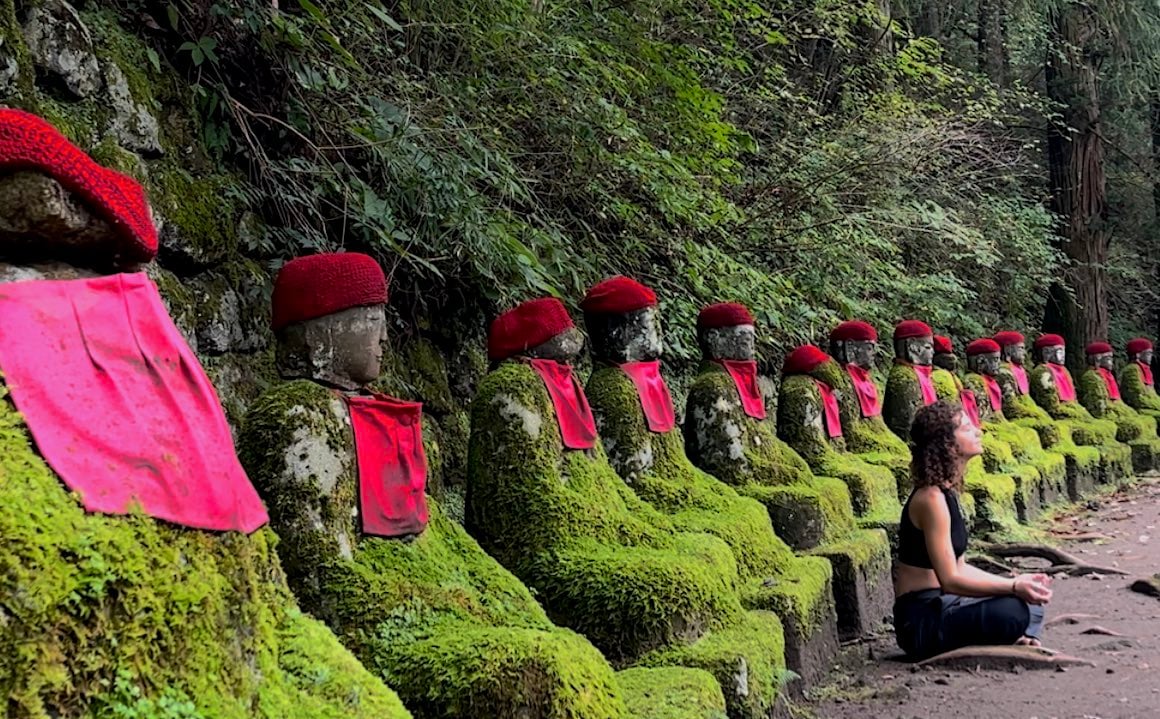
To conclude: Japan is a ridiculously safe country to travel. Everybody minds everybody else’s business here, people literally save seats and tables in cafes with their handbags and coats (a TOTAL no-no in so many other countries), and public transport is safe after dark.
It’s quiet, humble, and totally safe. And it’s zany, proud, and completely reckless – watch a mikoshi procession and see the madness.
Anywhere in the world, there are shades of grey and shades of weird. Not just weird, where people can get too close for comfort, or just plain freak you out, but dangerous. Although safety in Japan is pretty much a no-brainer for a tourist, things can still happen the same as anywhere.
And then, of course, away from all the human things: Mama Nature. Earthquakes are unpredictable. Japanese people live with this threat every day and still have fun. So should you.
Disclaimer: Safety conditions change all over the world on a daily basis. We do our best to advise but this info may already be out of date. Do your own research. Enjoy your travels! Some of the links in this post are affiliate links which means we earn a small commission if you purchase your insurance through this page. This costs you nothing extra and helps us keep the site going.

Share or save this post

Japan is absolutely NOT safe. See the truth.
Thanks for your input. Noted.
Leave a Reply Cancel reply
Your email address will not be published. Required fields are marked *
Save my name, email, and website in this browser for the next time I comment.
Notify me of followup comments via e-mail.
- Skip to main content
- Skip to "About this site"
Language selection
Search travel.gc.ca.
Help us to improve our website. Take our survey !
COVID-19: travel health notice for all travellers
Japan travel advice
Latest updates: The Need help? section was updated.
Last updated: May 31, 2024 08:12 ET
On this page
Safety and security, entry and exit requirements, laws and culture, natural disasters and climate, japan - take normal security precautions.
Take normal security precautions in Japan.
Back to top
Fukushima nuclear power plant and surrounding area
Following the 2011 incident at the Fukushima Daiichi nuclear power plant, Japanese authorities have placed restrictions, including travel and overnight stay bans, on the plant's surrounding area due to the risk of exposure to radiation. Restricted areas are clearly identified.
Follow the instructions of local authorities.
Assistance of Residents Affected by the Nuclear Incidents – Japanese Ministry of Economy, Trade and Industry

Tensions on Korean Peninsula
The regional security situation on the neighbouring Korean Peninsula could deteriorate suddenly. Tensions may increase before, during and after North Korean nuclear and missile tests. Military exercises and activities may also escalate tension.
- Remain vigilant
- Monitor developments to stay informed on the current situation
- Follow the instructions of local authorities, including the Cabinet Secretariat's guidance on civil protection
Cabinet Secretariat Civil Protection Portal
Crime against foreigners is generally low. However, petty crime, such as pickpocketing and purse snatching, occurs from time to time. Be cautious in entertainment and nightlife districts throughout Japan, especially in these four in Tokyo:
If you are the victim of a crime, file a police report at the closest station of the incident. Occasionally, local police may be hesitant to prepare a report for foreigners. If this happens, contact the Embassy of Canada to Japan for assistance.
Drug trafficking
An increasing number of travellers report having been used as unwitting drug couriers.
Penalties for drug-related criminal activities are severe. Even unsuspecting individuals transporting packages containing narcotics can be criminally charged and face long jail sentences.
Be wary of individuals, even those you know, who ask you to carry a package to Japan on their behalf.
Useful links
Drugs, alcohol and travel
- International Drug Smuggling Scams
Spiked food and drinks
Never leave food or drinks unattended or in the care of strangers. Be wary of accepting snacks, beverages, gum or cigarettes from new acquaintances. These items may contain drugs that could put you at risk of sexual assault and robbery.
There are reports of incidents where staff, or other customers at bars and nightclubs, have mixed drugs and copious amounts of alcohol into drinks of unsuspecting clients. These incidents are particularly frequent in the districts of Kabukicho and Roppongi in Tokyo. The intend is usually to defraud, overcharge services, rob or assault the person.
Credit card and ATM fraud occurs. There have been incidents of overcharging at bars and clubs. Disputes over overcharging have led to violence.
Be cautious when using debit or credit cards:
- pay careful attention when your cards are being handled by others
- use ATMs located in well-lit public areas or inside a bank or business
- avoid using card readers with an irregular or unusual feature
- cover the keypad with one hand when entering your PIN
- check for any unauthorized transactions on your account statements and contact your financial institution as soon as possible if irregularities
Overseas fraud
Women's safety
Women travelling alone may be subject to some forms of harassment and verbal abuse. Inappropriate physical contact may occur on busy subways and trains. There are women-only train cars during rush hour on some subway and train lines.
Advice for women travellers
Road safety
Road conditions and road safety are generally good throughout the country. However, roads may be narrow.
Japan Road Traffic Information Center (in Japanese)
Public transportation
Taxis are generally safe.
- Use only officially marked taxis
- Negotiate fares in advance, or insist that the driver use the meter, as you may be overcharged
- Have your destination written in Japanese as drivers may not understand English
Taxis in Japan – Japan National Tourism Organization
Train and subway
Travel by subway and train is quick and convenient. Signs are usually in Japanese but signage in English is becoming more common, especially in larger cities and at tourist destinations.
General safety information
Emergency information and advice for tourists is available from the Japan National Tourism Organization .
We do not make assessments on the compliance of foreign domestic airlines with international safety standards.
Information about foreign domestic airlines
Every country or territory decides who can enter or exit through its borders. The Government of Canada cannot intervene on your behalf if you do not meet your destination’s entry or exit requirements.
We have obtained the information on this page from the Japanese authorities. It can, however, change at any time.
Verify this information with the Foreign Representatives in Canada .
Entry requirements vary depending on the type of passport you use for travel.
Before you travel, check with your transportation company about passport requirements. Its rules on passport validity may be more stringent than the country’s entry rules.
Regular Canadian passport
Your passport must be valid for the expected duration of your stay in Japan. If you plan to travel to other countries in the region, check passport validity requirements for the countries you plan to visit.
Passport for official travel
Different entry rules may apply.
Official travel
Passport with “X” gender identifier
While the Government of Canada issues passports with an “X” gender identifier, it cannot guarantee your entry or transit through other countries. You might face entry restrictions in countries that do not recognize the “X” gender identifier. Before you leave, check with the closest foreign representative for your destination.
Other travel documents
Different entry rules may apply when travelling with a temporary passport or an emergency travel document. Before you leave, check with the closest foreign representative for your destination.
- Foreign Representatives in Canada
- Canadian passports
Tourist visa: not required for stays up to a maximum of 90 days Business visa: required Work visa: required Student visa: required
You can’t apply for a business, work or student visa if you have already entered Japan as a tourist.
Business travellers need a visa if they are to receive compensation in addition to their regular salary for work carried out while in Japan.
Overstaying the 90-day, tourist visa-free limit or any other visa time limit is a criminal offence. If you overstay, you may be subject to fines and deportation, and you may be barred from re-entry to Japan.
Other entry requirements
Customs officials may ask you to show them a return or onward ticket, confirmed accommodations arrangements and proof of sufficient funds to cover your stay.
Japanese officials will photograph and fingerprint visitors upon arrival. Exceptions may apply.
Immigration Services Agency of Japan
Registration
Japanese regulations require that visiting foreigners give detailed information when checking in at hotels or other lodging facilities.
Foreigners must also allow their passports to be photocopied.
Children and travel
Learn more about travelling with children .
Yellow fever
Learn about potential entry requirements related to yellow fever (vaccines section).
Relevant Travel Health Notices
- Global Measles Notice - 13 March, 2024
- COVID-19 and International Travel - 13 March, 2024
This section contains information on possible health risks and restrictions regularly found or ongoing in the destination. Follow this advice to lower your risk of becoming ill while travelling. Not all risks are listed below.
Consult a health care professional or visit a travel health clinic preferably 6 weeks before you travel to get personalized health advice and recommendations.
Routine vaccines
Be sure that your routine vaccinations , as per your province or territory , are up-to-date before travelling, regardless of your destination.
Some of these vaccinations include measles-mumps-rubella (MMR), diphtheria, tetanus, pertussis, polio, varicella (chickenpox), influenza and others.
Pre-travel vaccines and medications
You may be at risk for preventable diseases while travelling in this destination. Talk to a travel health professional about which medications or vaccines may be right for you, based on your destination and itinerary.
Yellow fever is a disease caused by a flavivirus from the bite of an infected mosquito.
Travellers get vaccinated either because it is required to enter a country or because it is recommended for their protection.
- There is no risk of yellow fever in this country.
Country Entry Requirement*
- Proof of vaccination is not required to enter this country.
Recommendation
- Vaccination is not recommended.
* It is important to note that country entry requirements may not reflect your risk of yellow fever at your destination. It is recommended that you contact the nearest diplomatic or consular office of the destination(s) you will be visiting to verify any additional entry requirements.
About Yellow Fever
Yellow Fever Vaccination Centres in Canada
Tick-borne encephalitis (TBE) is a risk in some areas of this destination. It is a viral disease that affects the central nervous system (brain and spinal cord). It is spread to humans by the bite of infected ticks or occasionally when unpasteurized milk products are consumed.
Travellers to areas where TBE is found may be at higher risk during April to November, and the risk is highest for people who hike or camp in forested areas.
Protect yourself from tick bites . The vaccine is not available in Canada. It may be available in the destination you are travelling to.
Measles is a highly contagious viral disease. It can spread quickly from person to person by direct contact and through droplets in the air.
Anyone who is not protected against measles is at risk of being infected with it when travelling internationally.
Regardless of where you are going, talk to a health care professional before travelling to make sure you are fully protected against measles.
Japanese encephalitis is a viral infection that can cause swelling of the brain. It is spread to humans through the bite of an infected mosquito. Risk is very low for most travellers. Travellers at relatively higher risk may want to consider vaccination for JE prior to travelling.
Travellers are at higher risk if they will be:
- travelling long term (e.g. more than 30 days)
- making multiple trips to endemic areas
- staying for extended periods in rural areas
- visiting an area suffering a JE outbreak
- engaging in activities involving high contact with mosquitos (e.g., entomologists)
Hepatitis B is a risk in every destination. It is a viral liver disease that is easily transmitted from one person to another through exposure to blood and body fluids containing the hepatitis B virus. Travellers who may be exposed to blood or other bodily fluids (e.g., through sexual contact, medical treatment, sharing needles, tattooing, acupuncture or occupational exposure) are at higher risk of getting hepatitis B.
Hepatitis B vaccination is recommended for all travellers. Prevent hepatitis B infection by practicing safe sex, only using new and sterile drug equipment, and only getting tattoos and piercings in settings that follow public health regulations and standards.
Coronavirus disease (COVID-19) is an infectious viral disease. It can spread from person to person by direct contact and through droplets in the air.
It is recommended that all eligible travellers complete a COVID-19 vaccine series along with any additional recommended doses in Canada before travelling. Evidence shows that vaccines are very effective at preventing severe illness, hospitalization and death from COVID-19. While vaccination provides better protection against serious illness, you may still be at risk of infection from the virus that causes COVID-19. Anyone who has not completed a vaccine series is at increased risk of being infected with the virus that causes COVID-19 and is at greater risk for severe disease when travelling internationally.
Before travelling, verify your destination’s COVID-19 vaccination entry/exit requirements. Regardless of where you are going, talk to a health care professional before travelling to make sure you are adequately protected against COVID-19.
The best way to protect yourself from seasonal influenza (flu) is to get vaccinated every year. Get the flu shot at least 2 weeks before travelling.
The flu occurs worldwide.
- In the Northern Hemisphere, the flu season usually runs from November to April.
- In the Southern Hemisphere, the flu season usually runs between April and October.
- In the tropics, there is flu activity year round.
The flu vaccine available in one hemisphere may only offer partial protection against the flu in the other hemisphere.
The flu virus spreads from person to person when they cough or sneeze or by touching objects and surfaces that have been contaminated with the virus. Clean your hands often and wear a mask if you have a fever or respiratory symptoms.
In this destination, rabies may be present in some wildlife species, including bats. Rabies is a deadly disease that spreads to humans primarily through bites or scratches from an infected animal.
If you are bitten or scratched by an animal while travelling, immediately wash the wound with soap and clean water and see a health care professional.
Before travel, discuss rabies vaccination with a health care professional. It may be recommended for travellers who will be working directly with wildlife.
Safe food and water precautions
Many illnesses can be caused by eating food or drinking beverages contaminated by bacteria, parasites, toxins, or viruses, or by swimming or bathing in contaminated water.
- Learn more about food and water precautions to take to avoid getting sick by visiting our eat and drink safely abroad page. Remember: Boil it, cook it, peel it, or leave it!
- Avoid getting water into your eyes, mouth or nose when swimming or participating in activities in freshwater (streams, canals, lakes), particularly after flooding or heavy rain. Water may look clean but could still be polluted or contaminated.
- Avoid inhaling or swallowing water while bathing, showering, or swimming in pools or hot tubs.
Typhoid is a bacterial infection spread by contaminated food or water. Risk is higher among children, travellers going to rural areas, travellers visiting friends and relatives or those travelling for a long period of time.
Travellers visiting regions with a risk of typhoid, especially those exposed to places with poor sanitation, should speak to a health care professional about vaccination.
Insect bite prevention
Many diseases are spread by the bites of infected insects such as mosquitoes, ticks, fleas or flies. When travelling to areas where infected insects may be present:
- Use insect repellent (bug spray) on exposed skin
- Cover up with light-coloured, loose clothes made of tightly woven materials such as nylon or polyester
- Minimize exposure to insects
- Use mosquito netting when sleeping outdoors or in buildings that are not fully enclosed
To learn more about how you can reduce your risk of infection and disease caused by bites, both at home and abroad, visit our insect bite prevention page.
Find out what types of insects are present where you’re travelling, when they’re most active, and the symptoms of the diseases they spread.
There is a risk of chikungunya in this country. The risk may vary between regions of a country. Chikungunya is a virus spread through the bite of an infected mosquito. Chikungunya can cause a viral disease that typically causes fever and pain in the joints. In some cases, the joint pain can be severe and last for months or years.
Protect yourself from mosquito bites at all times. There is no vaccine available for chikungunya.
- In this country, risk of dengue is sporadic. It is a viral disease spread to humans by mosquito bites.
- Dengue can cause flu-like symptoms. In some cases, it can lead to severe dengue, which can be fatal.
- The level of risk of dengue changes seasonally, and varies from year to year. The level of risk also varies between regions in a country and can depend on the elevation in the region.
- Mosquitoes carrying dengue typically bite during the daytime, particularly around sunrise and sunset.
- Protect yourself from mosquito bites . There is no vaccine or medication that protects against dengue fever.
Animal precautions
Some infections, such as rabies and influenza, can be shared between humans and animals. Certain types of activities may increase your chance of contact with animals, such as travelling in rural or forested areas, camping, hiking, and visiting wet markets (places where live animals are slaughtered and sold) or caves.
Travellers are cautioned to avoid contact with animals, including dogs, livestock (pigs, cows), monkeys, snakes, rodents, birds, and bats, and to avoid eating undercooked wild game.
Closely supervise children, as they are more likely to come in contact with animals.
Person-to-person infections
Stay home if you’re sick and practise proper cough and sneeze etiquette , which includes coughing or sneezing into a tissue or the bend of your arm, not your hand. Reduce your risk of colds, the flu and other illnesses by:
- washing your hands often
- avoiding or limiting the amount of time spent in closed spaces, crowded places, or at large-scale events (concerts, sporting events, rallies)
- avoiding close physical contact with people who may be showing symptoms of illness
Sexually transmitted infections (STIs) , HIV , and mpox are spread through blood and bodily fluids; use condoms, practise safe sex, and limit your number of sexual partners. Check with your local public health authority pre-travel to determine your eligibility for mpox vaccine.
Medical services and facilities
Health care is very good. Service is available throughout the country.
Services in English could be limited, especially in rural areas. The cost of health-care services is similar to Canada. As a foreigner, you will likely have to pay in advance or provide a document proving that the bill will be paid prior to discharge.
Make sure you get travel insurance that includes coverage for medical evacuation and hospital stays.
Travel health and safety
Health insurance for foreign workers
As a Canadian working in Japan, you must have medical and health services coverage for the duration of your stay. If not provided by your Japanese employer, you must subscribe to the national health insurance plan.
If you need to consult medical professionals, the following organizations can refer you to medical facilities with English and other foreign language-speaking staff:
- Guide for when you are feeling ill – Japan National Tourism Organization
- Medical information net – Ministry of Health, Labour and Welfare
- AMDA International Medical Information Center
Keep in Mind...
The decision to travel is the sole responsibility of the traveller. The traveller is also responsible for his or her own personal safety.
Be prepared. Do not expect medical services to be the same as in Canada. Pack a travel health kit , especially if you will be travelling away from major city centres.
You must abide by local laws.
In many cases, arrested or detained suspects are denied oral or written communication with anyone other than their lawyer or a Canadian consular representative for an extended period.
If you are detained, even for a minor offence, you may be held without charge for up to 23 days. Police officers may begin their initial questioning before you see a lawyer. You could also be in detention for weeks or months during the investigation and legal proceedings.
- Overview of the criminal law system in Japan
- Arrest and detention
Penalties for possession, use or trafficking of illegal drugs are severe. Convicted offenders can expect jail sentences and heavy fines. Japan has a zero-tolerance policy with respect to drugs, including recreational drugs and cannabis. Severe penalties are imposed for the possession of even a small quantity.
Medications
Certain medications are banned in Japan, including:
- amphetamines
- methamphetamines
- pseudoephedrine
You may bring a one-month supply of prescription medication or a two-month supply of non-prescription medication into Japan, as long as the medication does not contain narcotics (including codeine). You cannot bring banned substances with you, even with a prescription.
You must have a doctor’s note that states your full name, address, the reason for use, and dosage, along with your prescribed medication. Local authorities may also request a detailed listing of the contents of the medication.
If you wish to bring in larger supplies of medication or bring in prescription medication that contains narcotics, you must apply in advance for import certification. You should do so several months prior to arrival.
Bringing medicines for personal use into Japan – Japanese Ministry of Health, Labour and Welfare
2SLGBTQI+ travellers
Japanese law doesn't prohibit sexual acts between individuals of the same sex. However, homosexuality is not widely socially accepted.
Travel and your sexual orientation, gender identity, gender expression and sex characteristics
Dual citizenship
Dual citizenship is not legally recognized in Japan.
If local authorities consider you a citizen of Japan, they may refuse to grant you access to Canadian consular services. This will prevent us from providing you with those services.
Travellers with dual citizenship
If you acquire 2 or more citizenships at birth, you can keep them all, including Japanese citizenship, until the age of 18. At 18, you must choose between your Japanese citizenship or other citizenships within a 2-year period.
Japanese family law is different from Canadian family law.
In Japan, joint custody of a child after separation is not a legal option if one of the parents is a Japanese national. As a result, access rights for a non-custodial parent can be limited, if granted.
If you are involved in a custody or other family law dispute in Japan, consult a Japanese family lawyer.
International Child Abduction
The Hague Convention on the Civil Aspects of International Child Abduction is an international treaty. It can help parents with the return of children who have been removed to or retained in certain countries in violation of custody rights. The convention applies between Canada and Japan.
If your child was wrongfully taken to, or is being held in Japan, and if the applicable conditions are met, you may apply for the return of your child to the Japanese court.
If you are in this situation:
- act as quickly as you can
- contact the Central Authority for your province or territory of residence for information on starting an application under The Hague Convention
- consult a lawyer in Canada and in Japan to explore all the legal options for the return of your child
- report the situation to the nearest Canadian government office abroad or to the Vulnerable Children’s Consular Unit at Global Affairs Canada by calling the Emergency Watch and Response Centre
If your child was removed from a country other than Canada, consult a lawyer to determine if The Hague Convention applies.
Be aware that Canadian consular officials cannot interfere in private legal matters or in another country’s judicial affairs.
- List of Canadian Central Authorities for the Hague Convention
- International Child Abduction: A Guidebook for Left-Behind Parents
- Travelling with children
- The Hague Convention - Hague Conference on Private International Law
- Canadian embassies and consulates by destination
- Emergency Watch and Response Centre
Identification
You must carry your passport or residence card at all times.
A photocopy will not satisfy authorities. Police officers in Japan may ask for your identification documents at any time.
If you fail to do so, you could face arrest or detention.
Working in Japan
Working without an appropriate visa is illegal. Offenders may be subject to imprisonment, a fine and deportation.
If you are considering employment offers in Japan, contact the Japanese embassy or consulate nearest you before coming to Japan.
Foreign diplomatic missions and consulates in Canada
Teaching English
You should carefully review a contract to teach English before you sign. There have been incidents of employers not adhering to their contractual obligations.
Ensure that all terms and conditions of employment are clearly stated in the contract and that you meet all requirements before accepting an offer.
More on teaching English in Japan
You may be denied entry to public establishments such as swimming pools, hot springs, beaches and some gyms if you have a tattoo.
Some establishments may ask that you cover your tattoo.
Traffic drives on the left.
You must carry an international driving permit along with your Canadian licence, or a Japanese driver’s licence.
International Driving Permit
You must also obtain Japanese insurance. There are two types of driving insurance available:
- compulsory insurance, which is basic government-mandated insurance covering your legal liability
- voluntary insurance, obtained on your own from a private company and designed for your needs
Should you have an accident, compulsory insurance may not be sufficient.
Drinking and driving
Penalties for drinking and driving are severe.
Under Japanese law, it’s forbidden to:
- drive if you have been drinking
- lend a car to someone who has been drinking
- serve alcohol to someone who has to drive
If you are a passenger in a car whose driver is under the influence of alcohol, you both are subject to prosecution.
The currency of Japan is the yen (JPY).
Credit cards are accepted in most major hotels and restaurants, but Japan is a predominantly cash-based society.
ATMs are widely available, but many don’t accept foreign debit cards.
Typhoons usually occur between June and October. During this period, even small storms can quickly develop into major typhoons. Southern areas, including Okinawa and surrounding islands, are more vulnerable.
These severe storms can put you at risk and hamper the provision of essential services.
If you decide to travel to Japan during the typhoon season:
- know that you expose yourself to serious safety risks
- be prepared to change your travel plans on short notice, including cutting short or cancelling your trip
- stay informed of the latest regional weather forecasts
- carry emergency contact information for your airline or tour operator
- follow the advice and instructions of local authorities
- Tornadoes, cyclones, hurricanes, typhoons and monsoons
- Large-scale emergencies abroad
- Japan Meteorological Agency
Seismic activity
Japan is located in an active seismic zone and is prone to a multitude of natural disasters such as earthquakes, tsunamis, flooding, volcanic eruptions. Strong earthquakes occur, as well as tsunamis.
Earthquakes
Each year, Japan experiences thousands of earthquakes of varying magnitudes, some triggering tsunamis. Deaths, injuries and significant damage may occur.
Earthquakes - Government of Canada
Japan is prone to tsunamis. A tsunami can occur within minutes of a nearby earthquake. However, the risk of tsunami can remain for several hours following the first tremor. If you’re staying on the coast, familiarize yourself with the region’s evacuation plans in the event of a tsunami warning.
Tsunami alerts - U.S. Tsunami Warning System
There are a number of active volcanoes. The Japan Meteorological Agency lists active volcanoes and associated warnings.
If you are travelling near a volcano, check for the latest activity and warnings. Always follow the advice and instructions of local authorities.
Volcanic alert levels and warnings - Japan Meteorological Agency
Seasonal risks
Snowstorms occur in western Honshu and Hokkaido from December to March.
Avalanches can occur in mountainous areas, including at ski resorts. These can cause power disruptions, make roads impassable and limit the ability of responders to reach these areas in case of emergency.
- Information in case of natural disasters - Japan National Tourism Organization
Local services
In case of emergency, dial:
- police: 110
- medical assistance: 119
- firefighters: 119
Consular assistance
For emergency consular assistance, call the Embassy of Canada to Japan, in Tokyo, and follow the instructions. At any time, you may also contact the Emergency Watch and Response Centre in Ottawa.
When calling from within Japan, the area code is preceded by a 0. There is no 0 when calling from outside Japan. If placing a call to a cellular phone number, you do not need to enter the code.
The decision to travel is your choice and you are responsible for your personal safety abroad. We take the safety and security of Canadians abroad very seriously and provide credible and timely information in our Travel Advice to enable you to make well-informed decisions regarding your travel abroad.
The content on this page is provided for information only. While we make every effort to give you correct information, it is provided on an "as is" basis without warranty of any kind, expressed or implied. The Government of Canada does not assume responsibility and will not be liable for any damages in connection to the information provided.
If you need consular assistance while abroad, we will make every effort to help you. However, there may be constraints that will limit the ability of the Government of Canada to provide services.
Learn more about consular services .
Risk Levels
take normal security precautions.
Take similar precautions to those you would take in Canada.
Exercise a high degree of caution
There are certain safety and security concerns or the situation could change quickly. Be very cautious at all times, monitor local media and follow the instructions of local authorities.
IMPORTANT: The two levels below are official Government of Canada Travel Advisories and are issued when the safety and security of Canadians travelling or living in the country or region may be at risk.
Avoid non-essential travel
Your safety and security could be at risk. You should think about your need to travel to this country, territory or region based on family or business requirements, knowledge of or familiarity with the region, and other factors. If you are already there, think about whether you really need to be there. If you do not need to be there, you should think about leaving.
Avoid all travel
You should not travel to this country, territory or region. Your personal safety and security are at great risk. If you are already there, you should think about leaving if it is safe to do so.
- Tokyo Cheapo (繁體中文)
Managing Risks and Danger: A Guide to Safe Travel in Japan
Japan is known throughout the world as a safe travel destination. The level of safety can vary widely depending on how you look at it. Often, when people say “safety”, they are referring to crime. However, crime is just a small piece of the overall safety puzzle.
So what are the risks? Besides crime, there are natural disasters, disease, accidents, the criminal justice system, wild animals and radiation from the Fukushima Daiichi nuclear accident. The risk of any of those affecting you is quite low, but may be different to what you’re used to and might be more significant when totalled together.
Rule number one is to be prepared. Good travel insurance is a bargain compared to the alternatives.
Natural disasters
- Earthquakes

Japan sits on the intersection of three tectonic plates, which means lots of earthquakes. Most earthquakes—even when they shake you awake or make the lights sway from side to side—are not a problem. Japan is so used to earthquakes that if you are near Japanese people, some might not even look up from their phones when the ground starts to shake. However, every now and then there is a big one—like the magnitude 9 monster that struck off the coast of northern Honshu in March, 2011.
In the case of really big earthquakes, the best advice depends on where you are at the time. If you are inside, take shelter under solid furniture. Japanese buildings are designed for big earthquakes so they are very unlikely to collapse. You are more likely to be injured by falling ceiling panels or unsecured pieces of furniture.
If you are outside in a built up area, you are more at risk than being inside. Potential hazards are falling glass, broken masonry, falling live wires or transmission poles, and unreinforced block walls or retaining walls.

If you are near the coast or a coastal river and you feel strong shaking, don’t wait for the tsunami evacuation alert, you should head to high ground immediately.
Another hazard related to earthquakes is landslides. The Kumamoto Earthquake of 2016 caused a major landslide that destroyed the main bridge linking Kumamoto to Oita in the east. Landslides are a bigger hazard in the countryside, in mountainous areas and after heavy rain.
For much more detail, see our comprehensive guide on what to do in an earthquake .

Tropical storms and typhoons are a problem from about April to November each year, but are particularly prevalent in late summer and early fall.
In 2019, Japan saw two major typhoons that caused considerable destruction and disruption. Typhoon Faxi in September had strong winds that toppled trees, tore off roofs and damaged transport links, cutting off access to Narita Airport for more than a day. Typhoon Hagibis struck a month later with less severe winds but record-setting rainfall. Regions of central Japan experienced severe flooding. Ten shinkansen trains on the Hokuriku Shinkansen line parked at a siding were made unusable from flooding.
Most typhoons pose little physical risk (as long as you take sensible precautions), but can cause major disruption. Flights and public transport can be disrupted for up to 2 or 3 days. If a typhoon is heading your way, prepare for your travel plans to be adjusted.
For more on what to do in a typhoon, check out our guide to keeping yourself safe in a typhoon .

Volcanoes are another hazard, but discounting catastrophic eruptions—which are very, very rare—you are only likely to be in danger if you are in very close proximity to one when it erupts. A recent example of this was in 2014, when 63 hikers were killed when Mount Ontake in Nagano unexpectedly erupted . So this is something to be aware of when hiking one of Japan’s many active or dormant volcanic peaks.
The Japan Meteorological Agency keeps tabs on volcanoes with volcanic alert levels updated regularly on their website.

While the previous entries can be devastating across large areas, the much more localized threat of avalanche is consistently one of the most common causes of death amongst foreign visitors to Japan. Japan is a paradise for backcountry powder hounds, but the risks are very real no matter what your experience or skill level. If going backcountry, always go with a qualified, experienced guide and make sure you are properly equipped with functioning avalanche beacons, transceivers, and shovels.
Disease and illness
As a developed country with a well-functioning health system, you are unlikely to encounter diseases such as malaria, dengue or cholera, that you might encounter in more tropical parts of Asia. Your most likely encounters with disease are the same as you might get at home—COVID-19, the common cold and seasonal flu. Your biggest issue may be explaining your symptoms to the doctor. However, most doctors have a better grasp of English than the general population and major hospitals often have interpreters on hand for non-Japanese patients.
See our guide to English-speaking hospitals in Tokyo .
At the time of writing, there are no travel health notices from the CDC for Japan. However, given that COVID-19 hasn’t disappeared, you should also make sure that your travel insurance covers treatment, hospitalization and repatriation for COVID-19 as some policies may exclude this. Check our article on travel insurance for a comparison of some of the popular options.

If you come to Japan with a pre-existing condition, make sure you have a written explanation for any medicine you bring with you and also a written explanation of your condition that you can show a doctor. It will be much easier for the doctor to understand from the written explanation rather than you trying to explain it—or worse, your travel companions trying to explain it because you are unable to do so yourself. Also see our language guide for visiting the doctor .
Since you’re likely in an unfamiliar place, your biggest initial challenge will be finding a clinic or hospital. This service from the Ministry of Health Labor and Welfare helps you find your local English language hotline (there’s no national hotline) for seeking treatment or an appointment at a nearby clinic. Most also have support available in other foreign languages. If it’s an emergency, the local number to dial is 119.

Adventure sports such as skiing and snowboarding are the biggest causes of accidents for visitors to Japan. Japanese ski resorts are no more or less dangerous than ski resorts outside Japan. Most resorts have responsive and highly professional mountain rescue teams, but that won’t stop you from somersaulting down the mountain or snowboarding into a tree. If you do meet such a fate, the medical system will be responsive to your needs. The use of safety equipment when skiing or snowboarding in Japan tends to be less than elsewhere, so just because you don’t see any Japanese people wearing helmets doesn’t mean you shouldn’t.
The rate of road accidents in Japan is very low. If you do get in a road accident, apart from your physical wellbeing, your main concern should be about the legal repercussions. For even minor accidents, the police will be in attendance and there may be interviews that last for hours. Often little allowance is made for language so if the other party involved is Japanese, then the police may be more willing to take the other party’s version of what happened. One thing you should not do is try to get the other person’s details and then leave the scene of the accidentーwhich is illegal. In a two or more vehicle accident, drivers are instructed to remain in their vehicles and call the police. This is where a SIM with voice-calling capability comes in super handy. Data-only SIMs may be cheaper, but you’ll appreciate the ability to call your rental car company if you’re in an accident.
As mentioned previously, the number to dial for health emergencies is 119. If you’re in a car accident and no one is injured, the number to dial is 110.
Japan’s criminal justice system

If you are arrested for any reason, you shouldn’t expect the legal protections you are accustomed to in your home country, or for your embassy to jump in to save you. Police may detain you for up to 14 days without charge, you don’t get a phone call, you may be denied access to a lawyer, there is no attorney-client privilege (police can listen in on your conversation) and you may be interrogated without a lawyer present for long periods of time. Police may even insist that you only speak Japanese with a visitor so they can eavesdrop—even if you don’t speak Japanese! Detention by police has a single aim—to extract a confession. Usually, treatment is lenient if you cooperate and punishment more severe when you don’t. The best way to avoid this is to not get into trouble. You should be aware that “crimes” that might be small slaps on the wrist in your home country—such as smoking marijuana , being rowdy or drunkenly belligerent, or running across a sports field sans underpants —might be treated as serious crimes in Japan.
Additionally, always carry your passport. As a foreign visitor to Japan, it is illegal to be in public without your passport. If a police officer asks to see your passport and you are unable to present it, you may be detained.
Its true, crime rates in Japan are very low by global standards. The murder rate is among the lowest in the world and theft is also very rare. Often you will see people leaving expensive laptops or phones on chairs and tables to reserve their place while they order their coffee. Just because murder and property theft are low doesn’t mean you shouldn’t exercise normal precautionary measures.

Sexual assault on trains
One particular area for which Japan is infamous is train gropers and flashers. Chikan , as they are known, are a serious problem on most busy train lines. Sadly, if you are a woman and you plan to travel on a crowded rush hour train, sexual assault is a real risk. The only way to reduce the risk is to avoid crowded trains. The law does provide protection for victims, but most perpetrators act with impunity as they know that there is a low likelihood that their victims will make a fuss or report them. For more information about safe travel in Japan as a woman, see our article on womens solo travel in Japan .
In most of Japan, you will be completely safe from scams. However, there are areas in which visitors run a higher risk of being scammed such as Roppongi and Kabuki-cho. According to the U.S. State Department, drink spiking in these neighborhoods has led to robbery, physical and sexual assaults, and credit card fraud.

The scam is simple. A street tout offers to help you find a bar or club. You follow the tout, have a few drinks and then you are given a huge bill, with a few heavies blocking your way to encourage you to pay up. Spiking drinks to render you unconscious so the bar can rack up charges on your credit card has also been reported. This scam can easily be avoided by simply not following touts and only going to places you know and trust. Roppongi also has some of the best drinking spots, restaurants and clubs in Tokyo and is generally safe as long as you know where you are going.

If you are the victim of a crime, your first stop should be the nearest kōban — a small neighborhood police box — which are ubiquitous throughout Japan. Just to make sure things go smoothly, we highly recomend going with a Japanese-speaking person. The police will take your statement, but it has to be recorded in Japanese, so to save you spending half a day explaining what happened, have someone with you who can help explain.
Wild animals and insects
The overall risk from wild animals and insects for travelers to Japan is very low. If you’re doing regular sightseeing, you’re unlikely to come across any of the animals below. However, if you’re heading deep into the Japanese countryside or into the mountains, then you should be aware of some of the risks.

When it comes to dangerous animals, you might think the big ones like the enormous Ussuri brown bears of Hokkaido might pose the biggest danger. A much smaller creature has it beat in terms of fatalities though. The oosuzumebachi —literally “giant sparrow bee” or Japanese giant hornet is the world’s largest hornet and kills one to two dozen people in Japan each year. In contrast, the much vilified black and brown bears kill on average one to two people each year . As a tourist, you would be very unlucky to be attacked by a bear. However, if you’re in an area known for bears, you should take the appropriate precautions. Other dangerous critters include habu snakes in Okinawa, mamushi (pit vipers) on the main islands, wild boar, and redback spiders.
As a visitor, you may be unaware of the current situation in the area that you are going to, and there will be little up-to-date information in English, so it’s important to ask locals if there are reports of bears. The Japanese word for bear is kuma . The term for “bear sighting” is kuma no mokugeki .
Radiation from Fukushima Daiichi
This is perhaps the most overblown of dangers in traveling to Japan. The specific advice of most foreign governments, and also the Japanese Ministry of Economy, Trade and Industry is to stay out of the exclusion zone around the power plant.
There is no evidence to suggest that you will be exposed to harmful radiation on a trip to Tokyo or Japan. In fact, your largest dose of radiation will be during your flight to Japan while cruising in the upper atmosphere. Additionally, there is no evidence to suggest visiting areas in Fukushima outside the exclusion zone is dangerous.
More resources for safe travel in Japan
The foreign ministries of most countries issue travel advisories to their citizens on travel to Japan. In addition, the Japan National Tourism Organisation provides information on safe travel. During emergencies, the social media accounts of Tokyo Cheapo and our sister site Japan Cheapo also collate and post relevant information for English speakers in Japan.
Consular advisories
- New Zealand
- United Kingdom
- United States of America
Japanese government resources
- JNTO Safe Travel information
Social media accounts
- Tokyo Cheapo Twitter
- Tokyo Cheapo Facebook
- Japan Cheapo Twitter
- Japan Cheapo Facebook
This article was first published in April, 2020. Last update: July 20, 2023.
Get our Tokyo Cheapo Hacks direct to your inbox
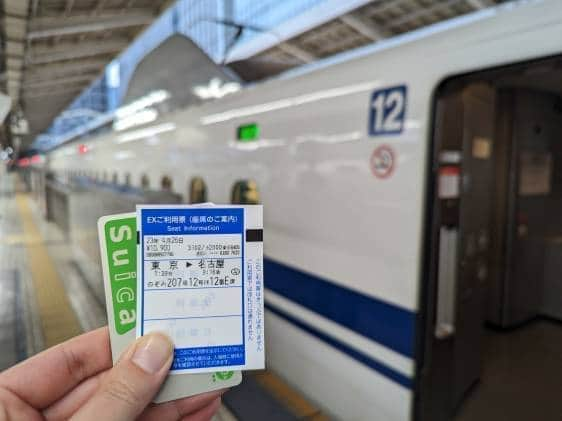
How and Where to Buy Shinkansen Tickets

Tokyo Sumo Guide: When and Where to Experience Sumo Wrestling

Top Japanese Phrases You Need Before Traveling to Japan

Tokyo's Best Airport: Flying into Narita vs. Haneda

A Guide to ALL Pokemon Centers in Tokyo, Japan
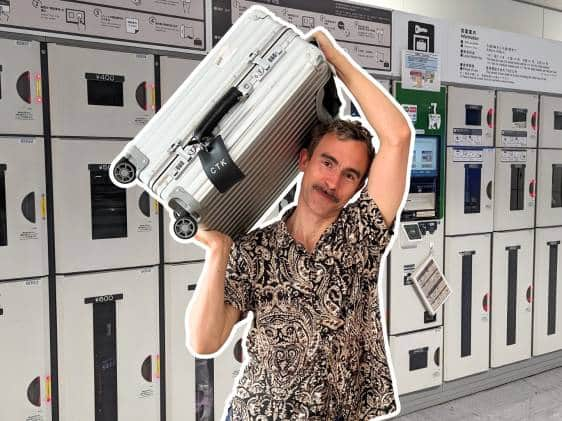
Luggage Storage In Tokyo
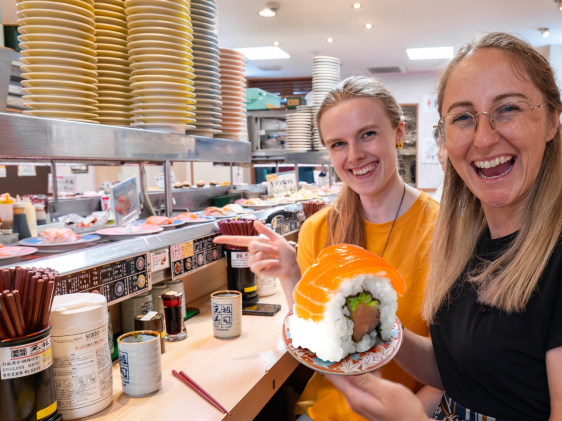
Best Budget Sushi Restaurants in Tokyo

English-Speaking Hospitals in Tokyo — And How To Visit Them
Absolutely everything you need to know about seeing a doctor in Japan.

10 Mistakes First-Timers Make in Japan [With Video]
Read this before your trip.

teamLab Borderless to Return in Early February 2024 [Updated]
One of Tokyo's major attractions has announced its return.

What's New For Summer in Japan
Got summer plans? We've got the best of what's new for summer 2023, what's on for a limited time, and what to see before time runs out (or prices go up).

Japan Inflation Watch: Theme Park Edition
We're sad to report it's not just the Japan Rail Pass. Price increases are coming to Tokyo Disney, USJ, and more.

Taylor Swift comes to Tokyo in 2024
The pre-sale lottery for The Eras Tour at Tokyo Dome is open now until July 10. If you hope to get tickets for February 2024, don't miss out.
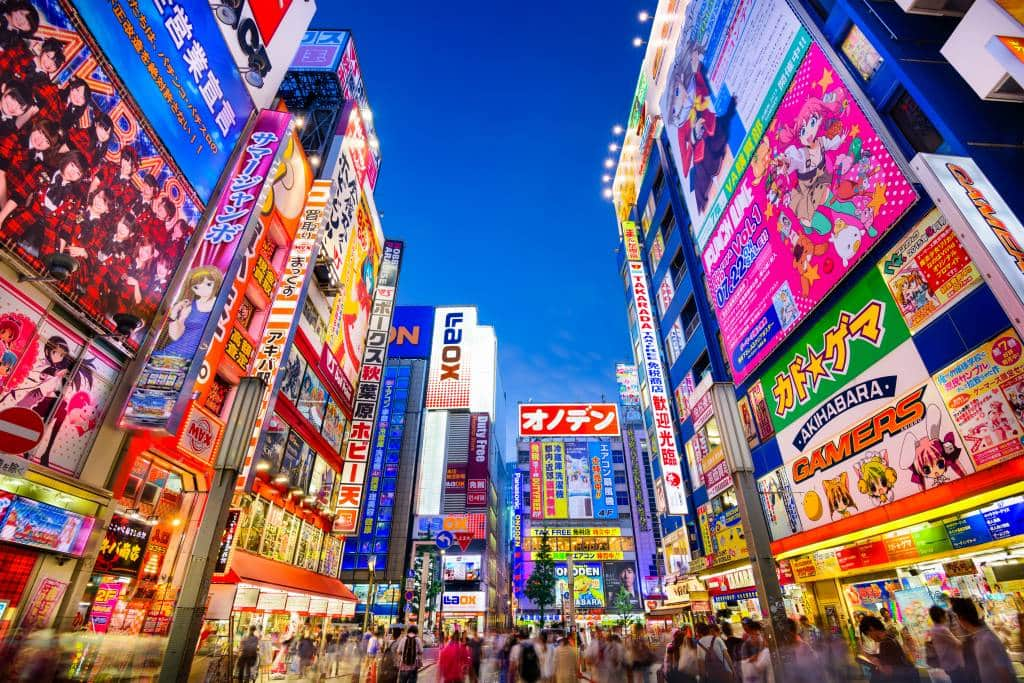
Our Latest YouTube: Guide To Akihabara
Akihabara is famous for being the anime and electronic capital of Tokyo, not to mention maid cafes and game centers...

The Robot Restaurant is Back!
Inside scoop: Everything about the Robot Restaurant reopening—including prices, how to get tickets, what's new, and our first impressions.

Huge Price Rise Announced for Japan Rail Pass from October 2023
The famously great deal is set to get less great. Here's everything we know so far.

Guide to Arriving in Japan
What you need to know for before and after your arrival in Japan.

Last Chance! Tokyo Attractions Closing in 2023
Time is running out to visit these Tokyo attractions!

Close without accepting

Search Smartraveller

Latest update
Exercise normal safety precautions in Japan.
Higher levels apply in some areas.
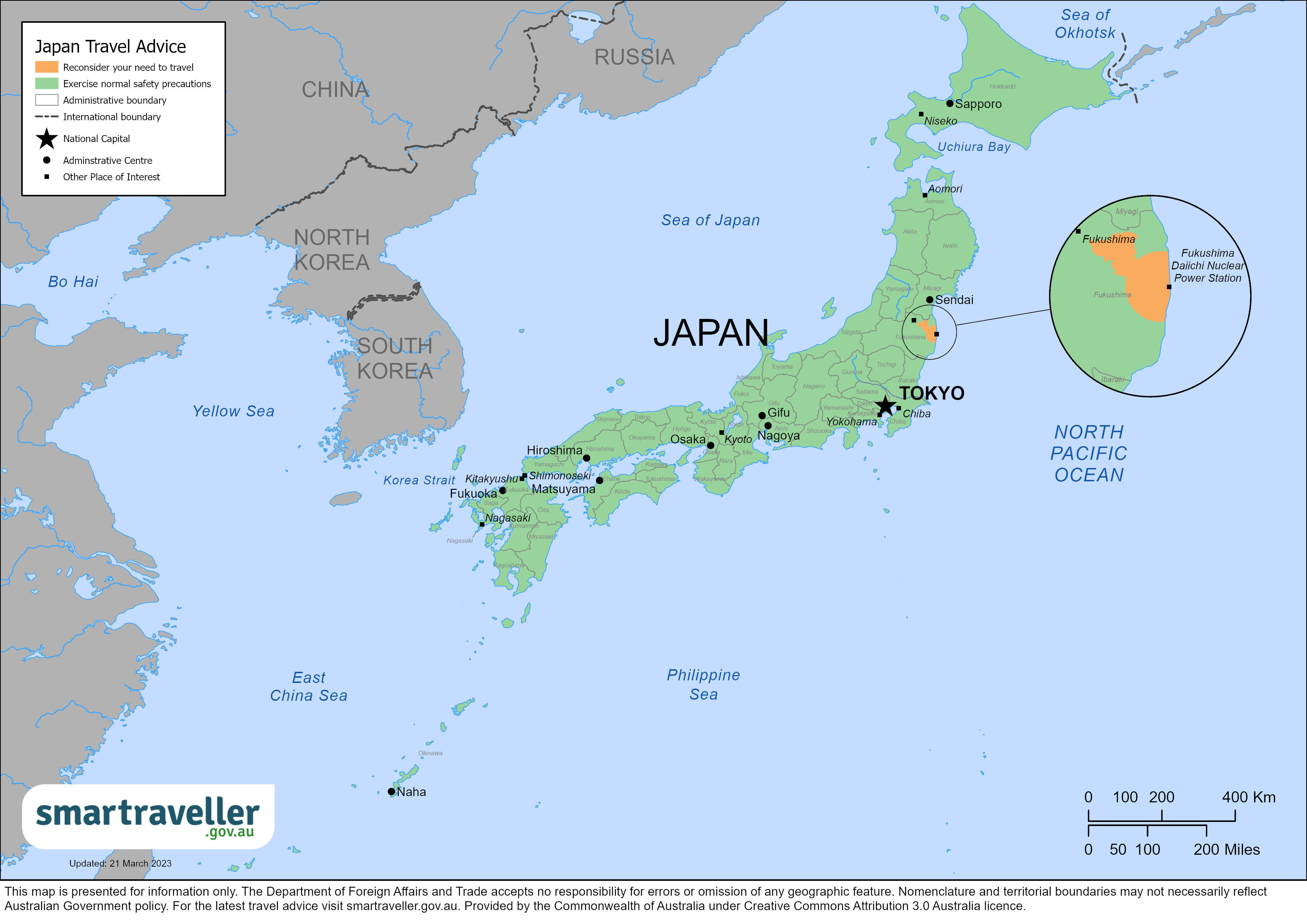
Japan (PDF 460.84 KB)
Asia (PDF 2.21 MB)
Local emergency contacts
Fire and rescue services, medical emergencies.
Call 110 or contact the local police at the nearest police station.
For Tokyo English-speaking Police, call 3501 0110 (Monday to Friday 8:30am to 5:15pm).
Advice levels
Reconsider your need to travel to the restricted areas near the Fukushima Dai-ichi nuclear power plant.
- Japan is prone to earthquakes and tsunamis. Japanese authorities have detailed plans to respond to natural disasters. In an earthquake, follow the advice of local authorities and emergency signage. Move to higher ground immediately if you're in a coastal region after a major earthquake. Check the Disaster Prevention Portal for more information.
- All major disaster warnings are published by the Japan Meteorological Agency . We recommend downloading NHK’s smart phone application to keep up to date with a natural disaster or other emergency alerts.
- A series of earthquakes occurred in Ishikawa Prefecture in Central Japan on and after 1 January 2024. Some infrastructure may remain impacted. Follow the advice of local authorities if travelling to affected areas.
- Regional tensions and the security situation, including with North Korea, could worsen with little warning. Tensions, which may affect Japan, could arise because of missile tests by North Korea. For advice see Japan's Civil Protection Portal Site .
- Japan has a low crime rate. Petty theft can happen, like bag snatching at popular tourist attractions. There's a risk of crime in bars and nightclubs. Crimes include overcharging, credit card fraud, forced withdrawal of large amounts of cash at ATMs, drink spiking and assault. Avoid taking large amounts of money and be vigilant in carrying your debit/credit card) when in bars or clubs and at parties.
Full travel advice: Safety
- Japan has strict rules about bringing medicine into the country, including some ingredients in ADHD and cold and flu medication. If you plan on bringing in medication, check if it's legal before you travel. See the Ministry of Health, Labour and Welfare website for more information.
- Restricted zones exist around the Fukushima Dai-ichi nuclear power plant. The 2011 earthquake caused the release of lethal radiation. Radiation levels in most parts of Japan, including Tokyo, are within the normal range.
- Medical facilities are of a high standard. You can find English-speaking medical staff in most major cities. You may need to pay upfront before you're treated.
Full travel advice: Health
- You must carry your passport (or Japanese residency card) with you at all times.
- Don't use or carry illegal drugs. Authorities can charge you if they find trace amounts of illegal drugs in your blood or urine.
- Japanese family law, including divorce and child custody, is very different to Australian law. For example, joint custody of a child after divorce is not a legal option, and there are limits to access for a non-custodial parent. The Family Courts in Japan generally consider that it is in a child's best interests for them to remain in their "usual place of residence". Courts, therefore, usually give sole custody to the parent who has taken care of the child most recently. If you're involved in custody or other family disputes, it is important to seek legal advice about your options both in Japan and in Australia. We have produced some general information about custody, child abduction and parental rights.
- Some employment agents mislead and encourage foreigners to work in Japan without the correct paperwork. If you want to work in Japan, verify the work offered and get the correct visa. Get legal advice before signing a contract.
- Japan has strict alcohol laws. The legal drinking age is 20. It's illegal to drive with any alcohol in your bloodstream. Allowing someone who has been drinking to drive is also illegal. Laws restrict alcohol consumption in specific areas on certain days, such as in Shibuya around Halloween night (31 October) and New Year's Eve. Smoking on the street is illegal in Tokyo and some other cities.
Full travel advice: Local laws
- Australians are eligible for Japan's visa exemption scheme for short-stay tourism and business travel. You don't need a visa to travel to Japan for up to 90 days. Entry and exit conditions can change at short notice. It is your responsibility to verify visa requirements from the nearest embassy or consulate of Japan.
- If you're travelling for any other reason, contact your nearest Japanese embassy or consulate to check if you need a visa, especially if you plan to work in Japan. Penalties may apply if you work in Japan on a tourist visa.
- It's dangerous to climb Mount Fuji from September to June.
- You can drive for up to 1 year with an Australian driver's licence and an International Driving Permit. If you're staying longer, you will need to obtain a local licence. Heavy snowfalls and ice in winter can make driving dangerous. It's illegal to drive with any alcohol in your bloodstream.
Full travel advice: Travel
Local contacts
- The Consular Services Charter details what we can and can't do to help you overseas.
- For consular help, contact the Australian Embassy in Tokyo or the Consulate-General in Osaka .
- To stay up to date with local information, follow the Embassy’s social media accounts
Full travel advice: Local contacts
Full advice
Terrorism is a threat worldwide.
Japan has security measures in place at key facilities, such as:
- public transport
- public event venues
- entry ports
More information:
- Terrorist threats
Regional Threats
Regional tensions and the security situation, including with North Korea, could worsen with little warning. Tensions, which may affect Japan, could arise because of missile tests by North Korea.
The Japanese Government has confirmed an increase in missile launch activity from North Korea towards Japan. At times, 'take shelter' alerts have been issued in some parts of Japan.
To stay safe:
- be alert to developments
- review the Civil Protection Portal Site advice from the Japanese Cabinet Secretariat for National Security Affairs and Crisis Management
- follow the instructions of local authorities
- check NHK World for the latest information
Japan has a low crime rate. Petty theft can happen, like bag snatching at popular tourist attractions from time to time.
There's a risk of crime in bars and nightclubs, especially in the Roppongi and Shinjuku (Kabuki-cho) entertainment areas of Tokyo. Both men and women have been targeted. You may be targeted with:
- overcharging
- fraudulent credit card charges
- forced withdrawal of large amounts of cash at ATMs
- drink spiking
- illegal drugs
You may be served drinks with higher alcohol content than normal. Some victims have woken in unknown places and discovered high credit card charges. Other victims have been taken to ATMs and forced to withdraw a large sum of cash while under the effects of drink spiking.
In these situations, you may find it hard to get a police report for your bank and travel insurer.
- never leave your drink unattended, and be cautious of accepting drinks from strangers or recent acquaintances
- don't take large amounts of cash to parties, bars, clubs or entertainment districts and be vigilant in carrying your debit/credit card
- Partying overseas
Cyber security
You may be at risk of cyber-based threats during overseas travel to any country. Digital identity theft is a growing concern. Your devices and personal data can be compromised, especially if you’re connecting to Wi-Fi, using or connecting to shared or public computers, or to Bluetooth.
Social media can also be risky in destinations where there are social or political tensions, or laws that may seem unreasonable by Australian standards. Travellers have been arrested for things they have said on social media. Don't comment on local or political events on your social media.
More information:
- Cyber security when travelling overseas
Mountain climbing and trekking
Trekking and mountaineering can be dangerous. Register your plans with local police before you go into the mountains, and take an emergency locator beacon with you.
Every year, a number of people die while trying to climb Mount Fuji.
Japanese Emergency Services warn against climbing from September to June when it's most dangerous. Check the official Mount Fuji Climbing website for each trail's climbing season dates.
Check your travel insurance covers you for extreme activities, such as mountain climbing.
Hikers and other travellers may encounter bears in parts of rural Japan. There have been incidents of fatal bear attacks. Some prefectural governments provide safety advice regarding bears.
If you plan to hike or camp in rural and mountainous areas of Japan:
- follow local safety advice and pay attention to
- warning notices
Snow sport safety
Back-country skiing (off-piste) and snowboarding is dangerous in most parts of Japan. You should stay within the boundaries of the ski resort.
Take an emergency locator beacon with you if you plan to explore other areas of the mountains.
Many travellers have suffered serious head injuries they could've prevented by wearing the right equipment.
Check your insurance policy covers you for snow sports.
Local ski resorts govern rules in each ski region. You can be arrested and detained for unruly behaviour.
If you're skiing in Japan:
- use a helmet and protective gear
- learn local rules and get weather updates from your hotel, a local tourism centre or the local ski resort
- obey local ski region rules
- only visit areas that local authorities mark as safe
- know what your travel insurance policy covers you for
Climate and natural disasters
A series of earthquakes occurred in Ishikawa Prefecture in Central Japan on and after 1 January. Some infrastructure may remain impacted. Exercise caution and follow local authorities' advice if travelling to affected areas.
Japan experiences natural disasters and severe weather , including:
- volcanic eruptions
- earthquakes
In an emergency, consular help may be severely limited.
Be prepared to deal with emergencies by:
- maintaining a basic emergency supply kit
- securing your passport in a safe, waterproof place
- follow the advice of local authorities, emergency services and local media updates. Make sure you react to any evacuation orders.
Disaster preparation
The Japan National Tourism Organization provides disaster preparation Safety Tips for visitors to Japan and other useful emergency information.
In any emergency or crisis, it's important to keep in contact with family and friends if possible.
The following stations broadcast emergency information in English:
- US Armed Forces station (810 AM)
- Inter FM (76.1 FM) in Tokyo
Japanese public broadcaster NHK provides a free smartphone app , which can be set to receive emergency notifications in English. This includes earthquake, tsunami, volcanic eruption, typhoon, and missile warnings.
If there's a natural disaster:
- follow local authorities' advice
- react to any evacuation orders
- monitor the media, other local information sources, and the Global Disaster Alert and Coordination System
- keep in contact with family and friends
Earthquakes and tsunamis
There's a constant risk of earthquakes and tsunamis.
The Japan Meteorological Agency provides information in English about earthquakes and tsunamis.
Know the dangers of a major earthquake and the emergency plan information in your area. Know where your local shelter is. This information is available from local or prefectural government offices, such as the Tokyo Metropolitan Government Disaster Prevention .
Local authorities are responsible during a crisis for helping people living or travelling within their jurisdictions.
If there's an earthquake:
- follow the advice of local authorities
- check the Japan Meteorological Agency for earthquake and tsunami information
- move to higher ground straight away if you're in a coastal region
Typhoons and severe weather
The typhoon season is from May to November, with most activity between July and September.
Local authorities broadcast current typhoon information through the local media and the Japan Meteorological Agency website.
If there's a typhoon approaching:
- check the latest typhoon information from the Japan Meteorological Agency’s website
- be alert to landslide risk areas
If there is heavy rain, stay indoors. If necessary, evacuate to a place on the second floor or higher. Find out the location of your nearest evacuation shelter and move there when safe to do so.
Keep away from areas with:
- steep hills at risk of landslides
- flooded streets
Be careful of fallen electrical lines.
Japan has 110 active volcanoes.
The Japan Meteorological Agency has a list of the latest volcano warnings.
If you plan to visit a volcanic area:
- be aware of alert levels, which can change at short notice
Winter weather
Parts of Japan experience heavy snowfalls and extremely low temperatures in winter.
Conditions can change suddenly.
Each year, people are injured or killed in snow-related incidents, including:
- motor vehicle accidents
- ice falling from roofs
- prolonged exposure to extreme cold
- ski accidents
Walking alone or under the effects of alcohol, or straying from marked trails, can be fatal.
Avalanches are common and heavy snowstorms can create deep powder snow drifts.
Travel insurance
Get comprehensive travel insurance before you leave.
Your policy needs to cover all overseas medical costs, including medical evacuation. The Australian Government won't pay for these costs.
If you are travelling while pregnant, confirm that your policy covers both your pregnancy and your baby in the event of a premature birth. Medical services for premature babies can cost over $A 150,000. See the advice for pregnant travellers page for more information.
If you can't afford travel insurance, you can't afford to travel. This applies to everyone, no matter how healthy and fit you are.
If you're not insured, you may have to pay many thousands of dollars up-front for medical care.
- what activities and care your policy covers
- that your insurance covers you for the whole time you'll be away
Physical and mental health
Consider your physical and mental health before you travel, especially if you have an existing medical condition.
See your doctor or travel clinic to:
- have a basic health check-up
- ask if your travel plans may affect your health
- plan any vaccinations you need
Do this at least 8 weeks before you leave.
If you have immediate concerns for your welfare, or the welfare of another Australian, call the 24-hour Consular Emergency Centre on +61 2 6261 3305 or contact your nearest Australian Embassy, High Commission or Consulate to discuss counselling hotlines and services available in your location.
Different environments, unfamiliar customs and language barriers may worsen existing mental health conditions. They may also trigger new issues.
Mental health treatment and services can differ to those in Australia.
If you need counselling services in English while in Japan:
- call TELL Lifeline (+81 3) 5774 0992
- call TELL Counselling (+81 3) 4550 1146
- General health advice
- Healthy holiday tips (HealthDirect Australia)
Not all medication available over the counter or by prescription in Australia is available in other countries. Some may even be considered illegal or a controlled substance, even if prescribed by an Australian doctor.
Japan has strict rules about bringing medication into the country. This affects both medication imports and medication you carry for personal use.
There are 4 categories (PDF 250 KB) of medicine. These are:
- psychotropic
You may need a permit or certificate to take medication into Japan. This will depend on the medication's classification, name and quantity.
Some medication is banned, including:
- the stimulant dexamphetamine, used to treat ADHD
- pseudoephedrine, found in some cold and flu tablets
Authorities could detain you if you're found with them.
For narcotic medications, including codeine, morphine and oxycodone, apply for a Narcotic Certificate. If you don't have this certificate when you enter Japan, authorities may confiscate the medication.
If you plan to bring medication, check if it's legal in Japan. Take enough legal medication for your trip. See the Ministry of Health, Labour and Welfare for more information.
Carry a copy of your prescription and a letter from your doctor stating:
- what the medication is
- your required dosage
- that it's for personal use
- Bringing medication into Japan
Health risks
Restricted areas exist around the Fukushima Dai-ichi nuclear power plant. The 2011 earthquake caused the release of lethal radiation. Radiation levels in almost all parts of Japan, including Tokyo, are within the normal range.
Monitor advice by the Japanese Government . There are ID checks points into the Restricted Areas . Do not enter without permission.
The Australian Radiation Protection and Nuclear Safety Agency (ARPANSA) provides details on radiation in Japan. ARPANSA has assessed the radiation levels in most parts of Japan, including Tokyo, to be within the normal range.
- Ministry of Health, Labour and Welfare
- Ministry of Economy, Trade and Industry
- Nuclear Regulation Authority
Insect-borne diseases
Japanese encephalitis can occur in Japan's rural areas. Get vaccinated against Japanese encephalitis before you travel.
To protect yourself from disease:
- make sure your accommodation is insect-proof
- use insect repellent
- wear long, loose, light-coloured clothing
Measles and rubella
Measles and rubella cases have been reported in Japan in recent years.
Make sure your vaccinations are up to date before you travel.
- Infectious diseases
- Measles immunisation service
- Rubella immunisation service
Medical care
Medical facilities.
Medical facilities are of a high standard. You can find medical facilities with English-speaking staff in most major cities, however, you may have difficulties finding English-speaking medical staff in some parts of Japan.
Medical care in Japan can be expensive. You may need to pay up-front or give a guarantee that you'll cover costs before you're treated.
The Japan National Tourism Organization lists hospitals with English and other foreign language-speaking staff.
There are many hospitals with decompression chambers in areas where diving is popular.
Medical information for Japan
You're subject to all local laws and penalties, including those that may appear harsh by Australian standards. Research local laws before travelling.
If you're arrested or jailed, the Australian Government will do what it can to help you within the scope of our Consular Services Charter , but we can't get you out of trouble or out of jail.
See the Australian Embassy Tokyo website for more information about arrests in Japan.
Be aware that you won't be allowed to make a phone call if you are arrested in Japan. You can also be detained for up to 23 days without any formal charge.
Authorities can arrest and charge you if they find trace amounts of illegal drugs in your blood or urine.
- Carrying or using drugs
- Tokyo Metropolitan Government
Japanese family law, including divorce and child custody, is very different to Australian law. For example, joint custody of a child after divorce is not a legal option, and there are limits to access for a non-custodial parent. The Family Courts in Japan generally consider that it is in a child’s best interests for them to remain in their “usual place of residence”. Courts therefore usually give sole custody to the parent who has taken care of the child most recently.
If you're involved in custody or other family disputes, consult a lawyer before you leave Australia or if you are already in Japan. We have produced some general information about custody, child abduction and parental rights.
Australia and Japan are both parties to The Hague Convention on the Civil Aspects of International Child Abduction.
If you're concerned that your child has been wrongfully removed to or detained in Japan, contact the Attorney-General's Department in Australia.
- Travelling with children
Employment law
Some employment agents may mislead and encourage foreigners to work in Japan without:
- the correct visa
- financial arrangements in place
This could leave you open to exploitation and prosecution.
Authorities have arrested Australians for working in the entertainment industry while in Japan on tourist visas.
If you want to travel to Japan for work:
- check the true nature of the work offered
- get the correct visa before arriving in Japan
- get legal advice before signing any contract
Living or working overseas
Police powers
Police can stop you on the street, demand identification and search you and your belongings.
If you're in a public place, police can seize:
- knives longer than 5.5cm, including blades and penknives
- any other weapons or things you could use as weapons
- any item they reasonably suspect you stole or have unlawfully
If they find any of these items on you, it’s likely that police will detain you.
If you're arrested, police can detain you for up to 23 days without charge, including for offences you might think are minor. Police might hold you for weeks or months while they investigate and undertake legal proceedings.
The initial police interview could last several hours. Police might record it in writing rather than electronically.
Under Japanese law, you can:
- remain silent
- access legal representation
- have an interpreter provided
However, in Japan police can question you without your lawyer present.
English interpreters may be substandard. Get a list of English-speaking lawyers around Japan from the Australian Embassy website.
If you're visiting Japan short-term as a tourist or for business, you must always carry your passport.
If you live in Japan, you must always carry your residence card.
It's illegal to:
- buy or drink alcohol if you're under 20 years old
- drive with any alcohol in your bloodstream
- allow someone under the influence of alcohol to drive a vehicle in which you're a passenger
The following activities are also illegal:
- importing or possessing firearms or other weapons without a permit
- smoking on the streets in some parts of Tokyo and other cities
- using UHF-CB radios (walkie-talkies) that don't meet Japanese standards, such as those purchased outside Japan
- resisting arrest or other actions that obstruct an official's duties
- flying a drone without a permit in many areas of Japan. Strict regulations apply under aviation laws
- having illegal drugs in your body (detected by urine testing).
Penalties for serious crimes, such as murder, include the death penalty.
Other sentences can include:
- heavy fines
- lengthy jail terms with hard labour
- deportation
Australian laws
Some Australian criminal laws still apply when you're overseas. If you break these laws, you may face prosecution in Australia.
- Staying within the law
Dual citizenship
Japan recognises dual nationality until the age of 20, after which the dual national must decide which nationality to retain.
- Dual nationals
Visas and border measures
Every country or territory decides who can enter or leave through its borders. For specific information about the evidence you'll need to enter a foreign destination, check with the nearest embassy, consulate or immigration department of the destination you're entering.
Australians are eligible for Japan's visa exemption scheme for short-stay tourism and business travel.
You don't need a visa if you're visiting for less than 90 days:
- as a tourist
- for a business trip or conference
- to visit friends and family
After entering under the visa exemption scheme, entry status cannot be changed to another visa status without departing and then re-entering Japan with the appropriate visa, such as a spouse, work, or study visa.
See the Embassy of Japan in Australia website for more information (including eligibility and required documents).
See the Ministry for Health, Labour and Welfare and the Ministry of Foreign Affairs websites for full details on entry requirements.
More information
- Immigration Bureau of Japan (Government of Japan)
- Customs and Tariff Bureau of Japan (Government of Japan)
Border measures
If you're transiting through Japan and your onward flight is leaving from a different airport, you must enter Japan. In order to transit between airports you will need to meet the entry requirements detailed above.
Please confirm any questions about transit directly with your airline.
Other formalities
You'll be photographed and fingerprinted electronically when you arrive, even if you're a permanent resident in Japan. If you refuse, immigration officers could deny you entry.
Travellers aged under 16 years, or who hold a diplomatic or official visa, are exempt.
If you'll be staying in Japan long term, you will need to register your details with the Immigration Bureau of Japan before arriving. Once you present the correct landing permission, you'll get a residence card. You must always carry it with you.
Ministry of Internal Affairs and Communication
Some countries won't let you enter unless your passport is valid for 6 months after you plan to leave that country. This can apply even if you're just transiting or stopping over.
Some foreign governments and airlines apply the rule inconsistently. Travellers can receive conflicting advice from different sources.
You can end up stranded if your passport is not valid for more than 6 months.
The Australian Government does not set these rules. Check your passport's expiry date before you travel. If you're not sure it'll be valid for long enough, consider getting a new passport .
Lost or stolen passport
Your passport is a valuable document. It's attractive to people who may try to use your identity to commit crimes.
Some people may try to trick you into giving them your passport. Always keep it in a safe place.
If your passport is lost or stolen, tell the Australian Government as soon as possible:
- in Australia, contact the Australian Passport Information Service .
- if you're overseas, contact the nearest Australian embassy or consulate .
If you lose your passport while travelling in Japan, try retracing your steps. Lost items are often handed into hotels, shop owners, train stations and police boxes.
It's important to look after your passport carefully. Passports that have gone through a washing machine or exposed to heavy rain will likely need to be replaced.
Passport with ‘X’ gender identifier
Although Australian passports comply with international standards for sex and gender, we can’t guarantee that a passport showing 'X' in the sex field will be accepted for entry or transit by another country. Contact the nearest embassy, high commission or consulate of your destination before you arrive at the border to confirm if authorities will accept passports with 'X' gender markers.
More information:
- LGBTQIA+ travellers
The Japanese currency is the Yen (JPY).
No restrictions apply to bringing foreign currency in or out of the country. Declare all amounts more than JPY 1 million or equivalent, when you arrive or leave. This covers all forms of currency, not only cash.
Cash is preferred in most places, but cards are becoming more widely used, especially in major cities.
Hotels accept major credit cards. Credit cards are still not widely accepted outside major cities.
Some ATMs at banks and convenience stores don't accept foreign cards.
Ask your bank if your cards will work in Japan.
Local travel
Check the Japan National Tourism Organization for emergency updates in English. The site also has advice on safe and hassle-free travel in Japan.
Fukushima and surrounding areas
There are some restricted areas around the Fukushima Dai-ichi nuclear power plant. This is due to the 2011 earthquake that resulted in the release of lethal radiation. The Japanese Government specifies these areas.
If you must stay overnight in restricted areas, ask local authorities for advice on how to minimise health risks.
Monitor and follow the advice from local authorities.
- Australian Radiation Protection and Nuclear Safety Agency (ARPANSA)
Travelling in Japan with a Disability
Japan has a number of resources available online with tips and advice on travelling around Japan as a tourist with a disability.
- Japan Travel – Traveling with a disability
- Japan Accessible Tourism Center
- Accessible Travel Japan
- Advice for travellers with a disability
Driving permit
To drive in Japan, you must hold either:
- a valid Japanese driver's licence, or
- a valid International Driving Permit (IDP) and a current Australian driver's licence
After 365 days, you need to get a Japanese licence.
Get your IDP before leaving Australia.
- Driving in Japan
- Tokyo Metropolitan Police Department
Road travel
Roads and vehicles are mostly well-maintained and traffic is orderly.
Vehicles travel is on the left-hand side like in Australia. In Japan it's illegal to drive with any alcohol in your bloodstream.
Heavy snowfalls and ice in the winter can make driving dangerous, especially if you are unaccustomed to driving in these conditions. Ensure your vehicle has the necessary equipment, including snow tyres, chains, and a dig-out kit. More information:
Driving or riding
Motorcycles
Check your travel insurance policy covers you for riding motorbikes.
Always wear a helmet.
It's safe to use taxis in Japan.
Taxi drivers usually open and shut the rear passenger doors remotely.
Public transport
Japan has modern and reliable rail and bus services.
Transport and getting around safely
DFAT doesn't provide information on the safety of individual commercial airlines or flight paths.
Check Japan's air safety profile with the Aviation Safety Network.
Passenger ferries depart from Tokyo (Yokohama) to many destinations across Japan as well as Asia.
Several international cruises stopover in Japan.
- Going on a cruise
Japan National Tourism Organization (JNTO)’s Tourist Information Center accepts telephone enquiries 24 hours a day. Call (+81 3) 3201 3331.
Contact your provider with any complaints about tourist services or products.
You can also contact the National Consumer Affairs Center of Japan’s Consumer Hotline for Tourists. Call (+81 3) 5449 0906 from Monday to Friday 10am to 4pm, excluding national holidays.
Emergencies
Depending on what you need, contact your:
- family and friends
- travel agent
- insurance provider
For Tokyo English-speaking Police, call (+81 3) 3501 0110 (Monday to Friday 8:30am to 5:15pm).
Always get a police report when you report a crime.
If a report is hard to get, seek advice from a lawyer or the English-speaking Police.
Your travel insurer should have a 24-hour emergency number.
Mental health services
Call TELL Lifeline services in English (+81 3) 5774 0992.
Call TELL Counselling services in English (+81 3) 4550 1146.
Living in Japan
English information on living in Japan is available from the:
- Japanese Cabinet Office
- Council of Local Authorities for International Relations
- Tokyo International Communications Committee
In Tokyo, for advice from the Foreign Residents' Advisory Centre , call (+81 3) 5320 7744.
Consular contacts
Read the Consular Services Charter for what the Australian Government can and can't do to help you overseas.
For consular assistance, contact the Australian Embassy in Tokyo or Australian Consulate-General in Osaka .
Australian Embassy, Tokyo
2-1-14 Mita, Minato-ku
Tokyo 108-8361
Phone: (+81 3) 5232 4111
Fax: (+81 3) 5232 4057
Website: japan.embassy.gov.au
Email: [email protected]
Facebook: Australian Embassy Japan
Instagram: @australianinjpn
X: @AustraliaInJPN
Check the Embassy website for details about opening hours and any temporary closures.
Australian Consulate-General, Osaka
16th Floor, Twin 21MID Tower
2-1-61 Shiromi, Chuo-ku
Osaka 540-6116
Phone: (+81 6) 6941 9271 or (+81 6) 6941 9448
Fax: (+81 6) 6920 4543
Website: japan.embassy.gov.au/tkyo/location_osaka.html
24-hour Consular Emergency Centre
In a consular emergency, if you can't contact an embassy, call the 24-hour Consular Emergency Centre on:
- +61 2 6261 3305 from overseas
- 1300 555 135 in Australia

Travelling to Japan?
Sign up to get the latest travel advice updates..
Be the first to know official government advice when travelling.

Solo Travel Japan: What to Do Alone in Tokyo
Posted on Last updated: April 1, 2024
In this solo travel Japan guide, I’m answering all your questions about traveling alone in Japan and, “Is Tokyo safe to visit?” There are many places where it’s safe to travel solo , but not many are accustomed to solo travelers—thankfully, Tokyo is!
This might sound strange, considering Tokyo is immense, with the metropolitan area covering around 2200 square kilometers. It’s also crowded, as 30% of Japan’s population lives in the center, and it’s estimated that 3.5 million pass through Shinjuku Station daily.
While Japan may not feel like the best place to be alone, Hitori culture (“one person” in Japanese) is huge, with restaurants, bars, and hotels all catering brilliantly to solo travelers. Is Japan safe for solo female travelers? Yes—Tokyo especially is incredibly safe and clean to explore.
Did You Get Travel Insurance Yet? The Insurance companies I recommend are Hey Mondo and Safety Wing Hey Mondo is great if you are looking for a great value flexible policy. They offer single-trip cover, annual multi-trip cover, and long-term travel cover. Safety Wing is great value, with monthly coverage starting at $45.08. It’s super easy to use, and it just renews each month. I currently use them as they offer me free cover for my son as part of my policy. Read my full travel insurance post here, where I go into detail about all companies.
Planning a Solo Trip Japan
If you want to try solo traveling Japan , you’ve come to the right place! There are many exciting places to explore alone in Tokyo . Let’s jump into everything to know about planning your solo travel Japan experience to hopefully answer your concerns about “Is Japan safe for solo female travelers?”
Find Your Happy Place
Every neighborhood in Tokyo has a different feel, and finding the ones that suit your personality is critical to having your best trip. If you want to dodge people, see bright lights, stare at a giant roaring Godzilla head, or drink in a bar so small you can touch both walls at once, Shinjuku is your place.
For shopping or people spotting, the crowded streets of Shibuya and Harajuku are full of fashion and Insta-friendly food trends, while hipster Shimokitazawa is where to stop for street art, vintage stores, and smoky jazz bars.
For a change of pace, Yanaka offers a touch of older Tokyo with a more traditional shopping street full of cats. Akihabara , Ikebukuro , and Nakano embrace all things anime and cosplay, while Asakusa offers temples and old izakaya bars. And that’s just the main touristy area—you could spend days exploring each area’s shops, restaurants, and side streets.
Quick Tip: Book accommodation, tours, and transport ahead of time online to save money and stress. Best Tokyo Tours : Click here to check out the top Tokyo tours Best Tokyo Accommodation: Click here to check out the best accommodation in Tokyo Best Tokyo Transport: Click here to book a bus, ferry, or train in Tokyo
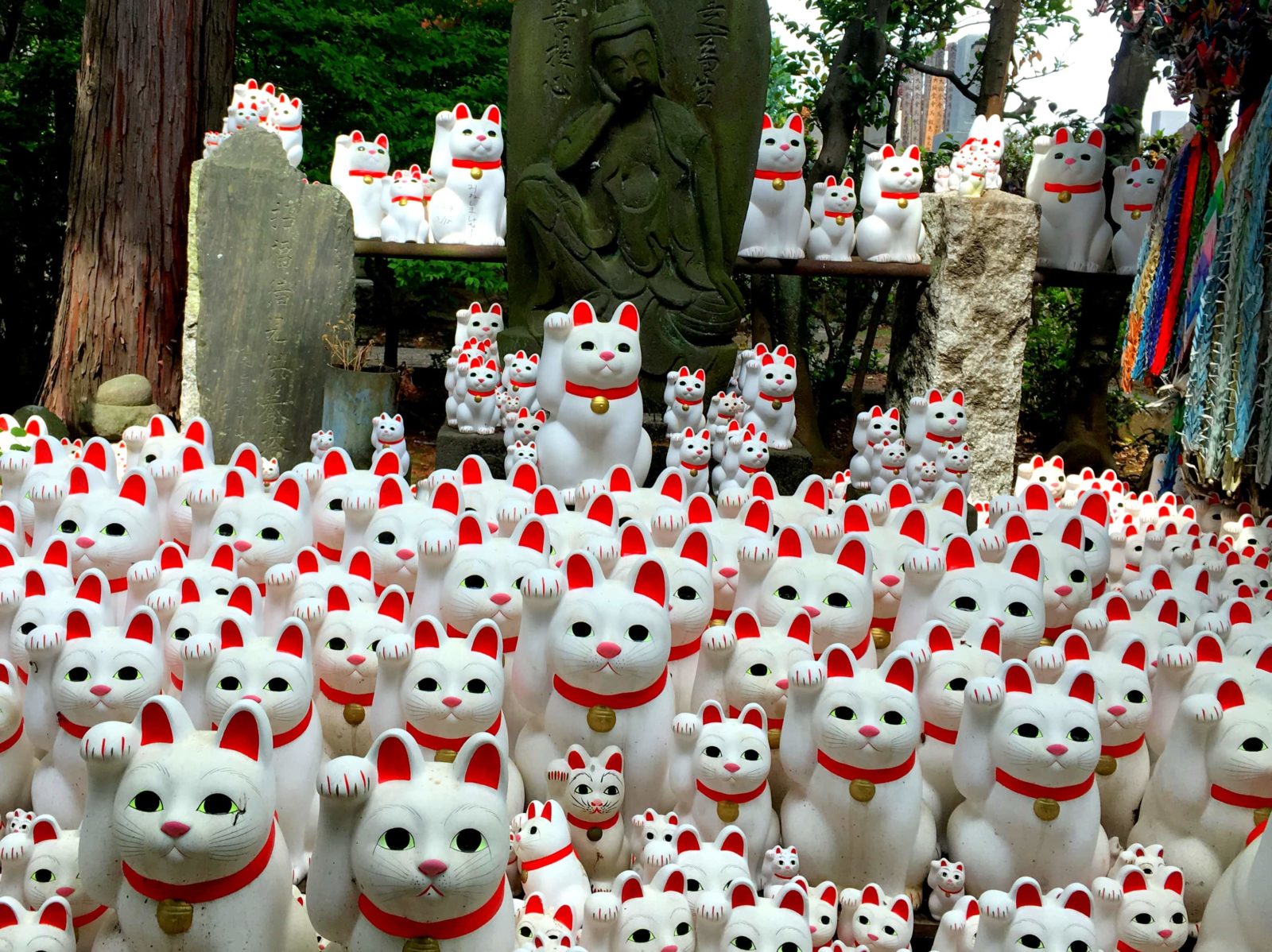
Seek Out a Shrine
Tokyo has hundreds of shrines—top picks include Senso-ji in Asakusa , famous for its giant red lantern-covered shopping street, and the Meiji near Harajuku , where you might spot a Japanese wedding.
Five times daily at Fukagawo Fudo-do, you can experience the flames and hypnotic drumming of a Goma fire ritual or jump on the train to Gotokuji with its thousands of waving cats. Go here in the morning to beat the crowds, as the area containing the cats is very small.
Immerse Yourself in teamLab Borderless
This digital art museum is one of the most popular things to do alone in Tokyo. It consists of immersive light installations that must be seen to be believed. Going solo might not lead to the best selfies (you can’t use tripods or selfie sticks), so enjoy the moment. This is one of the more unique things to do while solo traveling Japan. However, it gets busy, so go in the morning or evening when the crowds die down.
Eat Your Way Around the Tsukiji Outer Market
While the original fish market is no longer there, the Tsukiji Outer Market remains and is lined with stalls selling some of Tokyo’s finest street food. Exploring here is probably my favorite thing to do when I solo travel Japan. Take one of the many local food tours to find the best stalls.
Get Naked With Strangers (It’s Not What You Think)
Onsens are baths full of hot, mineral-infused waters and are the perfect place to soak away your sightseeing aches. However, you have to enter the onsen completely naked (the baths are segregated by gender), which might be uncomfortable for some. However, this can be a great thing to do alone in Tokyo since you’ll probably never see your fellow bathers again.
Oedo Onsen Monogatari in Odaiba is the most foreigner-friendly Tokyo onsen, but brush up on bath etiquette before you go. You must shower and wash your hair before entering the water, and you won’t be allowed in if you have apparent tattoos.
How Safe is Tokyo After Dark?
Tokyo is safe to explore at night, and dining is an ideal solo experience. No one will look at you strangely when you walk in as a party of one. The famous ramen chain Ichiran has partitions between each seat, so solo diners can enjoy more privacy. No one can tell who you’re with when you watch the dishes revolve at a sushi train (often called Kaiten sushi or sushi-go-round). At Genki in Shibuya , you order by screen, and the food is delivered on a tiny replica bullet train.
Walking into a bar, though, could be a different story—you’ll generally be welcomed, but you may feel lonely amidst the social atmosphere. Cue the Magical Trip Bar Hopping Tour ! These are run all over the city and allow you to meet with a local guide and other travelers to visit a handful of local bars for drinks and snacks.
This isn’t a “shots ’til you drop” kind of tour. Instead, you’ll learn about Japanese food and culture while visiting bars that might not be as fun on your own. I took the Shinjuku tour, which started in the tiny Memory Lane Alley.
Even if you’re not usually a tour person, you might want to try one while solo traveling Japan. People are friendly and may speak English, but you’ll often go days without a full-blown conversation. A tour allows you to chat, so I usually book two or three during a week alone in Tokyo.
Solo Trip Japan: Traveling From the Airport to Tokyo
Tokyo has two airports, and Haneda is the closest to town. If you fly into Haneda, you can take the train or monorail lines to stations in the city (Shinagawa and Hamamatsucho, respectively) in less than 15 minutes. There’s also the Limousine Bus , which takes about an hour to reach Tokyo Station but drops off at many hotels, so it may take you closer to your accommodation. It also runs all night if you have an early or late flight.
Narita is Tokyo’s second airport and further away from town. Two trains offer the best option for getting into the center—the Narita Express takes you to the Tokyo, Shibuya, and Shinjuku Stations in 60 to 90 minutes, while the Keisei Skyliner arrives at Ueno and takes around 40 minutes.
Suppose I’m flying into Narita after 7:00 p.m.. In that case, I usually stay the night at an airport hotel since it’s usually a long, exhausting travel day, and airport hotels can be cheaper than downtown options. Hotel Nikko is my top choice—the rooms are small but perfect for one.
Getting Around Tokyo
Tokyo has an extensive railway system to go anywhere in the city—a single journey costs 260 to 320 yen. Get a Pasmo or Suica card to transfer around the different rail networks without buying individual tickets. If you return the card at the end of your trip, you’ll get back a credit of 500 yen. You can also try one of the 24 to 72-hour unlimited metro cards available to tourists, saving you a lot of money. Taxis are another safe option, but they can be expensive.
Tokyo Accommodations
Japanese hotel rooms and the beds within them can be tiny—with one occupant, they feel cozy. If I’m solo traveling Japan, I have more choices of where to stay than when I’m traveling with my partner. If you’re traveling with family, research the best family hotels in Tokyo, as these recommendations are intended for solo travelers .
One of the best places to stay during your first time alone in Japan is Shinjuku, as it’s great for public transportation and full of delivery options if you’re tired. I usually am because I walk 15 to 20 kilometers daily in Tokyo! The Shinjuku Gracery is in a great location.
For more space, check out the Citadines Shinjuku —it’s further from the central station but surrounded by a cute local neighborhood with bars and restaurants welcoming solo diners. The ramen at Shaka was some of the best I’ve ever had. If you’re nervous about eating alone, most apartments have kitchens.
A cheaper option is Book and Bed , which describes itself as an “accommodation bookshop,” combining library-inspired decor with small individual sleep spaces. It’s the perfect opportunity to meet other travelers! Other good areas with lots to offer travelers include Asakusa and Shibuya.
Is Tokyo Safe to Visit?
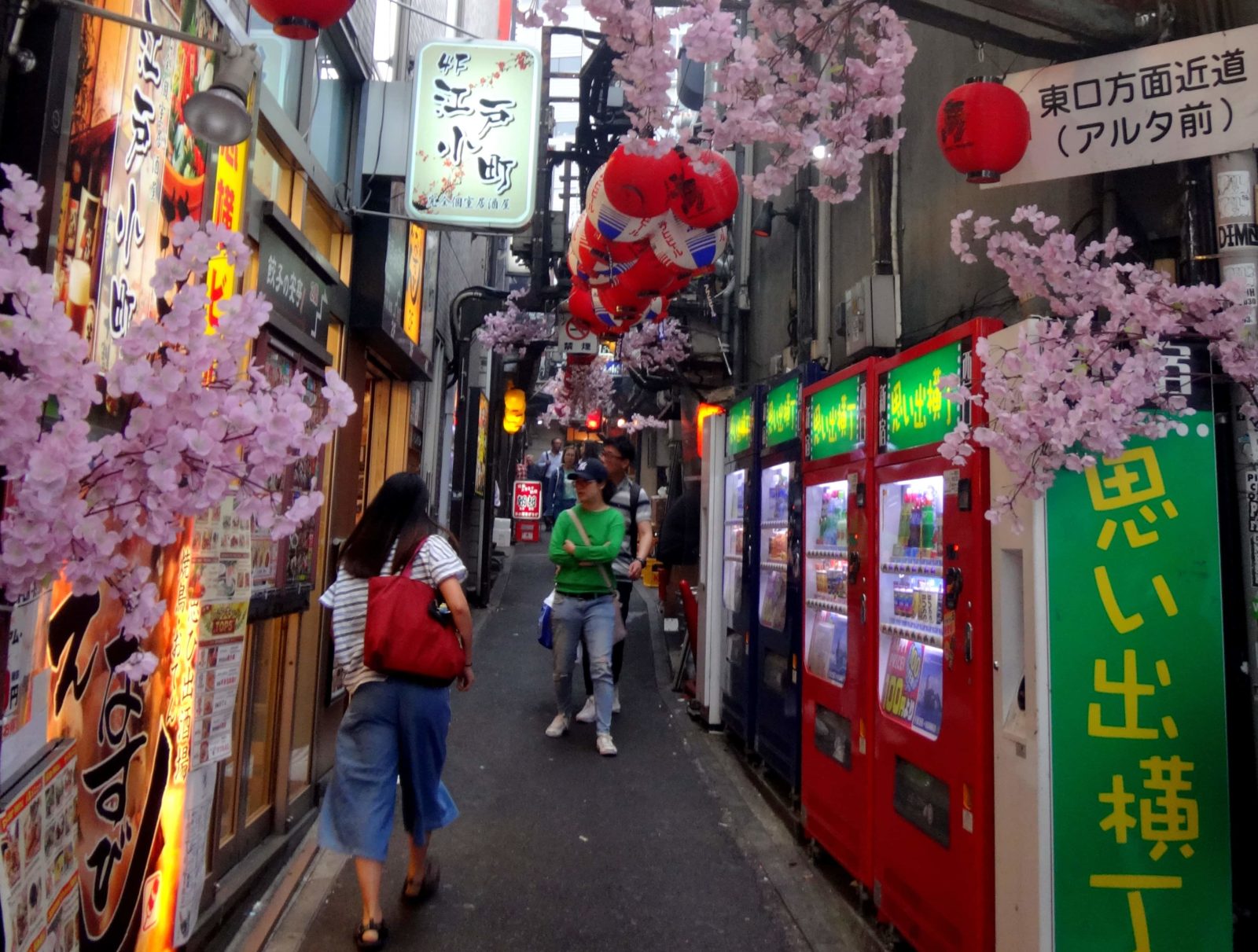
So, how safe is Tokyo to visit alone? Generally, the city is safe, and I feel unsafe walking around at night in only a few areas. Always keep your wits about you—if you feel worried, look for the local Koban (police box), and they will help you.
There’s a red-light district in Shinjuku, but the “entertainment” is kept under wraps. Be more cautious in Roppongi, where tourists are more frequently targeted.
Also, Japan has a reputation for gropers, particularly on crowded trains. It’s said they rarely pick on foreigners, but trains offer female-only carriages at certain times to avoid the risk altogether. Look for the pink “Women Only” signs on the platform edge to determine where they’ll stop.
Tokyo Travel Guide Planning
🚗 Where can I book bus or private transportation ?
I recommend Bookaway or 12goAsia . You can find lots of different transportation available in all over Asia .
🎫 Where can I buy tickets for museums, attractions, and tours?
I recommend either Viator or GetYour Guide . They have a lot of options!
👩⚕️ What is the best insurance to have while traveling?
I recommend using Heymondo for a great value policy. The app also offers you 24/7 Dr Chat. For Digital Nomads check out SafetyWing digital nomad insurance.
I have also written a blog post covering all my recommended travel insurance here
✈️ Any flight recommendations?
WayAWay offers you cheap flights with cashback. You can use this code CLAIRE22 to get 10% off. Otherwise Skyscanner or Expedia are my go-to flight searching platforms.
📱What do you use for internet connection while traveling?
I’m a big fan of personal WiFi devices and they have saved my ass so many times when traveling. I wrote a full review of the top travel WiFi devices you can read here . I personally use GlocalMe as I can either pop in a physical sim card or use their local carrier.
With regards to my phone connection, I use e-sims while traveling, so rather than having to swap out my regular sim card I can download the app and buy a virtual sim card. I recommend using either Airhub or Alosim . Both have great coverage of multiple countries and are very easy to use.
🛏️ What is the best platform to use for booking accommodation?
The 3 best platforms that I normally use are Booking.com , Hotels.com , and Expedia They offer great deals and multiple options. I always check all three to be sure of the best deals.
🛅 Do you have any luggage recommendations for traveling?
I do have a complete list of the best packing and luggage products that I recommend, you can check the list here . I’m currently traveling with this suitcase and this backpack.
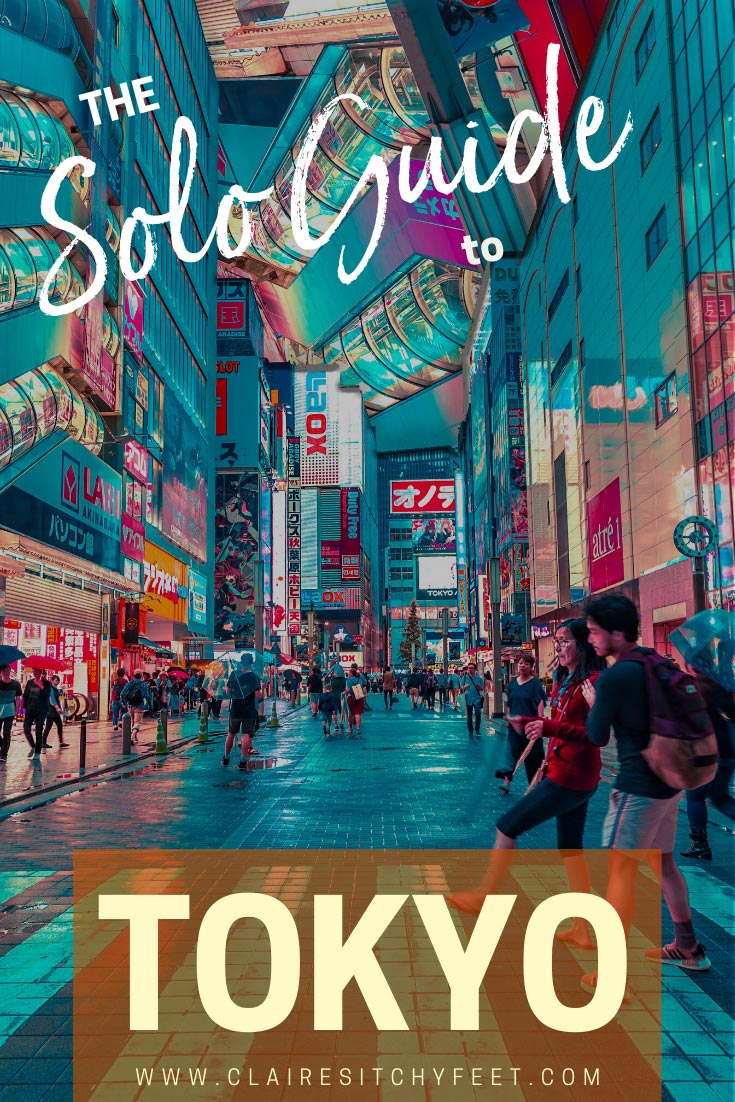
Solo Travel Japan: Final Thoughts
The only downside of traveling to Tokyo, solo or otherwise, is that you can’t see it all in one trip! If you’re like me, you’ll get hooked—take it from someone about to return for trip number six!

Author Bio: Helen Foster from Destination>Differentville is a bit Japan-obsessed—as if the whole “six visits” thing didn’t give that away. Her blog focuses on the quirkier sights in a destination. She knows the answer if you want to know where to meet a robot in Tokyo or drink with a monk in Kyoto.

Claire Summers
Hi I’m Claire!
At 34 I sold all my worldly possessions that wouldn’t fit into 3 boxes or my backpack and hit the road.
I started Claire’s Itchy Feet to inspire women to pack their bags and travel more. With no plans to stop anytime soon I’m always looking for my next adventure be it attempting to surf or climbing a volcano I’ll try (almost) anything once!
© 2023 Claire’s Itchy Feet
- Media & Industry
- Meetings & Events
- Select Language 简体中文 繁體中文(香港) 繁體中文(臺灣) India (English) Bahasa Indonesia 한국어 ภาษาไทย Tiếng Việt Singapore (English) Philippines (English) Malaysia (English) Australia/New Zealand (English) Français Deutsch Italiano Español United Kingdom (English) Nordic countries(English) Canada (English) Canada (Français) United States (English) Mexico (español) Português العربية Japan(日本語) Global (English)
- India (English)
- Bahasa Indonesia
- Singapore (English)
- Philippines (English)
- Malaysia (English)
- Australia/New Zealand (English)
- United Kingdom (English)
- Nordic countries(English)
- Canada (English)
- Canada (Français)
- United States (English)
- Mexico (español)
- Global (English)
- Fujiyoshida
- Shimonoseki
- Ishigaki Island
- Miyako Island
- Kerama Island
- Tokyo Island
- Koka & Shigaraki
- Hida Takayama
- Ginza, Nihonbashi
- Beppu & Yufuin (Onsen)
- Ginzan Onsen
- Nagasaki Islands

- Kumano Kodo
- Shikoku Karst
- Amami Oshima
- Hachimantai
- Omihachiman
- Aizuwakamatsu

- Diving in Japan
- Skiing in Japan
- Seasonal Flowers in Japan
- Sustainable Outdoors
- Off the Beaten Track in Japan
- Scenic Spots
- World Heritage
- Home Stays & Farm Stays

- Japanese Gardens
- Japanese Crafts
- Temple Stays
- Heritage Stays
- Festivals and Events
- Theater in Japan
- Japanese Tea Ceremony
- Cultural Experiences in Japan
- Culture in Japan

- Local Cuisine Eastern Japan
- Local Cuisine Western Japan
- Local Street Food
- Japan's Local Ekiben
- Japanese Whisky
- Vegetarian and Vegan Guide
- Sushi in Japan Guide
- Japanese Sake Breweries

- Art Museums
- Architecture
- Performing Arts
- Art Festivals
- Japanese Anime and Comics
- Japanese Ceramics
- Local Crafts

- Scenic Night Views
- Natural Wonders
- Theme Parks
- Samurai & Ninja
- Iconic Architecture

- Wellness Travel in Japan
- Japanese Ryokan Guide
- A Guide to Stargazing in Japan
- Relaxation in Japan
- Forest Bathing (Shinrin-yoku)

- Experiences in Japan
- Enjoy my Japan
- National Parks
- Japan's Local Treasures
- Japan Heritage
- Snow Like No Other
- Wonder Around Japan

- Visa Information
- Getting to Japan
- Airport Access
- COVID-19: Practical Information for Traveling to Japan
- Anime Tourism
- Countryside Stays
- Accessible Tourism
- Hokkaido Great Outdoors
- Scenic World Heritage in Tohoku
- Shikoku’s Nature and Traditions
- Southern Kyushu by Rail

- Traveling by Rail
- How to Travel by Train and Bus
- JR Rail Passes
- Scenic Railways
- Renting a Car
- Sustainable Travel in Japan
- Travel Brochures
- Useful Apps
- Online Reservation Sites
- Eco-friendly Accommodation
- Luxury Accommodations
- Traveling With a Disability
- Hands-free Travel
- How to Book a Certified Tour Guide
- Volunteer Guides
- Tourist Information Center

- Japanese Manners
- Spring in Japan
- Summer in Japan
- Autumn in Japan
- Winter in Japan
- Cherry Blossom Forecast
- Autumn Leaves Forecast

- Japan Visitor Hotline
- Travel Insurance in Japan
- Japan Safe Travel Information
- Accessibility in Japan
- Vegetarian Guide
- Muslim Travelers
- Safety Tips

- JAPAN Monthly Web Magazine
- Arts & Cultures
- Nature & Outdoor
- Festivals & Events
- Insider Blog
- Things to do
- Local Guides
- Food & drink
- Traditional
- Hokuriku Shinetsu

My Favorites
${v.desc | trunc(25)}
Planning a Trip to Japan?
Share your travel photos with us by hashtagging your images with #visitjapanjp
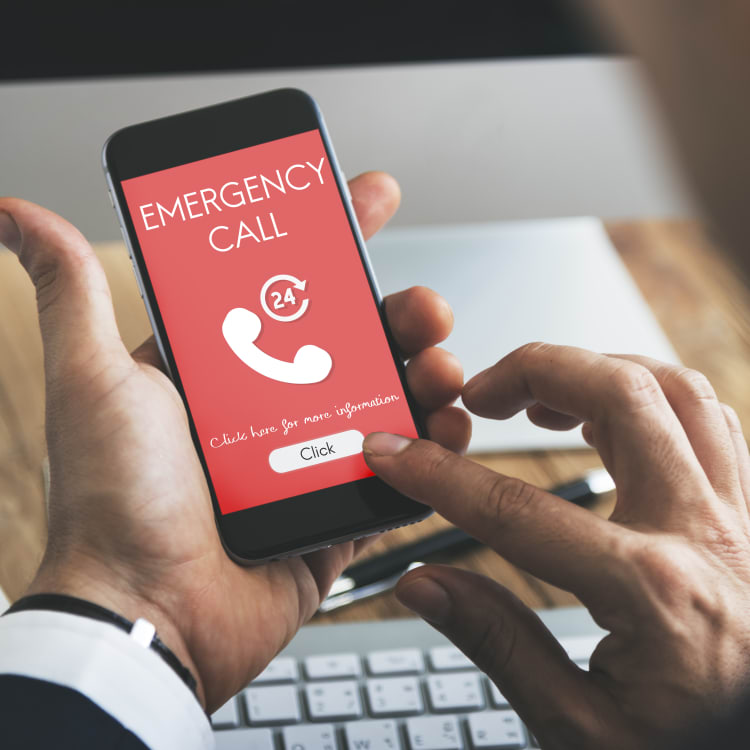
- Staying Safe in Japan
- Helping You Plan
What to do in an emergency
While Japan sits at the top of many general safety rankings, travelers to the country still need to be aware of potential dangers and how best to react to them. Japan is prone to natural disasters such as typhoons, earthquakes, tsunamis and volcanic eruptions. While most are small in scale, it's important to be prepared.
Is Japan safe?
In short, Japan is very safe and the crime rate is quite low. Like any other destination, though, travelers should be aware of their surroundings and know what to do in case something does happen.
There is always a possibility, however unlikely, that you might fall victim to a form of petty crime during your stay in Japan. If you need help, head to a local koban—the small police boxes dotted throughout Japanese neighborhoods. If you don't know where one is, just ask. If you should find yourself without your credit cards, airline tickets or passports due to theft, contact the issuers to arrange for replacements. Keep a list of relevant numbers.
If you need to have your passport reissued or receive an insurance payment due to theft, loss, traffic or other incident, a police report will be required. A local police station can create this for you. Visit your nearest koban, and if you are staying at a hotel, ask the front desk to give you a hand.
Earthquakes in Japan
Although they should not deter you from visiting Japan, natural disasters such as earthquakes do occur. Compared to other countries, earthquakes are common in Japan, so it's best to be prepared.
Earthquakes can occur at any time and strike with little or no warning. Japan's location on shifting tectonic plates means that the country is almost always shaking—it's just that many of the quakes go unnoticed. If you are inside during a larger earthquake, remember to stay calm and follow any instructions staff might give. When you check into a hotel, double-check where the evacuation routes are so you know where to go in an emergency. Fire is the most dangerous secondary disaster, so extinguish any naked flames as quickly as possible during an earthquake. Make sure to keep your phone and devices fully charged. These can be indispensable in the event of any emergency. If you are by the coast when a large earthquake strikes, head for higher ground in case of a tsunami.
If you encounter a significant natural disaster like a typhoon, earthquake, tsunami, or volcanic eruption while in Japan, you can use the following websites and apps for information:
Useful phone numbers
Travel insurance, did this information help you.
out of found this information helpful.
Thank you for your feedback.
Recommended for you.

Please Choose Your Language
Browse the JNTO site in one of multiple languages

IMAGES
VIDEO
COMMENTS
Is it safe to travel to Tokyo following the earthquake? Tokyo is 300km from the west coast, which is where the earthquake struck, though it's been reported that buildings in the capital still ...
The Tokyo Metropolitan Government has a Disaster Prevention Information website with information on how to respond to a natural disaster in the area. More information can be found on our website. Visas to Japan and Immigration Information. Visas for U.S. citizens hoping to travel, study or work in Japan are controlled by the Japanese government.
Read the country information page for additional information on travel to Japan. If you decide to travel to Japan: Enroll in the Smart Traveler Enrollment Program (STEP) to receive Alerts and make it easier to locate you in an emergency. Follow the Department of State on Facebook and Twitter. Follow Embassy Tokyo's American Citizen Services ...
Steer clear of drugs - even smoking weed is (very) illegal in Japan and can carry a prison sentence. Tokyo can get SUPER hot - during the summer months, temperatures can soar in the center of the city. Keep yourself safe and limit your time outside in the middle of the day. Stay hydrated and wear your bloody sunscreen!
Japan's bustling capital Tokyo is once again a safe destination for travelers. On October 11, 2022, the country re-opened its borders for travel for both vaccinated and unvaccinated visitors. Vaccinated travelers are asked to submit a questionnaire and proof of a COVID-19 vaccination (3 doses). Unvaccinated visitors must take a COVID-19 test ...
A visit to Tokyo begins of a life long love of Japan. I went as a kid and when I finally got to return 40 years later I was stunned to see how much it had shaped my life. My husband fell in love the day we arrived. From the gracious people to the egg salad sandwiches at 7 Eleven, Japan should be at the top of your bucket list.
Tourists from all countries or regions can visit Japan on a package tour (including non-guided package tour). Learn about the current situation, checklist for tourists, entry restrictions and safety measures before you travel.
Photo: Sean Pavone/Dreamstime Shibuya Scramble Crossing Tokyo ranked one of the top ten safest cities in the world for travel in 2023. Female travellers rated Tokyo at No 1 in terms of safety in ...
The good news for all lovers of Tokyo and Japan is that Tokyo is very safe to visit! The crime rate is very low, especially considering how big the city is. Although there is some petty crime and some alcohol-related crime, with the right precautions, you will only have positive memories from your trip.
Yes, Japan is safe. According to the 2023 Global Peace Index, Japan is the 9th safest country globally. If we focus on specific cities, Tokyo, Japan's capital, was rated the 5th safest city in the world by the Economist —beating London, Barcelona, Amsterdam, and New York!
Japan travel restrictions have been eased but travelers are asked to follow guidelines with regard to masks, social distancing, dining etiquette, and more. As of April 2023, a proof of vaccination or a negative Covid-19 test are no longer required for all travelers arriving in Japan.
The best times to visit Tokyo are in spring (March to May) to enjoy the best scenery of cherry blossoms and in autumn (September to November) to appreciate the charming colorful foliage. August is the hottest month in Tokyo with an average daily high of about 31°C (88°F). The coldest month is January, with an average daily high of 10°C (50°F).
Is Tokyo safe to travel alone. For solo female travelers, Tokyo is safe, but keep in mind that gender equality in Japan is relatively low. The Bounce Women Travel Safety Index has given Japan a rating of 10 on the list of travel-safe countries for solo women travelers.. The rail system in Tokyo even has women-only carriages during rush hour.
People all around the globe have an image of Japan being safe. Indeed, the Global Peace Index (a ranking determined by domestic crime and conflict, war, military budget, and so on) sees Japan on rank 10, a number that leaves no doubt about Japan being safe and peaceful. However, it is also an unpleasant truth that heinous crimes such as murder and theft have become more noticeable. In the ...
-Register relevant information and get QR codes on Visit Japan Web for smooth entry into Japan. QR codes are generated after the registration. *Immigration and Customs procedures on Visit Japan Web are available at 7 major airports (Tokyo/Narita, Tokyo/Haneda, Kansai, Chubu, Fukuoka, New Chitose, Naha). About Visit Japan Web
Absolutely, Japan is safe to visit - without a doubt. And, naturally, a whole LOAD of people enjoy their majestic safe travels to Japan. There were over 28 million visitors to Japan each year. For 99.9% of all statistical normies, Japan is safe. When we talk about anything outside of 'acts of God', Japan is ridiculously safe to visit.
JNTO operates a visitor hotline 24 hours a day, 365 days a year. Call for tourist information or assistance in the case of accidents and emergencies including COVID-19. Support is available in English, Chinese and Korean. From Japan 050-3816-2787. From Overseas +81-50-3816-2787.
Japan is a fascinating destination that offers a rich culture, natural beauty and modern attractions. Before you travel, consult the Travel Advice and Advisories from the Government of Canada for Japan to learn about the safety, entry and exit requirements, health, laws and culture, and natural disasters and climate of this country.
In most of Japan, you will be completely safe from scams. However, there are areas in which visitors run a higher risk of being scammed such as Roppongi and Kabuki-cho. According to the U.S. State Department, drink spiking in these neighborhoods has led to robbery, physical and sexual assaults, and credit card fraud.
Radiation levels in almost all parts of Japan, including Tokyo, are within the normal range. Monitor advice by the Japanese Government. There are ID checks points into the Restricted Areas. Do not enter without permission. ... The site also has advice on safe and hassle-free travel in Japan. Fukushima and surrounding areas.
For Travelers. Information in case of illness or injury. Official announcements from the Government of Japan. Answers to your questions about traveling to Japan and staying safe during COVID-19, including where to get help if you need it.
In this solo travel Japan guide, I'm answering all your questions about traveling alone in Japan and, "Is Tokyo safe to visit?" There are many places where it's safe to travel solo, but not many are accustomed to solo travelers—thankfully, Tokyo is!. This might sound strange, considering Tokyo is immense, with the metropolitan area covering around 2200 square kilometers.
The JNTO Tourist Information Center in Tokyo is a phone call away at 03-3201-3331, every day 9 a.m. to 5 p.m. Tourist Information Centers (TIC) also has two locations at Narita International Airport , and one at Kansai International Airport in Osaka . Japan Tourism Agency's " Guide for when you are feeling ill " provides medical institutions ...